
Dynamics

|
Generational Dynamics |
| Forecasting America's Destiny ... and the World's | |
| HOME WEB LOG COUNTRY WIKI COMMENT FORUM DOWNLOADS ABOUT | |
Contrasting the Iraq and Afghanistan wars
At least sixteen people including eight attackers have been killed while eight others sustained injuries when heavily armed assailants stormed Intercontinental Hotel Kabul, Tuesday night, according to the Wakht News Agency (Kabul). The clash between the attackers and the security officials continued for five hours, and left a major part of the hotel damaged.
 |
The Taliban claimed responsibility for the highly coordinated attack on the landmark Intercontinental Hotel in an apparent attempt to show they are still able to carry out such assaults - despite months of heavy attacks by NATO and Afghan forces, according to the article.
Afghanistan's Interior Ministry spokesman said that the attackers were from the Haqqani network, and came into Afghanistan from Pakistan, according to CNN.
Ironically, at the time of the attack, the hotel contained senior afghan officials discussing plans for the security handover from the American-led coalition to the Afghans, and plans go ahead for an American withdrawal. Many people are questioning whether a security handover is possible.
I've been writing about the Afghan war for years, and the best way to understand what's going on is to contrast the Afghan war to the Iraq war:
The rise of the Haqqani network fits this description completely. This is Pashtun terrorist group, based in northwest Pakistan, targeting non-Pashtun targets in Afghanistan. There is absolutely no way that the Haqqani network is going to be ejected, or that the Afghan army will be able to control it.
If, as most people believe, the attack on the Kabul International Hotel was intended by the Haqqani network as a signal that the American withdrawal will lead to more widespread violence, then it looks like they've succeeded.
(Comments: For reader comments, questions and discussion,
see the 30-Jun-11 News -- Terrorist bombing of Kabul hotel shows power of Haqqani network
thread of the Generational Dynamics forum. Comments may be
posted anonymously.)
(30-Jun-2011)
Permanent Link
Receive daily World View columns by e-mail
Donate to Generational Dynamics via PayPal
Britain: Iran is carrying out secret nuclear missile tests
This morning's key headlines from GenerationalDynamics.com.
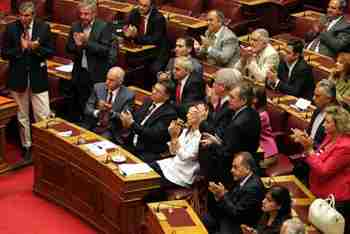 |
Greece's Parliament backed Prime Minister George Papandreou's austerity plan on Wednesday, by a wider than expected margin -- 155 to 138, with five blank ballots and two absences. However, there will be another, and possibly more difficult vote on Thursday on the implementation details of the plan. Finance Minister Evangelos Venizelos said, "We have taken a big step. Tomorrow we will take the second so that I can go on Sunday to see my Eurogroup partners with real proof of the country’s credibility." Kathimerini
Violence escalated in central Athens on Wednesday after the austerity plan passed. Some 500 people were treated for injuries and breathing problems from teargas, and more than 30 protesters were taken to the hospital. Amnesty International accused the police of "excessive force" and overuse of teargas. In the weeks to come, as the harsh austerity measures kick in, and more young people are left unemployed with time on their hands, much more extreme violence is expected. Kathimerini
Hugo Chávez has canceled the inaugural summit of the Community of Latin American and Caribbean States (CELAC), which Chavez was due to co-chair on July 5-6. This is a personal blow for Chavez, who has been one of the driving forces behind CELAC, which aims to counter the influence of the United States in Latin American politics, and which he hopes will further his ambitions as a regional powerbroker. The cancellation deepens the mystery surrounding Chavez's medical condition, as he recovers in a Havana, Cuba, hospital from an operation on a pelvic abscess. Officials released a video of Chavez, in order to prove that he's still alive and not in critical condition, but rumors are spreading that he might have had plastic surgery, or he could be hiding a more serious ailment. AFP
As we reported yesterday, Iran has announced firing of test missiles that can reach U.S. bases and Israel. On Wednesday, Britain's foreign secretary William Hague told the Commons that, since last October, Iran has been carrying out secret tests of missiles that could be used to carry nuclear material. If true, those tests would be in violation of United Nations Security Council resolutions forbidding Iran from developing a military nuclear program. Telegraph
An Irish ship, the MV Saoirse, will not take part in the planned "Freedom Flotilla II" to Gaza because it has been sabotaged, according to a passenger. Divers found that a piece was missing from one of the propeller shafts. “This was the type of sabotage that endangered human life. They put divers under the boat who cut a piece out of the propeller shaft. That means that the damage would have happened gradually and what would have happened eventually is that the propeller would have come up through the bottom of the boat, caused a flood in the engine room and would have caused the boat to sink." Irish Times
France's military has admitted that it air dropped weapons early in June to Libyan rebels fighting in the western part of the country, southwest of the capital Tripoli. The admission raises questions about the UN mandate of the humanitarian kinetic military action. According to an African Union official,
"What worries us is not who is giving what, but simply that weapons are being distributed by all parties and to all parties. We already have proof that these weapons are in the hands of al-Qaeda, of traffickers. These weapons will contribute to the destabilisation of African states."
(Comments: For reader comments, questions and discussion,
see the 30-Jun-11 News -- Terrorist bombing of Kabul hotel shows power of Haqqani network
thread of the Generational Dynamics forum. Comments may be
posted anonymously.)
(30-Jun-2011)
Permanent Link
Receive daily World View columns by e-mail
Donate to Generational Dynamics via PayPal
The austerity debate in the United States
There were two key proposals made on Tuesday, as the Greece debt crisis worsens every day, and EU officials remain paralyzed.
 |
During a 5-day tour of Europe, China's Premier Wen Jiaboa met with Germany's Chancellor Angela Merkel in order to "boost the growth potential of bilateral trade ... and to once again double our bilateral trade volume in five years," according to Reuters. Wen added,
"China has expressed support for Europe at various times. In other words, when Europe is in difficulty we will extend a helping hand from afar.We will according to need definitely purchase certain amounts of sovereign debt"
He added that the problems of Greece and other euro countries are only of a "temporary nature."
This is the same kind of pattern that the United States, as a creditor nation, followed in 1931, in bailing out Germany, a debtor nation. However, it did not prevent the collapse of Austria's Credit-Anstalt bank and Germany's Danatbank in 1931, which brought about massive unemployment, and social tension that gave rise to Communism and Naziism. This is all described in the 1932 book, "The bubble that broke the world."
The Europeans, or at least the elder Europeans, are acutely aware of these 1931 bank failures and their consequences, which is why they're so much more panicked about what's going on than Americans are, and why they're so desperate for a solution.
And that's why the Europeans are in a state of total paralysis. They agreed to the huge bailout package in May of last year, but they've done nothing but talk since then, even as it's become apparent that they're headed off a cliff and can't stop.
Greece's immediate crisis deadline is coming very soon, according to Reuters. It has to roll over 2.4 billion euros of 6-month treasury bills on July 15 and 2.0 billion euros of 3-month bills a week later. In August, it has 5.9 billion euros of 5-year bonds maturing and must roll over 2.5 billion of bills. And things get much worse in 2012.
Over the next couple of years, Greece will need something like 200 billion euros in loans.
If anybody actually believed that a bailout of Greece would work, then they'd probably do it happily. It was obvious at the time of last year's bailout that it wouldn't work, but the politicians prayed for the famous, elusive "V-shaped recovery," and those prayers convinced enough people. But today, there's really almost no one left who believes in that fairy tale.
Furthermore, as we described yesterday, the German people are turning firmly against any more bailouts of Greece.
 |
The European discussions of the past few months in Europe have been to find a gimmick that would meet these conditions:
These objectives are inherently contradictory. If investors have to share in the bailout costs (the first condition), then they will never do so voluntarily (the third condition). It's a clear, unambiguous contradiction.
One proposed solution is so-called Brady Bonds, which are explained by Wall Street Journal (Access).
However, a variation of Brady Bonds is becoming known as "The French Model," because it's originated with French banks. Here's a summary from Euro Intelligence:
"As reported by European newspapers this morning, French banks had offered to reinvest 70% of their Greek sovereign debt holding maturating 2011-2014. The rest would expire. Of the 70%, 50pp would be rolled over into a 30-year bond, and the remaining 20pp would go into a zero-coupon AAA rated bond, possibly issued or guaranteed by the EFSF. The interest would be withheld and reinvested into a guarantee fund. Furthermore, banks could place the new 30-year bonds into a new Special Purpose Vehicle, thus removing Greek debts from their balance sheets.The French proposal is by far the most constructive step yet taken towards the resolution of the eurozone, but the talks are still in a preliminary phase. Many uncertainties prevail. For example, it is not clear yet whether the EFSF’s explicit mandate needs to be extended (though the scheme circumvents the need for secondary market purchases). Nor is clear how the rating agencies will react to such a scheme, as it constitutes an incentivised rollover.
The German banking association and the German finance ministry expressed an interest in what is already being dubbed as the French model. Deutsche Bank seemed unconvinced, Reuters reports. The discussions were held in Rome at the level of the EFC, hosted by Vittorio Grilli."
As Marx might say, this proposal contains the seeds of its own destruction. If the AAA bonds are ring-fenced in a "Special Purpose Vehicle," then the banks aren't guaranteeing them, and the only guarantees are those provided by the European taxpayer.
And if the French banks were coerced into agreeing to this deal (which anyone in his right mind thinks they were), then the agreement wasn't voluntary, and the ratings agencies will declare a "credit event" default anyway. They've already made that clear in statements during the last few weeks.
For more details about the proposal, see this summary by Reuters.
Paralyzed euro officials have avoided making any hard decisions for months, and the crisis has gotten steadily worse. The French Model proposal is so nutty, it can only be described as an act of near desperation.
During the next couple of days, Greece's parliament will vote on the package of austerity measures imposed by the EU in return for enough of a bailout to pay off Greece's bills through August.
What will happen if Greece's parliament votes down the austerity measures? My guess is that the desperate Europeans will provide a bailout anyway, to "kick the can down the road." This will infuriate the German people in a way that can't be predicted.
There's really very little time left. The French Model is not a solution, nor does any solution exist. Europeans will attempt further desperation can-kicking maneuvers, but the people, especially the German people, are impatient. It's quite possible that something major will happen this summer.
Exactly the same kind of situation is happening in the United States.
Washington politicians are in a similar state of paralysis as the Europeans. One would have thought that a compromise over raising the debt limit would have been found months ago, but the politicians are kicking the can down the road, and debating all kinds of proposals on television.
According to the news stories, August 2 is either a hard deadline, or not a hard deadline. According to one Reuters columnist, there's a clause in the Constitution that would permit President Obama to ignore the debt limit, and just go on borrowing money.
The U.S. is on the same path as Europe, though probably a year or so behind. Still, more and more people every day are coming to realize that America's debts cannot be repaid, any more than Greece's can, and that a default at some point cannot be avoided.
China has been bailing out the United States by purchasing hundreds of billions of dollars of U.S. Treasuries, and is now saying that they might also bail out the Europeans. This is a fascinating and incredible echo of what happened in the early 1930s, and unfortunately will probably have an equally disastrous ending.
(Comments: For reader comments, questions and discussion,
see the 29-Jun-11 News -- China promises EU bailout, as officials discuss the 'French Model'
thread of the Generational Dynamics forum. Comments may be
posted anonymously.)
(29-Jun-2011)
Permanent Link
Receive daily World View columns by e-mail
Donate to Generational Dynamics via PayPal
Gaza Freedom Flotilla II may be delayed until next week
This morning's key headlines from GenerationalDynamics.com.
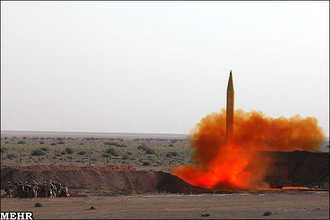 |
Iran's Islamic Revolution Guards Corps first 14 domestically manufactured missiles on Tuesday during the second day of the first stage of Great Prophet 6 war game. The commander said that longer range missiles are not likely to be build because all of Iran's desired targets are already in reach with its current missiles. "The range of our missiles has been designed based on American bases in the region as well as the Zionist regime." Payvand and CS Monitor
According to a leader of the Free Gaza Movement, "There have been many obstacles and complaints. Some boats are not ready and it is not clear when we will sail, although we expect it will be in the coming week. We cannot rule out the possibility that it will be pushed off until the beginning of next week." One of the 10 flotilla ships was sabotaged by cutting the propeller shaft. "Insurance has been withdrawn, one of the ships was sabotaged and Greek authorities have not given all of the permits." He blames the problems, including the sabotage, on the Israelis. Jerusalem Post
Rep. Dennis Kucinich, on a "fact-finding mission" to Syria and Lebanon this week, was quoted by the Syrian Arab News Agency (SANA) as saying, "President al-Assad is highly loved and appreciated by the Syrians. President Bashar al-Assad cares so much about what is taking place in Syria, which is evident in his effort towards a new Syria and everybody who meets him can be certain of this." Kucinich claims that the quote may have come from a mistranslation of what he actually said. "Given the stakes for Syria and the region, I will consider the article only an error, not a willful intent to mischaracterize my statements or my efforts in the region." The Hill
 |
Growing frictions among nations bordering the South China Sea, exacerbated by the increasing assertiveness of the Chinese military, could lead to armed confrontation and even war, a leading Australian foreign policy think tank warned yesterday. According to the report, "The sea lanes are becoming more crowded, contested and vulnerable to armed strife. Naval and air forces are being strengthened amid shifting balances of economic strategic weight. As the number and tempo of incidents increases, so does the likelihood that an episode will escalate to armed confrontation, diplomatic crisis or possibly even conflict." Independent and Lowy Institute
Zong Qinghou is the richest man in China, with $12 billion in assets. He works 14-hour days, smoking and drinking tea are his only luxuries, and he spends no more than $20 a day. Does Zong, a member of the Communist Party, see himself as more of a communist or a capitalist? His response:
"If there is anyplace in the world where socialism prevails, it's Europe. Europe, with its high taxes and welfare states, is a dead end. People in Europe should work harder."
The parliament of Tajikistan is approving a controversial parental responsibility bill, which has been heavily criticized by local religious communities. The new legislation has generated controversy by explicitly barring children under the age of 18 from “participating in the activities of religious organizations,” which include mosques and other places of worship. Local analysts believe that the ban is aimed at preventing Tajik children from becoming radicalized. Presenting the bill in the parliament, Tajik Education Minister Abdujabbor Rahmonov, said: “The draft law allows children that study in religious schools to attend mosques and join religious associations. However, children studying in secular schools are prohibited from doing so before they reach the age of 18.” He also said that children will still be allowed to participate in funerals and attend mosques during official religious holidays. Jamestown
It was almost a year ago that I was the first major American blogger to write about the gathering crisis over the fact that Sochi was the site of an 1864 Russian genocide of the Circassian ethnic group in Russia's North Caucasus. ( "30-Oct-10 News -- Caucasus terrorism / politics becomes embroiled in 2014 Olympics") Since then, the genocide issue has been getting increasing attention, and is uniting the 8.5 million Circassians in the world, of whom only about 10 percent (900,000 people) live in Russia, mostly in the North Caucasus. An estimated seven million Circassians live in Turkey, 200,000 in Syria, 130,000 in Jordan, 150,000 in EU countries, 40,000 in Iraq, 30,000 in Libya and about 30,000 in North America. However, Russian officials are avoiding dealing with the problem, and the threat to the 2014 Olympics in Sochi. Jamestown
 |
The only authenticated photograph of infamous Wild West gunslinger Billy the Kid was auctioned off for $2.3 million on Saturday night. The metallic tintype image had been expected fetch only $400,000. Born Henry McCarty, but known in New Mexico as William Bonney, the Kid was shot dead at age 22 by lawman Pat Garrett in 1881, months after a jailbreak in which Bonney reportedly killed two deputies. The winning bid was from Florida billionaire William Koch one of the sons of Fred C. Koch, founder of Wichita, Kansas-based energy conglomerate Koch Industries. Reuters
I've never believed in almost any conspiracy theories, but a forum member called my attention to this one that may be the real thing. According to the NY Times article, a secret cartel of nine NY banks meets every month to prevent other banks from entering the derivatives industry and to influence legislation. The reason that this story is credible is that bankers are increasingly one of the most hated group in the country (the same thing happened in the 1930s), and the bankers themselves are developing a bunker mentality. The same kind of thing might be seen, for example, in Mexican drug cartels. The bank cartel probably won't last long, and bankers will continue to be hated more and more. NY Times
(Comments: For reader comments, questions and discussion,
see the 29-Jun-11 News -- China promises EU bailout, as officials discuss the 'French Model'
thread of the Generational Dynamics forum. Comments may be
posted anonymously.)
(29-Jun-2011)
Permanent Link
Receive daily World View columns by e-mail
Donate to Generational Dynamics via PayPal
The people versus their political representatives
The analysts are holding their breath, waiting for Greece's Parliament to vote on more austerity measures later this week. The austerity measures include higher taxes, lower benefits, sales of assets, and privatizations of public companies. According to one analyst I heard today, the package of new austerity measures will cost each Greek citizen $2,795 euros per year, equivalent to one month's income for a family. These austerity measures are demanded by the European Union (EU) and the International Monetary Fund (IMF), as a condition for new bailout money to Greece to avoid bankruptcy as early as July 15.
 |
Nonetheless, a new poll indicates that most Greeks would rather accept the harsh terms of the austerity package, rather than see their country go bankrupt, according to AFP. 57% of those polled said the country should accept the deal, while only 22.7% said it should be rejected, "even at the cost of bankruptcy."
But while the Greek people may be willing to accept the deal as the lesser of two evils, a poll of the German people says that they're becoming turning strongly against giving Greece another bailout, even if not doing so means the end of the euro.
This situation is leading to a major confrontation between the German people and their political representatives, according to an article in the center-right Frankfurter Allgemeine Sonntagszeitung. Rough translation:
"The common man is afraid. For almost an hour, the politician had to listen to speakers on the stage ask, "Why do we have to save Greece?" Because the EU means peace, he says. Because Germany has nine neighbors. Because we should not hold our noses too high.Then war was threatened. Now the audience was asking questions. The man in the beige pleated suit, himself a war child, stood at the microphone and talked about fear. Not fear of tanks. He fears that billions that the German education system will soon lose. "Why do I have the impression that the rescue of foreign countries is always more important than the rescue of our own country?"
It was very quiet in the hall, and on stage the politician, former Finance Minister Peer Steinbrueck, was struggling to maintain his composure. "Germany is dependent on Europe," he finally says, sounding really embarrassed for the first time that night. "I hope I've made that clear."
But he had not. Germany's most popular politican can try to explain the billions of aid to Greece, that neither the opposition politicians nor the unpopular Chancellor Merkel are challenging. But the Germans are not convinced of the necessity of the euro rescue. Not the Social Democrat voters who complain about "these astronomical sums" and ask, where will this money come from? Not the European Union supporters elsewhere in the republic. The government in Berlin favors a rescue package for Greece, but in the countryside, the mood has turned. ...
The crisis is becoming a crucial test between the people and their representatives. The Germans simply will no longer put up with it. The head explodes thinking about the billions that were distributed in a big surprise to bankrupt banks. Then the amount increased again in a breath, as the Euro-summit hunted for the next [bailout], while television pictures showed Greece in a political state of emergency. The people are less and less civil in accepting this contradiction."
According to the article, Germans oppose further aid to Greece by 60% to 33%, even though 80% of Germans believe that "the financial difficulties of some EU countries [are] a threat to the stability of the euro."
The big gap in views between the people and their representatives mirrors the gap between World War II survivors and their children, as I've reported many times. (See my 2005 article. "France rejects EU Constitution.")
The WW II survivors, traumatized for life by the bloody violence of the war, formed the European Union with the specific objective of preventing a new war. However, younger people, with no personal experience of the war, are more concerned about their own incomes than in preventing a new war.
My guess is that if Greece's parliament votes down the austerity measures later this week, then the German people will be even more firmly opposed to a bailout of Greece.
In fact, European Commission President Jose Manuel Barroso and other senior EU officials have repeatedly said that "there is no Plan B for Greece," and that the austerity plan MUST pass.
However, as we've reported many times in the past few months, a European official apparently cannot open his mouth without blatantly lying, and this statement is no exception, according to sources speaking to Reuters. Unnamed euro zone officials are saying that there is a contingency plan to provide Greece with bailout money, even if the Greek parliament fails to vote in favor of the austerity measures.
And why should the Greek parliament vote for the austerity measures, if Greece is going to be bailed out anyway?
And it's fascinating that exactly the same kind of austerity debate, with the same kinds of arguments on both sides, is taking place in Washington, framed as a question of whether to raise the debt limit.
(Comments: For reader comments, questions and discussion,
see the 28-Jun-11 News -- German support for bailout of Greece falls sharply
thread of the Generational Dynamics forum. Comments may be
posted anonymously.)
(28-Jun-2011)
Permanent Link
Receive daily World View columns by e-mail
Donate to Generational Dynamics via PayPal
New book reveals secret meanings of neo-Nazi codes
This morning's key headlines from GenerationalDynamics.com.
 |
On Monday, the International Criminal Court in The Hague issued arrest warrants on charges of genocide and crimes against humanity for the country’s leader, Muammar Qaddafi, his son Saif Qaddafi, and his intelligence chief. It had previously been hoped (by some) unrealistically that a diplomatic resolution of the humanitarian Libyan kinetic military action could be reached, where Gaddafi would take up residence in Saudi Arabia or some other country. But with arrest warrants pending against him. that option is removed. Gaddafi will now have to fight to victory, or fight to the death. Bloomberg
Gaddafi is 'seriously considering' fleeing Tripoli for a more secure location outside the capital, according to U.S. officials. Fox News
Turkey's Foreign Minister Ahmet Davutoglu is preparing for a tour of Middle Eastern countries including Syria, Saudi Arabia, Jordan and Iran. The two major objectives of the tour are to improve relations with Syria, and to aid Palestinian reconciliation and the formation of a unity government. Hurriyet (Ankara)
Israel's government on Monday dropped a threat to issue 10-year bans on journalists aboard a Gaza-bound flotilla attempting to break Israel's naval blockade. AP
Openly Nazi symbols such as the swastika are banned in Germany, but neo-Nazis get around the law by using numeric codes. For example, if a sports figure wears shirt number 88, then it's possible that the "88" stands for "Heil Hitler." Spiegel
Egypt's decision to reject low-interest loans from the International Monetary Fund (IMF) and the World Bank is politically popular, but it risks much higher poverty and unemployment. Media Line
Fazal Saeed Haqqani, a senior Taliban commander, has decided to leave Tehrik-e-Taliban (TTP), or Taliban Movement of Pakistan, because TTP is responsible for "brutal" attacks on Pakistani civilians, in violation, he says, of the Koran. Instead, he and his 500 fighters are forming a new group, Tehrik-e-Taliban Islami (TTI). This new Taliban group will target Americans in Afghanistan. Saeed Haqqani is thought to have close ties to the Haqqani network, headed by Jalaluddin Haqqani, one of the fiercest Afghan insurgent groups battling U.S.-led forces in Afghanistan. Reuters
When I was about ten years old, I read a newspaper article that said that some politicians wanted to ban "violent" comic books, including my favorite Superman, because reading them turns children into violent criminals, as if even a young child couldn't tell the difference between a comic book and real life. That was the first time I really began to realize that politicians are idiots. After that it was rock 'n' roll that was evil, then 1970s TV crime shows like Kojak, then porn, then video games. A few years ago, it was the TV show '24'. On Monday, the Supreme Court struck down a law restricting sales of violent video games to children. Still some "experts" claim that video games are dangerous. CNN and Wall Street Journal (Access)
When a woman is ovulating, she's instinctively able to identify gay men by looking at their faces in photos. Telegraph
(Comments: For reader comments, questions and discussion,
see the 28-Jun-11 News -- German support for bailout of Greece falls sharply
thread of the Generational Dynamics forum. Comments may be
posted anonymously.)
(28-Jun-2011)
Permanent Link
Receive daily World View columns by e-mail
Donate to Generational Dynamics via PayPal
Israel's Navy prepares for confrontation with 'Freedom Flotilla II'
This morning's key headlines from GenerationalDynamics.com.
 |
Yemen officials are saying that badly scarred president Ali Abdullah Saleh will make a televised appearance this week, as he negotiates his return from the Saudi Arabian hospital where he's been confined since he was injured in a bomb attack while he was praying in a mosque in his palace complex in Sanaa. According to an official statement, "The president will appear within the next 48 hours despite our fear that the burns on his features and on different parts of his body will be an obstacle, given that his appearance will not be as the media expects it." Telegraph
Anti-government protests have continued on a daily basis since Saleh's hospitalization. On Sunday, tens of thousands of Yemenis rallied in the Sanaa and other cities to demand that Saleh step down, and that his family leave the country. It'll be interesting to see how they react to Saleh's planned television appearance. In the meantime, fighting continues between Yemen's army and al-Qaeda linked militants in southern Yemen. VOA
Several factions of the Muslim Brotherhood have broken off to form new parties to rival the Brotherhood's main Freedom and Justice Party. The latest is al-Riyada, Arabic for The Pioneers, a "reformist" party opposed to the Brotherhood's hard lines on viewing Islamic Sharia law as the basis of society. A youth movement within the Brotherhood plans to formalize its own independent political party, according to a youth leader. AP and UPI
Israel's Navy is making plans to block Freedom Flotilla II from breaching Israel's blockade of Gaza, with the expectation in doing so that there won't be a repeat of the violence that led to the deaths of nine activists, mostly Turkish. Turkey will not participate this year, but vessels from the U.S., France, Ireland, Italy, Spain and Canada are participating. Participants will be arrested, and sent back to their country of origin, and a 10-year travel ban to Israel will be applied to them. Jerusalem Post
The Foreign Press Association is accusing Israel of trying to intimidate Gaza flotilla journalists, with the threat of the 10-year travel ban. It says that the threat raises serious questions about Israel's commitment to freedom of the press, and, "Journalists covering a legitimate news event should be allowed to do their jobs without threats and intimidation. We urge the government to reverse its decision immediately." Guardian
An official UN Secretary-General's report on last year's flotilla to Gaza concludes that Israel's naval blockade of Gaza is in keeping with international law, and therefore its actions to stop the flotilla were also legal, although they used disproportionate force that led to the deaths of nine Turkish citizens. The report is due to be released within two weeks. The draft report, which has been seen by Israel and Turkey, criticizes the Turkish government and highlights the relationship between it and IHH, the activist group that organized the flotilla. Turkey is asking Israel to agree to "tone down" the criticisms of Turkey in the report, in return for ending the crisis in relations between the two countries. Haaretz
American and European embassies in Syria and Lebanon are making preparations for quick evacuations, in case Syria's government falls, and is replaced by a new government that's hostile to the West, or that reacts as the Iranians did after the Shah fell in 1979. Daily Star (Lebanon)
Hezbollah leader Hassan Nasrallah said that the militant Islamic group has uncovered three spies within its ranks, two of whom were recruited by the CIA. The U.S. embassy in Beirut dismissed the report as "empty accusations." CNN
Greece's deputy prime minister Theodor Pangalos says that the vote to pass specific required austerity measures may fail. These austerity measures are required by the EU and IMF (unless they cave in) for Greece to receive the next tranche of last year's bailout. Without this money, Greece will default on July 15, when it can no longer make its debt payments. This is the first of several consecutive major crisis weeks for Greece and the EU. BBC
Talk of a Greek default in the near future is becoming widespread. Irish Finance Minister Michael Noonan is seeking to distance Ireland from Greece, for fear that a default in Greece would contaminate Ireland. Wall Street Journal (Access)
The Khmer Rouge, led by Pol Pot, was responsible for the deaths of millions of Cambodians in 1975-79. A UN-backed tribunal in Cambodia is holding its first hearing in the trial of four former top Khmer Rouge leaders. The charges include genocide and crimes against humanity. BBC
(Comments: For reader comments, questions and discussion,
see the 27-Jun-11 World View -- Burn-scarred Yemen president to make TV appearance
thread of the Generational Dynamics forum. Comments may be
posted anonymously.)
(27-Jun-2011)
Permanent Link
Receive daily World View columns by e-mail
Donate to Generational Dynamics via PayPal
China will not support a new North Korean military provocation
Commemorating the beginning of the Korean War on June 25, 1950, South Korean president Lee Myung-bak saluted hundreds of Korean War veterans from home and abroad and said, "I deeply bow my head and experss my respect to you who devoted your hearts and bodies to the country by putting studying behind and picking up guns despite your young age," according to the Korea Herald.
 |
The commemorations come after a year in which North Korea launched two separate deadly military attacks on South Korea -- the torpedo sinking of the South Korean warship Cheonan on March 26, and the November 23 artillery attack on Yeonpyeong Island, killing four South Koreans.
The South Koreans never retaliated for the two attacks, though they infuriated the South Korean people, and raised nationalistic sentiment. One reason for the South's hesitation is the strong support that the North Koreans received from their long-time ally, China.
But China has reportedly said that it will no long stand by North Korea if there's another attack, according to Mainichi (Japan).
On Thursday, President Lee Myung Bak reported told a group of lawmakers that China has officially notified the South Korean government that "it won't stand by the North if it makes an additional provocation."
It remains to be seen whether China holds to that promise, if another military attack occurs.
North Korea has suffered food shortages for many years, but they're worse than ever this year, according to the Washington Times. World Food Program (WFP) analysts are warning that North Korea could face its worst food crisis since the famine of the 1990s that claimed more than 1 million lives, because severe weather and floods greatly impacted the 2010 fall harvest, leaving no food supplies for months until the summer harvest.
Western food aid to North Korea has been cut off in 2009 because of their nuclear weapons program. On Saturday, U.S. Secretary of State Hillary Clinton was quoted by Korea Times as saying,
"We have made no decision about providing food aid to North Korea at this time. Any such decision must be based on legitimate humanitarian needs, competing needs elsewhere around the world and our ability to ensure and monitor that whatever food aid is provided actually reaches the people who are in need," she added. "Therefore, North Korea must address our serious concerns about monitoring and outstanding issues related to North Korea's suspension of previous food aid programs before we can consider any decision.
The lack of food is causing mass starvation, malnutrition, and even cannibalism, according to Strategy Page. The result is an increasing number of angry anti-government protests, something that was unheard of in earlier years.
The "Jasmine Revolutions" in the Arab world are causing concern and possibly panic in the North Korea's government. North Korea has imported large amounts of tear gas, shields, and helmets from China, apparently with the aim to suppress any uprisings, according to Chosun. Late last year, the North launched special riot control force in preparation for massive demonstrations. The units have reportedly developed new riot control methods for public places like railway stations, markets, schools, and parks.
From the point of view of Generational Dynamics, the South Korean government is in a deep state of denial with respect to the possibility of reunification of North and South Korea, which have been separated since they were partitioned after World War II.
On Tuesday, South Korean president Lee said that unification could happen at any time, and could come unexpectedly sooner rather than later, according to Yonhap. He said inter-Korean unification would come like "a thief in the middle of the night," and that Seoul needs to prepare for such an eventuality.
This is completely unrealistic. This view comes from the reunification of German in 1989, which DID come suddenly and unexpectedly, after the Berlin Wall fell. But there's a huge difference between the two situations: Germany was in a generational Unraveling era at that time, and a serious reunification war was impossible; Korea is in a generational Crisis era today, and reunification WITHOUT a serious war is almost impossible.
(Comments: For reader comments, questions and discussion,
see the 26-Jun-11 News -- S. Korea thanks America over Korean War, and warns N. Korea
thread of the Generational Dynamics forum. Comments may be
posted anonymously.)
(26-Jun-2011)
Permanent Link
Receive daily World View columns by e-mail
Donate to Generational Dynamics via PayPal
China's Catholic Church will ordain bishops without Vatican approval
This morning's key headlines from GenerationalDynamics.com.
 |
A week ago, Turkish officials gave Syria one week to start reforms and stop the violent suppression of protests, which is estimated to have killed more than 1,400 people in less than four months. Now Syrian military units are massing near Turkey's border, apparently as a warning to Turkey not to attempt to establish a buffer zone inside Syria. Guardian
The situation between Syria and Turkey is explosive and could slide into a violent confrontation, a highly-placed Turkish source said on Saturday. Turkey's Prime Minister Recep Tayyip Erdogan is exploring possible scenarios involving Syrian military operations on Turkish territory. The concern is that the Syrians would try to hit refugee camps in Turkey that have already taken in 12,000 Syrian civilians. Citing Iranian sources, the Lebanese Al-Akhbar newspaper reported yesterday that Iran had warned Turkey not to allow NATO forces to use Turkish territory to attack Syria, saying if Turkish territory was permitted, Iran would attack American and NATO basis in Turkey. Haaretz
Fearing "a massive influx of refugees" from Syrian, Turkey is building a giant tent city on the Syrian border. The tent city at Apaydin will be the largest of Turkey's refugee camps, with a capacity to accommodate up to 15,000 people. the camp will offer toilets, showers, cinemas, playgrounds for children, a small mosque, a field hospital, recreation areas, and even a wedding hall. The head of the Turkish Red Crescent has said that his agency is in theory able to sustain up to 250,000 people. Daily Times (Pakistan)
A French newspaper is reporting that Hezbollah is using trucks to move hundreds of long-range Iranian-produced missiles from Syria to bases in Lebanon's Bekaa Valley, for fear that Syria's Assad regime may collapse, and the new Syrian government will cut off ties with Hezbollah. Hezbollah is using sophisticated means of camouflage to thwart possible Israeli attempts to bomb the truck convoys. Haaretz
Turkey and Israel are renewing strategic ties, as the Syria crisis escalates. Debka
Hundreds of Syrians fled across the border into Lebanon during the last two days. Six of those coming thre had gunshot wounds, after being shot at by Syrian security forces. However, Lebanon is not as safe for refugees as Turkey is. Syria has a lot of influence in Lebanon, and the regime can still reach people there. Al-Jazeera
As we reported six weeks ago, Egypt imports half its wheat, but will be bankrupt by September. Earlier this month, the finance minister announced that the IMF had granted Egypt a loan of three billion dollars over 12 months to help put its economy back on track. However, Egypt has now withdrawn its loan applications to the IMF and World Bank, citing "the pressure of public opinion," presumably after watching how Greece is being skewered. Egypt claims that Saudi Arabia and Qatar have pledged enough aid to last them a year. AFP
The papers that were captured along with Osama bin Laden in the recent raid in Pakistan indicated that bin Laden was concerned that al-Qaeda was losing popularity, especially since it was killing huge numbers of Muslims instead of the American's he wanted to target. The organization's full name is "Al-Qaeda al-Jihad," or "The Base of Holy War," but the shortened form meant "The Base," which doesn't make sense to many people. He wanted a name that would make it clear that he was waging a holy war against America and the West, and considered "Taifat al-Tawhed Wal-Jihad, meaning "Monotheism and Jihad Group," or "Jama'at I'Adat al-Khilafat al-Rashida," meaning "Restoration of the Caliphate Group." AP
The Chinese Patriotic Catholic Association (CPCA), the state-controlled Catholic Church in China, will select and ordain bishops for 40 of the country's 97 dioceses without Vatical approal. The selection will be based on "national conditions and pastoral and evangelizing work." The Vatican says that ordinations can only go ahead with the pope's blessing, but the Vatican and China have not had formal diplomatic ties since 1951. Xinhua and AFP
 |
Venezuelan President Hugo Chavez is in critical condition after an operation for a pelvic abscess in a Havana hospital. Chavez's daughter, Rosina, together with his mother, Marisabel Rodriguez, left for Cuba on an air force plane. El Nuevo Herald Translation
It's very unusual for anyone in the mainstream to take generations into account for anything, but a new study of wine drinking habits in France reveals significant generational changes in wine drinking that may signal the end of wine as being part of the French national identity. The over-65 World War II survivors are daily consumers of wine, and recognise the strong social and cultural heritage and enjoy sharing the wine experience with family and friends. The Boomers and Gen-Xers drink only socially with friends, rather than family, and for the young Millennial generation, wine consumption is very much the exception rather than the rule. Eurasia Review
Climate change advocates say that the only way to reduce emissions of global warming gases, mainly carbon dioxide from the burning of fossil fuels, is to implement a worldwide market on synthetic securities known as "carbon credits," and then force each government to participate in a trading scheme for these securities. However, Interpol has warned that carbon credit securities schemes are easily taken advantage of by organized crime, and that they're subject to the same kinds of banker fraud that brought about the global financial crisis. (See my 2007 article, "UN Climate Change conference appears to be ending in farce.") Finally carbon credit trading doesn't even work -- as has been shown by the European countries where such a scheme has been implemented, with the result that carbon emissions have only increased. Tierramérica
(Comments: For reader comments, questions and discussion,
see the 26-Jun-11 News -- S. Korea thanks America over Korean War, and warns N. Korea
thread of the Generational Dynamics forum. Comments may be
posted anonymously.)
(26-Jun-2011)
Permanent Link
Receive daily World View columns by e-mail
Donate to Generational Dynamics via PayPal
Unintended consequences of health care law
With food prices at historic highs, politicians are scrambling for something to blame other than themselves. That was the main agenda item on the meeting of the G-20 finance ministers from the 20 biggest economies in the world.
 |
The meeting, which ended on Thursday, published an Action Plan with the following five main objectives:
Among the actions proposed by the plan, "we will give special attention to smallholders, especially women and young farmers, in particular in developing countries."
I wanted to quote some of the Action Plan so that it would be apparent how vacuous the whole thing is. I don't know how many millions of dollars of taxpayer money was spent on this meeting, but it can't have been worth the money.
French President Nicolas Sarkozy wanted to blame the rise in food prices on speculators, according to Bloomberg, and demand regulation of the financial commodities markets, but he was unable to get agreement. Presumably speculators weren't the cause of the massive floods in China that are drowning farmland, as shown in the picture above.
The only interesting bit of controversy came over the the question of studying restrictions on biofuels to control food prices, but that was rejected as well, according to the Financial Times (Access).
The political posturing at G20 came just a week after the release of a new report by the UN's Food and Agriculture Organization (FAO), which states as clearly as anyone has that the Green Revolution is now failing more and more, and that a completely new and completely different New Green Revolution is required.
"The Green Revolution in agriculture, which swept much of the developing world during the 1960s, saved an estimated one billion people from famine. Thanks to high-yielding crop varieties, irrigation, agrochemicals and modern management techniques, farmers in developing countries increased food production from 800 million tonnes to more than 2.2 billion tonnes between 1961 and 2000. Intensive crop production helped to reduce the number of undernourished, drive rural development and prevent the destruction of natural ecosystems to make way for extensive farming. Those achievements came at a cost. In many countries, decades of intensive cropping have degraded fertile land and depleted groundwater, provoked pest upsurges, eroded biodiversity, and polluted air, soil and water. ... [T]he yield growth rate of major cereals is declining, and farmers face a series of unprecedented, intersecting challenges: increasing competition for land and water, rising fuel and fertilizer prices, and the impact of climate change. ...It is now recognized that those enormous gains in agricultural production and productivity were often accompanied by negative effects on agriculture’s natural resource base, so serious that they jeopardize its productive potential in the future. “Negative externalities” of intensification include land degradation, salinization of irrigated areas, over-extraction of groundwater, the buildup of pest resistance and the erosion of biodiversity. Agriculture has also damaged the wider environment through, for example, deforestation, the emission of greenhouse gases and nitrate pollution of water bodies."
In other words, the Law of Diminishing Returns is working its magic with the use of fertilizers and insecticides, so that they're less effective as time goes on, and in fact they're causing actual damage to farmland. Other resources, including groundwater and forests, are being used up.
As I've described in the past, the Green Revolution petered out in the 1990s, at the same time that the financial crises began, and for the same reasons -- the disappearance by death and retirement of the generations of survivors of the Great Depression and WW II. The result has been sharply rising food prices since the year 2000:
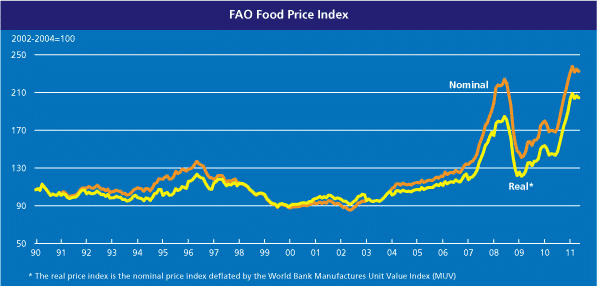 |
From the point of view of Generational Dynamics, we can expect a New Green Revolution to take hold in the 2020s, after the Clash of Civilizations world war has ended, just as there was a Green Revolution after WW II ended.
A related story is the recent survey of employers commissioned by McKinsey & Company that 30 percent of surveyed employers were "definitely or probably" planning on discontinuing employer-sponsored health insurance after 2014, when the new health care law comes into effect.
As I've written several times in the last two years, the so-called "Obamacare" law is economic insanity, and has no chance of actually being implemented.
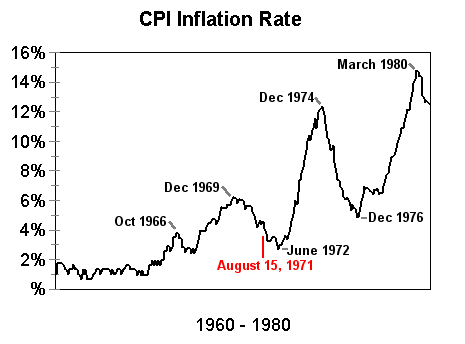 |
Until 2009, by far the dumbest and most destructive economic policy enacted in Washington in my lifetime was the imposition, by President Richard Nixon's administration, of wage-price controls, to counter the national "emergency" represented by an inflation rate of about 4.5%. The controls program was an utter disaster. The inflation rate spiked up during the period of wage-price controls, as you can see from the graph. It caused numerous shortages and mini-calamities, did enormous damage until it was ended three years later, and required years for the economy to recover from the damage.
One story that's always stuck in my mind was that farmers in New Jersey were drowning chickens. The problem was that chicken feed was a commodity whose price was determined by the international commodities markets, and so its price could not be controlled, while the prices of chickens WERE controlled. So the prices of chicken feed went up, and the prices of chickens stayed the same, meaning that farmers could no longer afford to raise chickens. So they drowned the chickens, leading to a big shortage of chickens. There were thousands of stories like that.
The new health-care law is a repeat of Richard Nixon's wage-price controls as applied to health care industry, and the result is equally disastrous. We have stories of worsening doctor shortages, waivers being granted to political cronies, and lawsuits by people who aren't political cronies. It's an absolute mess.
The government cannot control health care prices any more than it can control food prices. The G-20 meeting was a waste of time, but the ministers didn't jump off a cliff by imposing food-price controls. The McKinsey study is just the lastest reason why the health care law is economic insanity, and why it will never be implemented.
(Comments: For reader comments, questions and discussion,
see the 25-Jun-11 News -- G20 aims to lower food prices by government edict
thread of the Generational Dynamics forum. Comments may be
posted anonymously.)
(25-Jun-2011)
Permanent Link
Receive daily World View columns by e-mail
Donate to Generational Dynamics via PayPal
Turkey throws support behind recognition of Palestinian state
This morning's key headlines from GenerationalDynamics.com.
 |
Syria and Turkey used to be friendly allies, but the mutual hostility has been growing steadily since the Syria's army and security forces have been massacring peaceful protesters. Now that Syria's army is on Turkey's border, Turkey says that it is closely monitoring the situation, especially as its driving thousands of Syrian refugees into Turkey. The Syrians say that they are deeply offended and angered by Turkey's attitude. An unnamed former Syrian intelligence official says that the troops would be pulled back from the border within a week. Hurriyet (Ankara)
A senior Israeli source says that Iran is actively involved in helping Syria's violence against protesters. According to the report, Iran's Revolutionary Guard and the Al-Quds force are operating throughout Syria. Their role is not limited to shootings; Iran has also supplied equipment to the Syrian army, including sniper rifles and communications systems for disrupting the Internet in the country. Haaretz
Turkey's PM Recep Tayyip Erdogan said Friday that Turkey would "mobilize" support to help recognition of a Palestinian state. He also said Turkey was prepared to contribute toward Palestinian efforts to form a unity government. AP
With the "kinetic military action" in Libya now in its fourth month, the House of Representatives sent a mixed message by refusing to either endorse or curtail the U.S. involvement in libya. By an overwhelming margin, lawmakers refused to sanction U.S. participation in a NATO campaign of airstrikes in the North African country, a vote that amounted to a rare, bipartisan rebuke of a president's foreign policy during an active military conflict. Minutes later, however, a Republican-led effort to try to curb financial support for U.S. involvement also failed. LA Times
Swedish Automobile, the owner of Saab Automobile, is effectively bankrupt and shut down, with funds remaining to pay salaries or continue production. However, the Chinese company Pang Da Automobile Trade Co. plans to buy a stake in Saab, allowing it to continue production. However, one analyst is quoted as saying, "There’s little chance for the deal to be approved by Chinese government given the crowded status of local auto manufacturing." Bloomberg
(Comments: For reader comments, questions and discussion,
see the 25-Jun-11 News -- G20 aims to lower food prices by government edict
thread of the Generational Dynamics forum. Comments may be
posted anonymously.)
(25-Jun-2011)
Permanent Link
Receive daily World View columns by e-mail
Donate to Generational Dynamics via PayPal
Why you can't kick the can down the road forever
Fed Chairman Ben Bernanke is considered the world's leading expert on the Great Depression, and how to avoid another one. His strategies have been followed not only in the Unitied States, but also in Europe, Japan, and many other countries. So analysts around the world were shocked on Wednesday by the gloomy economic outlook announced by Federal Reserve and Fed Chairman Ben Bernanke, at his second press conference ever. According to Bernanke's theory, the world should be recovering strongly by now.
 |
Many economists, including Bernanke, had predicted that the economy would start growing by now, and would be quickly growing by the end of the year. This is the same kind of forecast that we've been hearing for three years. All bad news was always transitory, and the "V-shaped" recovery was always going to start next quarter.
However, on Wednesday, a very somber Bernanke said that the economic outlook, especially for jobs and housing, is significantly worse than his last outlook, just two months ago. His gloom was confirmed on Thursday by new data that indicates that new home sales are still falling, while unemployment benefit applications are still increasing, according to AP.
I actually have a great deal of respect for Bernanke as a man, even though I've criticized him very harshly in the past. The reason is that he is apparently an honest, decent man who says what he believes without spinning it. This is in contrast to politicians in Washington and Brussels, and bankers on Wall Street, who scream "sleaze" every time they open their mouths. We've recently had the spectacle of Jean-Claude Juncker, head of the European finance ministers, being quoted as saying, "When it becomes serious, you have to lie," just after he'd been caught in a number of lies about the bailout of Greece.
In 2007, as the financial crisis was beginning, I wrote about Ben Bernanke's great historic experiment, how he was applying the lessons of his academic studies to his management of the financial crisis. I wrote that Generational Dynamics theory tells us that his strategy cannot possibly work. Now, nearly four years later, this has proven to be true.
As I wrote recently in "Revisiting the 'Principle of Maximum Ruin,'" mainstream macroeconomic models are completely static in time. Economists assume that the same macroeconomic model that worked in the 70s and 80s also works today, an assumption which is completely absurd on its face, since the economy at that time was being run by the extremely risk-averse generations of survivors of the Great Depression. As I've pointed out many times, economists have been consistently wrong about everything, at least since 1995. They didn't predict and can't explain the 1990s tech bubble, the real estate and credit bubbles, the financial crisis since 2007, where we are today, and what's coming next year. Their predictions are no better than flipping a coin.
With regard to Ben Bernanke, I'm reminded of the old joke about the guy who says, "I used to have six theories about raising children. Now I have six children and no theories."
From the point of view of Generational Dynamics, none of these strategies can possibly work. Once the risk-averse survivors of the Great Depression disappeared, the Boomers led the tech bubble of the late 1990s. Then the Gen-Xers moved into middle management positions and led the massive credit bubble of the mid-2000s decade. This is exactly the same kind of behavior that the corresponding (Missionary and Lost, respectively) generations did in causing the 1929 crash and 1930s Great Depression.
Once the bubble starts bursting, the Fed can't "print" money fast enough to replace the money that's being destroyed through deleveraging. All that money that was created through debt the the credit bubble is still being destroyed, and the amount of money being inserted into the economy is less than the amount being destroyed, so deflation occurs, fiat currency or not.
Ben Bernanke's Great Historic Experiment has been watched, analyzed and copied around the world. So far, it can be said the experiment has not worked anywhere near as hoped. Generational Dynamics predicts that it will turn out to have been a total failure. In view of the gloominess and desperation of Ben Bernanke himself on Wednesday, it's possible that even he realizes it. Either way, the day of judgment cannot be far off.
The phrase that you hear on TV with respect to the bailouts in the U.S. and Europe is "kicking the can down the road," meaning that the bailout only postpones the final default. Several web site readers have asked me recently why we can't just kick the can down the road forever.
The humorous answer is that sooner or later you run out of road, and that does appear to be happening in Europe these days.
But the more serious answer is simply to apply the laws of economics. As I've described many times, you can use the Law of Mean Reversion to prove that the tech, real estate, credit and stock market bubbles that we've had have to burst, with devastating consequences.
And then you can use the Law of Diminishing Returns to show that attempts to re-flate the bubble by means of bailouts or other liquidity techniques have to fail. The problem is that each bailout has a smaller effect ("diminishing return") than the previous one had, and so you have to substantially increase the size of each bailout for it to have the same effect as the previous one.
We've certainly seen this in Europe in the last year. And with $14.5 trillion in debt, America is going to see the same thing before too much longer. At some point, you really DO run out of road.
(Comments: For reader comments, questions and discussion,
see the 24-Jun-11 News -- Bernanke's Great Historic Experiment approaches judgment day
thread of the Generational Dynamics forum. Comments may be
posted anonymously.)
(24-Jun-2011)
Permanent Link
Receive daily World View columns by e-mail
Donate to Generational Dynamics via PayPal
Paralysis in Washington and Greece over austerity
This morning's key headlines from GenerationalDynamics.com.
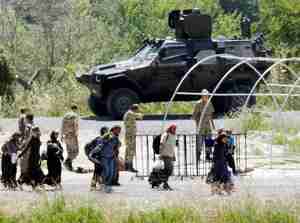 |
In a new escalation of the tensions between Syria and Turkey, Syrian troops advanced on border villages with tanks, snipers and foot soldiers on Thursday, to within the sight of Turkish troops. The Syrian troops attacked refugees that had been camping on the Syrian side, forcing 15,000 more Syrian refugees to flee in panic into Turkey, forcing local officials to create a sixth refugee camp. Tens of thousands of Syrian refugees have already crossed over, and Turkish Red Crescent officials say that they have the capacity to provide aid to 250,000 persons if necessary. AP
U.S. Secretary of State Hillary Clinton warned of a possible border conflict between Syrian and Turkish forces on Thursday evening:
"If true, that aggressive action will only exacerbate the already unstable refugee situation in Syria.Unless the Syrian forces immediately end their attacks and their provocations that are not only now affecting their own citizens but (raising) the potential of border clashes, then we're going to see an escalation of conflict in the area.
It is further example of the lengths to which President Assad's regime will go to repress the people of Syria rather than actually working in a collaborative way to try to resolve the legitimate concerns of the Syrian people."
Al-Jazeera has reported finding that Turkish food rations were feeding forces loyal to Libyan leader Muammar Gaddafi. If Turkey is supplying food to Gaddafi's forces, it would be a violation of United Nations sanctions. The rations are produced by UNIFO, a Turkish company which specialises in portable rations and meals ready-to-eat. Turkey's foreign ministry said that anyone could purchase the food rations and supply them to Libyan forces, but that it has no knowledge of any Turkish company doing that. Al-Jazeera
Israel's prime miniter Benjamin Netanyahu said Thursday night that restarting peace negotiations would requlre that the Palestinian leaders accept Israel as "the Jewish state." Netanyahu pointed out that he had accepted the idea of a Palestinian state in 2009. Jerusalem Post
AP is reporting that top Palestinian official is saying that the Palestinians are ready to ease their demand for a full freeze on Israel's settlement construction in east Jerusalem. The softened position reflects the Palestinians' growing realization that their alternative strategies to talks — reconciling with the Hamas militant group and seeking unilateral recognition at the United Nations — are both in trouble. The reconciliation agreement is collapsing because of Fatah / Hamas disagreements over control of the unity government. AP
 |
The debt reduction debate, which is Washington's version of Greece's debate on austerity measures, collapsed on Thursday, when the two Republican leaders walked out of the talks hosted by VP Joe Biden. The impasse was over raising taxes, which the Republicans oppose and the Democrats say are necessary. According to House Majority Leader Eric Cantor, "There is not support in the House for a tax increase, and I don't believe now is the time to raise taxes in light of our current economic situation." Similar quotes have been heard in Athens. ABC News
Austerity measures proposed by Greek Finance Minister Evangelos Venizelos meet the requirements to get the next bailout payment were endorsed by officials from the European Union and the International Monetary Fund. It seems that every day there's some kind of announcement like that that is virtually meaningless. The crucial test will come on Tuesday, when Greece's legislature has to pass the austerity law, which is opposed by Greece's powerful public sector unions. Bloomberg
New Jersey's Assembly passed a landmark overhaul of the health and pension benefits for public employees in a historic defeat for New Jersey’s powerful public sector unions. Under the law, public employees will have to pay more for their benefits. Although the vote was largely partisan, one Democrat said, "Kicking the can down the road and doing nothing will only require more sacrifice from taxpayers and public workers in the future." New Jersey Star Ledger
(Comments: For reader comments, questions and discussion,
see the 24-Jun-11 News -- Bernanke's Great Historic Experiment approaches judgment day
thread of the Generational Dynamics forum. Comments may be
posted anonymously.)
(24-Jun-2011)
Permanent Link
Receive daily World View columns by e-mail
Donate to Generational Dynamics via PayPal
Echos of the Plantation of Ulster
Political leaders in Belfast, Ireland, are appealing for calm after violence flared with petrol bombs and other missiles thrown, according to the Belfast Telegraph.
 |
In the worst sectarian violence in a decade, scores of masked men launched coordinated attacks on homes and people in the Catholic pro-republican section of Belfast, resulting in several injuries.
The violence is being blamed on the Ulster Volunteer Force (UVF), a Protestant pro-loyalist militia formed in 1966 to fight the republicans in Ireland.
The violence in Northern Ireland is usually portrayed as religious in nature, where Catholics fight against Protestants.
But from the point of view of Generational Dynamics, it can be called an ethnic conflict between indigenous Gaelic Irish people (usually Catholic, republican, nationalist) versus descendants of invading English and Scottish people (usually Protestant, loyalist, unionist). As is often the case, religion is not the "cause" of this conflict, but is a tool used by the factions to rally supporters.
Generally speaking, the objective of the republicans is to unify the Republic of Ireland (southern Ireland) with Northern Ireland into a single republic, while the unionists want Northern Ireland to remain part of the United Kingdom.
There have been clashes between the two groups since the 1400s, but the most important pattern of wars was set by the Nine Years War (1594-1603), where the Irish Gaelics attempted to overthrow English rule. The result was the Plantation of Ulster, which Gaelics today refer to as "ethnic cleansing," because the British drove the Gaelic from their land, took it over as landlords, and used the Gaelics as servants.
The English Civil War of the 1640s was a generational crisis war for England, but it was an Awakening era war for the Gaelics, despite a massacre of the Gaelics by the British under Oliver Cromwell.
The next crisis war for Northern Ireland was the Williamite-Jacobite war, climaxing in a victory of the British with the Battle of the Boyne on July 12, 1690. This was the date of the victory of Protestant William of Orange over the Catholic King James II, and it followed England's Glorious Revolution of 1688, where the Dutch Prince William "invaded" England and overthrew King James without firing a shot.
Today, sectarian violence in Northern Ireland tends to increase as July 12 approaches, as it's commemorated by the Protestant Orange Institution and associated groups, according to CS Monitor.
The new violence has raised concerns that a new round of "The Troubles" is about to begin. In the 1960s-90s, in a period known as "the Troubles," there was violence and terrorist attacks between the two factions, mostly ending with peace agreements in 1998 and 2005. From the point of view of Generational Dynamics, we're seeing a familiar pattern, with alternating periods of peace and violence, with no end to the violence in sight.
(Comments: For reader comments, questions and discussion,
see the 23-Jun-11 News -- Sectarian violence in Northern Ireland grows again
thread of the Generational Dynamics forum. Comments may be
posted anonymously.)
(23-Jun-2011)
Permanent Link
Receive daily World View columns by e-mail
Donate to Generational Dynamics via PayPal
Uncharacteristic silence of Venezuela's Hugo Chavez
This morning's key headlines from GenerationalDynamics.com.
 |
Speculation is rampant that Hugo Chávez is much more seriously ill than admitted, and that there's a power vacuum in Venezuela, since June 10, when Chávez was admitted to a hospital in Cuba for hip surgery. Normally he's on television all the time, giving lengthy speeches, sending tweets to his twitter account. But in the last few weeks, he's been little seen except in a few photographs like the one on the right. Guardian
The U.S. State Dept. is strongly urging all U.S. citizens to refrain from all travel to the Gaza Strip, in view of the "Freedom Flotilla II" headed to Gaza with the objective of breaking Israel's sea blockade. According to the warning,
"The Israel Defense Forces (IDF) strictly controls the crossing points between Israel and the Gaza Strip. The security environment within Gaza, including its border with Egypt and its seacoast, is dangerous and volatile. U.S. citizens are advised against traveling to Gaza by any means, including via sea. Previous attempts to enter Gaza by sea have been stopped by Israeli naval vessels and resulted in the injury, death, arrest, and deportation of U.S. citizens. U.S. citizens participating in any effort to reach Gaza by sea should understand that they may face arrest, prosecution, and deportation by the Government of Israel. The Government of Israel has announced its intention to seek ten-year travel bans to Israel for anyone participating in an attempt to enter Gaza by sea. On May 31, 2010, nine people were killed, including one U.S. citizen, in such an attempt. The U.S. Embassy in Tel Aviv and the U.S. Consulate General in Jerusalem are not able to provide consular assistance in Gaza or on the high seas or coastal waters."
A few hours after surviving a confidence vote in the Parliament ( "22-Jun-11 News -- Greece's Papandreou wins anti-climactic vote of confidence"), the cabinet of Prime Minister George Papandreou approved a 2012-2015 austerity plan, as well as laws for its application. However, this vote was anti-climactic as the previous vote, because it changed nothing. The austerity plan is only a paper document until it's passed by the Parliament, with a vote currently scheduled for Tuesday. As we've pointed out, despite numerous meetings and announcements, the Europeans and Greeks have postponed every real financial decision for months. With bankruptcy facing Greece as early as July 15, EU politicians will now have to accomplish in a few days what they couldn't accomplish in months of haggling. Telegraph
There is considerable opposition to the proposed austerity program. According to Alexis Tsipras of the Left Coalition, "This is not a program to salvage the economy, it's a program for pillage before bankruptcy." The logic is that there's no point in following an austerity program, if you're going to go bankrupt anyway. BBC
China warned the U.S. on Wednesday to stay out of disputes in the South China Sea. "If the United States does want to play a role, it may counsel restraint to those countries that have frequently been taking provocative action and ask them to be more responsible in their behavior. I believe that individual countries are actually playing with fire, and I hope that fire will not be drawn to the United States." AP
The sentencing of 21 men to prison terms ranging from two years to life has sent waves of anger through the majority Shia community in Bahrain. Family members say that they were tortured, denied legal representation, and are now being given harsh sentences to silence them. BBC
Syria's president Bashar al-Assad gave a speech on Monday at Damascus University where he promised reforms. But some students refused to participate in pro-regime ralles. And so, security forces launched a raid at Damascus University late Tuesday, killing and beating dozens of students. LA Times
The U.S. Postal Service, which is facing bankruptcy in September, announced on Wednesday that it will stop paying employer contributions to the Federal Employees Retirement System. The $115 million payment, made every other week, will stop on June 24. Bloomberg
(Comments: For reader comments, questions and discussion,
see the 23-Jun-11 News -- Sectarian violence in Northern Ireland grows again
thread of the Generational Dynamics forum. Comments may be
posted anonymously.)
(23-Jun-2011)
Permanent Link
Receive daily World View columns by e-mail
Donate to Generational Dynamics via PayPal
Greece's bankruptcy threatens Greece and Europe
Prime minister George Papandreou won a vote of confidence by a vote of 155 to 143 in Greece's Parliament early Wednesday morning, after giving a passionate speech about the need to learn the lessons of previous wars and about the need for unity, according to Kathimerini. "All Greeks have the duty and the ability to change this country."
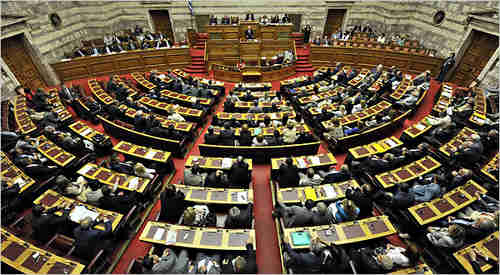 |
However, the vote was anti-climatic, since it accomplished nothing except to avoid the collapse of Greece's government, which many pundits claimed would have been a major crisis.
TV analysts were stressing the dangers if Papandreou lost the vote, but a lot of it was hyperbole, according to the Guardian:
"[London] analysts were showing off the benefits of a classical education as they waited on Tuesday for the Greek parliament to decide whether it would accept tough new conditions for a bailout. The country faced a Sisyphean task, said one, namechecking the king of Corinth who was condemned to roll a rock up a hill only to see it bounce down again, then repeat the task for eternity. Another scribbler compared the challenge facing Greece to the 12 labours of Hercules.Top prize for erudition, though, went to Nick Parsons of National Australia Bank, who chose the longest day to compare the long Hellenic power struggle to the story of King Theseus and his bride-to-be Hippolyta in A Midsummer Night's Dream. The European Union and the International Monetary Fund had handed enormous power to the Greeks, Parsons argued, just as Theseus handed power to Hippolyta by agreeing to lay down his sword."
The reason that nothing was accomplished is because the real problem is the vote on the austerity measures demanded by the EU and the IMF, and that vote, it turns out, won't occur until next week, on Tuesday, June 28.
The vote in the Parliament occurred as about 10,000 angry protesters filled the plaza outside, according to Bloomberg. The powerful electricians trade union conducted strikes on Monday and Tuesday, forcing rolling power outages for two days, as a protest against the planned austerity measures. According to a survey, Greeks oppose the austerity measures by 48% to 35%.
As we reported a couple of days ago, the Eurogroup unexpectedly failed to approve the next tranche, €12 billion, of payout from last year's bailout commitment. This decision was postponed until early July, just barely in time for Greece to make €4 billion in payments by the week of July 15, or go bankrupt.
By delaying this decision, the Eurogroup handed Papandreou a club with which to beat the legislators into submission, although this whole concept may backfire if it further angers the opponents of the austerity measures before the vote next Tuesday.
The Eurogroup plan was that the €12 bilion would allow Greece to pay its bills until September, and that would give them enough time in July and August to work out the details of an additional €110 billion bailout that would carry Greece through 2012.
But the International Monetary Fund (IMF) has thrown a monkey wrench into that plan, according to the Financial Times (Access).
The IMF is going to block the €12 billion aid payment until the Eurogroup comes up with the details of the additional €110 billion bailout. Suddenly, a relatively simple "just give them the money and kick the can down the road again" decision has turned into a very high-pressure situation, which will lead to many additional crisis meetings in the next two or three weeks.
With the additional bailout, Greece's total public debt will shoot up from a monumental €350 billion to a completely overwhelming €460 billion. No analyst that I've heard or read recently believes that Greece has any chance of repaying that without defaulting.
In this situation, there are two camps of people: Those who say that Greece must continually be bailed out, no matter how much it costs, versus those who say that Greece should be cut loose from the euro, and be allowed to default in its original currency, the drachma.
These choices are like being between Scylla and Charybdis, to use one of my own favorite classical Greek metaphors. However, Odysseus at least had the advantage of knowing where these two monsters lived, and the consequences of confronting either of them.
But today's financial ministers are completely in uncharted waters. Either of the two choices apparently will lead to a major global banking crisis of unpredictable proportions. A financial crisis for Ireland, Portugal, Italy and Belgium will be almost immediate consequences.
At the very least, Greece's entire banking system, as well as banks outside of Greece, will collapse, leading to the unstable situation that gave rise to Communism and Fascism in the 1930s, after the collapse of Austria's Credit-Anstalt bank and Germany's Danatbank in 1931.
Despite daily meetings, speeches and grand announcements for the past few weeks, not a single financial decision has been made. Every one that was supposed to be made has been postponed. In the meantime, Greece's crisis has worsened every day.
As I've been saying for years, from the point of view of Generational Dynamics, the worst financial crisis in world history cannot be avoided.
(Comments: For reader comments, questions and discussion,
see the 22-Jun-11 News -- Greece's Papandreou wins anti-climactic vote of confidence
thread of the Generational Dynamics forum. Comments may be
posted anonymously.)
(22-Jun-2011)
Permanent Link
Receive daily World View columns by e-mail
Donate to Generational Dynamics via PayPal
New flotilla aims to break Israel's sea blockade of Gaza
This morning's key headlines from GenerationalDynamics.com.
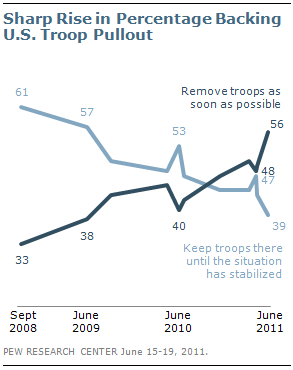 |
On Wednesday evening, President Barack Obama will announce the withdrawal of some of the 100,000 troops in Afghanistan. Speculation is that he'll announce the withdrawal of between 5,000 and 15,000 troops by the end of this year. USA Today
Support for the war in Afghanistan has been collapsing rapidly. For the first time, a majority (56%) says that U.S. troops should be brought home as soon as possible, while 39% favor keeping troops in Afghanistan until the situation has stabilized. The proportion favoring a quick withdrawal of U.S. forces has increased by eight points since last month (from 48%), immediately after the killing of Osama bin Laden. A year ago, just 40% favored removing the troops as soon as possible, while 53% favored keeping them in Afghanistan until the situation stabilized. Pew Research Center
After the attack on his life, aides to President Ali Abdullah Saleh said that he would return from his hospital bed in Saudi Arabia "in a few days." It's now been several weeks, and they're still saying that he'll return to Yemen in a few days. But other sources say that Saleh is having "difficulties breathing and moving," and that he's undergoing surgery in the intensive care unit of a military hospital. AFP
Israel has approved the importing of a large enough volume of building materials into Gaza to allow the United Nations Relief and Works Agency (UNRWA) to build 1,200 new homes and 18 schools. This is one of the largest housing projects that the Gaza Strip has seen in years. VOA
 |
Syria's state run news service is complaining that al-Jazeera, al-Arabiya, the BBC, and other news channels are continuing "their broadcast of fabricated lies" and favoring "those seeking to destabilize Syria," ignoring the millions of pro-regime protesters. Instead, "full time coverage is dedicated for alleged anti-system protests supposedly taking place in the alleys of some Syrian areas shown in shaky and blurry pictures reflecting the views of the agendas they are connected with." Syrian Arab News Agency (SANA)
"Freedom Flotilla II," consisting of around 10 ships carrying 500-600 pro-Palestinian activists from 22 countries, will sail from various Mediterranean ports around June 20, with the objective of breaking Israel's sea blockade of Gaza. The U.S. boat, the Audacity of Hope, will have 36 passengers, including 10 American Jews. "It's important that Jews are in this boat... The Jewish lobby in this country is so powerful," said a spokeswoman. UN Secretary-General Ban Ki-moon is discouraging the new flotilla, out of fear it could degenerate into violence. VOA
(Comments: For reader comments, questions and discussion,
see the 22-Jun-11 News -- Greece's Papandreou wins anti-climactic vote of confidence
thread of the Generational Dynamics forum. Comments may be
posted anonymously.)
(22-Jun-2011)
Permanent Link
Receive daily World View columns by e-mail
Donate to Generational Dynamics via PayPal
PA president Abbas says that, given options, he won't go to UN
Palestinian factions Fatah and Hamas are supposed to have reconciled for the first time since they were at war in 2008, But the reconciliation has been fraught with problems. And now, the participants have canceled a high profile meeting scheduled for Tuesday to announce a new "unity government," according to Gulf News.
 |
The immediate disagreement triggering the cancellation is a dispute over the choice of Prime Minister of the unity government. Mahmoud Abbas, president of the Palestinian Authority and Fatah leader, insists on nominating Salam Fayyad, a U.S.-educated internationally respected former World Bank economist who currently heads the Palestinian government in the West Bank. It's believed that a Fayyad government would reassure Western leaders who are concerned about having to deal with a unity government containing Hamas.
But Hamas is dead set against Fayyad being any part of the unity government, and considers him to be a criminal traitor because he's negotiated some agreements with the Israelis. In the photo above, published by Ynet in July, 2010, Fayyad is shaking hands with Ehud Barak at the King David Hotel in Jerusalem. Hamas considers Barak to be a war criminal.
Fayyad was, in fact, one of the key people who worked to achieve the unity deal in the first place, according to the Palestinian News Network. But after the collapse of the Tuesday meeting was announced, Fayyad said that he may announce his refusal to head the new government, so as not to be an obstacle to Palestinian unity.
However, it's far from clear that the withdrawal of Fayyad from consideration will clear the way for the unity government to proceed, since Fayyad is only a symbol of the larger issue of whether Hamas or Fatah will dominate the unity government.
A major dispute erupted a month ago over whether the Palestinian parliament would have to approve a unity government, according to Al-Ahram. Hamas favored requiring parliament's approval, because Hamas members are in the majority.
However, a new poll of 1,200 Gaza and West Bank Palestinians conducted by the Palestinian Center for Policy and Survey Research (PSR) shows that public attitudes among Palestinians have changed substantially since the unity agreement was first announced.
Prior to the unity agreement, Palestinians were most concerned about the issue of the Hamas/Fatah split. Once the unity agreement was anounced, the concerns about the split were greatly reduced.
Instead, a different issue became prominent: The concern that the unity government will bring back international political and financial sanctions and boycotts. This is a valid concern, since many Western governments have expressed an unwillingness to deal with any government of which Hamas is a part, since Hamas is considered to be a terrorist group. ( "29-Apr-11 News -- Hamas declares Quartet 'obsolete', while West mulls aid cutoff to Palestinians")
Thus, now that the unity government appears to be imminent, the poll indicates that a clear majority of Palestinians want the new government to implement the policies of Fatah and the Palestinian Authority, rather than the policies of Hamas.
According to the poll:
This poll was published on the eve of Tuesday's meeting, and may have factored into the decision to cancel the meeting. It will certainly strengthen the hand of Mahmoud Abbas and Fatah, although it may cause Hamas to pull out of the unity agreement altogether.
A day after the announcement that the Fatah/Hamas unity government meeting was cancelled, Palestinian Authority security forces arrested 11 members of Hamas. According to Hamas, the detainees include teachers, university students and prisoners recently released from Palestinian Authority (PA) and Israeli jails. This prisoner release came about as a result of the reconciliation agreement, and their re-arrest may indicate that the split goes much farther than the choice of prime minister. Arab News
The plan to ask the United Nations General Assembly in September to unilaterally recognize a Palestinian state based on 1967 borders has been extremely controversial, even among Palestinians. However, with the collapse of the unity government meeting, Palestinian president Mahmoud Abbas says that the appeal to the United Nations will go forward until the United States has another option. Ynet
(Comments: For reader comments, questions and discussion,
see the 21-Jun-11 News -- Palestinian unity announcement canceled over Hamas-Fatah split
thread of the Generational Dynamics forum. Comments may be
posted anonymously.)
(21-Jun-2011)
Permanent Link
Receive daily World View columns by e-mail
Donate to Generational Dynamics via PayPal
Tension on Syria / Turkey border continues to grow
This morning's key headlines from GenerationalDynamics.com.
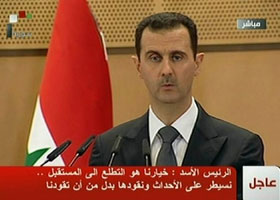 |
On Monday, in a nationally televised address that lasted over an hour in front of a crowd of cheering supporters at Damascus University, President al-Assad alternated between defiance and a conciliatory tone. He said he would prosecute all those guilty of bloodshed, not mentioning that it was his own military that had been implicated in shooting hundreds of unarmed protesters. Referring to the 10,000+ refugees in Turkey, he urged the "displaced" to return to their homes and said security forces would protect and not attack them. This was Assad's third major televised speech since the protests began. Day Press (Syria)
Syrians in cities across the country poured into the streets to hold defiant rallies after Assad's speech using language that varied from disappointment to anger. According to one activist, "People were still hoping he would say something meaningful that would result in tanks and troops leaving the streets. They were disappointed and started going out as soon as Assad finished talking." Global Post
Some sources indicate that Turkish military helicopters are infiltrating northern Syria on reconnaissance missions. Arab sources report Nato is planning to fly extra troops from Spanish and Germany bases to the Izmir Air base in western Turkey to expand the current number of 400. Damascus accuses Turkey of seeking to seize Syrian territory on the pretext of providing a buffer zone for Syrian refugees. Debka
 |
The worst floods since 1955 have hit an east China province, with over 4.41 million people affected, forcing the evalucation of 80,000 people so far, and with the worst rains yet to come. 70 kilometers of dikes are close to overflowing, with possible drastic consequences. The flooding is contributing to China's food price inflation, with the destruction of 241,600 hectares of farmland destroyed. Xinhua
The joint counter-insurgency strategy of the U.S. and Pakistan after 9/11 began to deteriorate almost as soon as it began, because Pakistan's military is culturally anti-India, and supports, rather than opposes, jihadi groups that attack India's assets. The capture of Osama bin Laden seems to have been the last straw. A Corps Commanders Conference on June 9 seems to have sealed the fate of the deteriorating Pakistan-U.S. relations on the question of how to carry out the war on terror in the future. The Corps Commanders Conference decided to stop accepting financial assistance from the United States in the future, and also decided to limit intelligence sharing with the United States and "share intelligence strictly on the basis of reciprocity and complete transparency." Jamestown
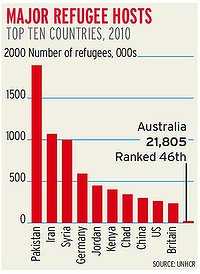 |
According to the United Nations High Commissioner for Refugees, 'rich countries' complain about having to deal with refugees, but it's 'poor countries' that carry most of the load in providing shelter for refugees from other countries. Sydney Morning Herald
Tensions have been escalating in the South China Sea, as China claims sovereignty over all the islands in the entire region, including islands historically governed by other countries, including Vietnam and the Philippines. Singapore is not a claimant to any of the islands, but it said on Monday that China should clarify its claims. "We have repeatedly said that we think it is in China's own interests to clarify its claims in the South China Sea with more precision as the current ambiguity as to their extent has caused serious concerns in the international maritime community." Reuters
(Comments: For reader comments, questions and discussion,
see the 21-Jun-11 News -- Palestinian unity announcement canceled over Hamas-Fatah split
thread of the Generational Dynamics forum. Comments may be
posted anonymously.)
(21-Jun-2011)
Permanent Link
Receive daily World View columns by e-mail
Donate to Generational Dynamics via PayPal
Turkey considers sending troops into Syria
Syria is moving tanks and soldiers into villages near the border to Turkey, in order to stop the flow of Syrian refugees into Turkey, according to AP.
 |
Over 10,000 Syrians have fled their homes and crossed the border into Turkey, in order to seek protection in Turkish refugee camps. There are about 10,000 more Syrians who are camping out near the Turkish border, waiting for an opportunity to cross over, according to Zaman.
Many of them were fed by a baker in the border city of Bdama. But on Saturday, Syrian troops on taks fired machine guns into Bdama and surrounding areas, killing anything that moves, burning down homes. The owner of the Bdama baker was shot, and the bakery was torched by the troops.
As a result, Turkey is now extending aid across its border into Syria, to help people massed there, according to AFP.
In addition, Syria Today is quoting a Turkish television channel saying that a helicopter violated Syrian airspace to conduct a reconnaissance mission.
During the last few days, we've been reporting bits and pieces of news stories that indicate that Turkey is considering sending troops into Syria to establish a "buffer zone" or "security zone" on Syrian soil. Refugees could say in the buffer zone under protection of the Turkish army.
This could cause military clashes between the Turkish and Syrian armies, but some intelligence sources indicate that Syria's president Bashar al-Assad has threatened to respond by sending missiles deep into Turkish territory. For this reason, the US has moved the USS Bataan amphibian air carrier strike vessel to Syrian's coast in the Mediterranean. In the case of Syrian missile attacks on Turkey, the US would provide Turkey with the shield of the AEGIS missile interceptors aboard American warships in the Middle East.
According to an expert quoted by Zaman, Turkey will not just stand by and watch Assad's army kill innocent Syrians on Turkey's border:
"Remember when NATO was accused by the international media and public of not being able to prevent 8,000 Muslim Bosnians from being murdered in front of the world's eyes? As a member of NATO and a country whose border is about to witness such a massacre by the Syrian army, Turkey will not allow such a thing to happen again, especially before its own eyes."
According to the article, there have been numerous top-level visits of Turkish officials to the border region, in order to send a clear and serious message to Syria that Turkey will not close its eyes to the killings, though apparently the message is not being understood by Assad.
(Comments: For reader comments, questions and discussion,
see the 20-Jun-11 News -- Turkey and Syria move closer to military clash
thread of the Generational Dynamics forum. Comments may be
posted anonymously.)
(20-Jun-2011)
Permanent Link
Receive daily World View columns by e-mail
Donate to Generational Dynamics via PayPal
Nato admits it probably killed civilians in Tripoli, Libya
This morning's key headlines from GenerationalDynamics.com.
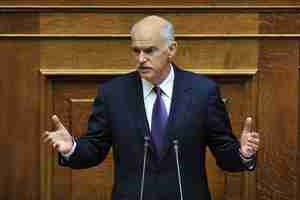 |
As thousands of self-proclaimed "Indignant" demonstrators staged peaceful protests outside the Parliament in Athens, Greece's Prime Minister George Papandreou made a dramatic plea for the political parties to unify behind the austerity measures -- tax hikes, spending cuts and privatizations -- that he's proposed, but which have failed in previous attempts to gain approval. "The consequences of a sudden bankruptcy or exit from the euro zone would be immediately disastrous for Greek households, banks, and the country’s credibility," he said, appealing to opposition politicians "to stop fighting in these critical times, stop projecting the image that the country is being torn apart." However, the leader of the radical left coalition said that the austerity measures are the "kiss of death for the Greek people." Papandreou faces a vote of no-confidence on Tuesday. Kathimerini
The Eurogroup of European finance ministers decided to play brinksmanship on Sunday, by unexpectedly failing to approve the next tranche -- 12 billion euros -- of payout from last year's bailout commitment. It had been expected that this payment would be approved, allowing Greece to pay its bills through September, and giving the EU and IMF time to figure out how to bail out Greece through 2012. ( "18-Jun-11 News -- Europeans devise a 'voluntary' bailout of Greece") The approval decision has been postponed until early July. (Greece needs to cover about 4 billion euros of bills maturing between July 15 and July 22, and faces about 3 billion euros of coupon payments in the month, and then must redeem 6.6 billion euros of maturing bonds on August 20.) Eurogroup chairman Jean-Claude Juncker told reporters, "We forcefully reminded the Greek government that by the end of this month they have to see to it that we are all convinced that all the commitments they made are fulfilled." Bloomberg
 |
Nato officials admitted on Sunday that Nato airstrikes were probably responsible for the destruction of of an apartment building in a residential neighborhood of Tripoli, killing nine people, according to Libyan authorities. Nato said "there may have been a weapons system failure which may have caused a number of civilian casualties." A military missile site was the intended target of the air raid, but "one weapon" apparently went astray. LA Times
Some 37,000 protesters in the May 15 Movement, named for the day on which the protests started, converged on Madrid, Spain, on Sunday for peaceful protests. They were protesting their governments austerity measures, but they were also protesting the European Union's efforts to stabilize the euro. CNN
Although there hasn't been the violence experienced in other countries, thousands of Moroccans have been holding pro-reform demonstrations since February 20. Some ten thousand young people from what is now called the February 20 Movement rallied in Casablanca to reject the constitutional reforms proposed by King Mohammed VI. Mohammed is 47 years old, and took over the Arab world's longest-serving dynasty in 1999. He holds virtually all power, and is also its top religious authority. AFP
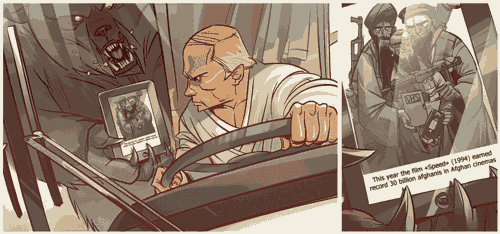 |
Check out http://www.superputin.ru/englishski/ -- where Russian PM Vladimir Putin becomes a superhero beating the terrorists, along with his sidekick, President Dmitry Medvedev, who is dressed as a bear. The comic strip is apparently the first in a serious about "Super Putin, Man Like Any Other." According to the creator, "We wanted to stir Russia's depressing political scene and create some dialogue." AFP
(Comments: For reader comments, questions and discussion,
see the 20-Jun-11 News -- Turkey and Syria move closer to military clash
thread of the Generational Dynamics forum. Comments may be
posted anonymously.)
(20-Jun-2011)
Permanent Link
Receive daily World View columns by e-mail
Donate to Generational Dynamics via PayPal
It's too early for a new crisis civil war in Burma
In August 2009, violent fighting between Burma's army and rebels from the Kokang ethnic group sent tens of thousands of Kokang villagers across the border into China. China allowed this because the Kokang are a Han-Chinese minority. Beijing heavily condemned Burma for the attacks on the Kokang.
 |
It's different this past week, now that the Burmese army is fighting Kachin rebels in Kachin province of northeast Burma (Myanmar), and the fighting is threatening to spill into the Shan ethnic group to the south, according to VOA. This time, China has closed the border, and is demanding that the Burmese take all necessary steps to quell the violence.
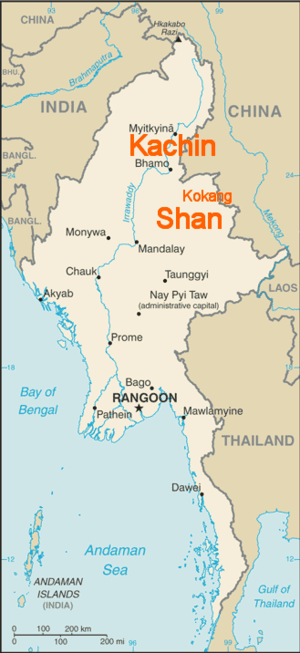 |
The Kachin and Shan are indigenous ethnic groups, but the greater problem is that the Kachin Independence Organization (KIO), a separatist organization, is in control of townships near two Chinese-built hydroelectric dams, according to the Telegraph. The KIO has set up refugee camps for thousands of Kachins fleeing the fighting. China has evacuated hundreds of Chinese workers back to China, according to AFP.
Burma has had several ethnic rebellions in the last 50 years, and they've all ended quickly. From the point of view of Generational Dynamics, the new fighting is expected to end quickly as well, but Burmese officials have been following their usual policy of maximum brutality and bloodshed.
Burma's last two crisis wars (1886-91 and 1948-58) were extremely bloody and violent civil wars between ethnic groups. (See "Burma: Growing demonstrations by the '88 Generation' raise fears of new slaughter")
What always happens after any such war is that the survivors vow that they'll do everything possible to make sure that it doesn't happen again. However, the people who grow up after the war have no such horrible memories, and they begin to protest and demonstrate.
In the case of Burma, the survivors formed a military junta that still rules today, even though the members are aging. Their way of making sure that no similar civil war ever occurs again is to brutally crush every rebellion as quickly as it starts.
On 8/8/88 (August 8, 1988), hundreds of thousands of students, in what is now called the "88 generation," joined by monks and civilians, marched against the military government. Soldiers opened fire on demonstrators with machine guns, resulting in thousands of casualties.
In 2008, as the 20th anniversary of the 1988 massacre approached, there were massive new demonstrations in Rangoon (Yangon), led by monks and nuns, as well as many ordinary citizens. Thousands of troops poured into the streets of Rangoon. Hundreds of activists and citizens were shot dead or burned alive in government crematoriums. Thousands of Buddhist monks, who led the protests to begin with, have been rounded up and detained. Some were found floating face down in rivers.
Now new protests are appearing, this time in the northern provinces of Kachin and Shan. These protests cannot lead to a new civil war, because Burma is in a generational Unraveling era, and there are too many survivors of the last crisis civil war still around. In 5 or 10 years, a new crisis civil war WILL be possible, and no amount of government brutality will stop it -- in fact, government brutality at that time will feed it. But today's protests will fizzle no matter what the government does, and so the brutality is unnecessary.
Probably the greatest significance of the fighting at this time is the effect that it will have on the hydropower dams that the Chinese are constructing. These projects have displaced hundreds of thousands of Kachins from their homes, but the electricity being generated is being sent to China, and the payments are being to Burma's ruling élite in Naypyidaw, according to Asia Sentinel.
There have already been a number of bombings at the dam sites, and as resentment builds, we can expect to see more acts of terrorism, and more xenophobia directed at the million of Chinese living in the region. If China's interests begin to be seriously threatened, then it may feel compelled to intervene.
(Comments: For reader comments, questions and discussion,
see the 19-Jun-11 News -- Violence by ethnic Kachins threatens Burma/China relationship
thread of the Generational Dynamics forum. Comments may be
posted anonymously.)
(19-Jun-2011)
Permanent Link
Receive daily World View columns by e-mail
Donate to Generational Dynamics via PayPal
Union members march through Athens and protest austerity measures
This morning's key headlines from GenerationalDynamics.com.
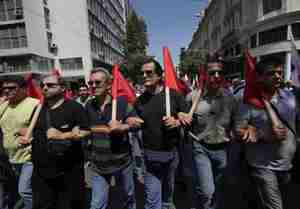 |
Several thousand pro-Communist union members marched through central Athens yesterday to protest the government’s latest austerity measures and plans to sell off state enterprises to appease international creditors. "People should have no illusions . . . [the government] and creditors will sit together to skin the Greek people alive," said a Communist party official. AP
In a nationwide survey of over 1,200 Greek voters, 47.5% said they wanted parliament to reject the reform package being offered by the EU and IMF, while only 34.8% wanted to approve it. The loan package would provide 120 bill euros, but would require public sector layoffs and higher taxes. Reuters
Egypt's Muslim Brotherhood is planning to contest up to 50% of the parliamentary seats in September's elections, and is campaigning among Coptic Christians to gain supporters. The group has been trying to dispel doubts, particularly among Copts, that it is seeking to monopolise the political scene in the new Egypt and set up a purely Islamic state. "The Freedom and Justice Party has developed a platform that gives Copts the chance to be influential leaders within the party," said Rafiq Habib, a Coptic Christian, who has become the vice-president of the new party. Gulf News
In a move certain to increase tensions with Turkey, Syria's troops and gunmen loyal to president Bashar al-Assad stormed the town of Bdama on Saturday, burning houses and arresting dozens. Bdama provides food and supplies to several thousand other Syrians who have fled from the violence in their own villages. Reuters
According to UAE-based political analyst N. Janardhan, the most important rule for a Mideast leader to survive in office is to never, never, never befriend the west. Al-Arabiya
(Comments: For reader comments, questions and discussion,
see the 19-Jun-11 News -- Violence by ethnic Kachins threatens Burma/China relationship
thread of the Generational Dynamics forum. Comments may be
posted anonymously.)
(19-Jun-2011)
Permanent Link
Receive daily World View columns by e-mail
Donate to Generational Dynamics via PayPal
Greece's Papandreou faces a vote of confidence
Friday was another one of those Alice in Wonderland days where all you can do is shake your head in disbelief at the absurd lengths to which desperate European politicians are going.
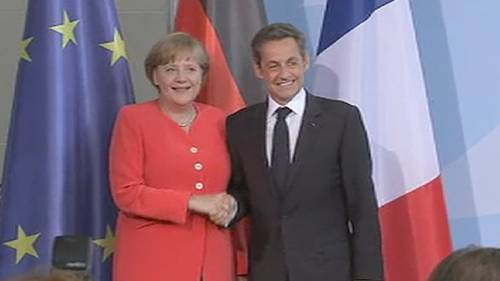 |
Grinning financial experts on TV on Friday were declaring that German Chancellor Angela Merkel had agreed to back down and accept the terms of French President Nicolas Sarkozy, and that a bailout of Greece had been agreed on.
Actually, nothing had been agreed on except for the use of the word "voluntary" in a way that was completely meaningless. But it will allow Merkel and Sarkozy to go back to their respective countries and make contradicting claims.
Greece's total debt is an astonishing 350 billion euros. The Germans are sick of paying to bail out Greece, so they're demanding that Greece "reprofile" or "restructure" its debt, so that Greece will owe less than 350 billion euros, and the investors can absorb the loss. This would be a form of default.
The investors are the banks, with the European Central Bank (ECB) being the biggest bondholder, so the ECB is dead set against default by any name. The French are on the side of the ECB.
There's an even bigger problem with any kind of default. Recall that a credit default swap (CDS) is an insurance policy that insures against the default of a bond. Any kind of Greek default would trigger a "credit event" or "rating event," that would would require all CDS insurance policies on Greek bonds to be paid off. It is believed that this would require hundreds of billions of dollars in CDS payments, causing a chain reaction of bankruptcies.
Therefore, on the one hand Greece MUST default, but on the other hand, a default would be catastrophic -- according to whom you believe.
So Merkel and Sarkozy agreed to an Alice in Wonderland compromise that's been in the works for a few weeks. The compromise is that investors will contribute "voluntarily." Suppose you have a 2-year Greek Treasury bond that's due to be redeemed in January. Then in January, instead of redeeming it, you will voluntarily roll it over, and take a 10-year bond in exchange.
And so, as we recently quoted from Euro Intelligence, nobody in their right mind would voluntarily take up any exchange offer of this type, and to the extent they do, the rating agencies, and everybody else will conclude that they have been forced. And if there's any sort of force or coercion, then a credit event will be triggered.
Merkel was satisfied that banks and private creditors should accept some losses, according to Euro News:
"The main principle is a voluntary participation from the banks. That’s an important message for the banks because there are worries that we’re starting a credit crisis and we don’t want to take that risk."
Sarkozy, on the other hand, seems to be satisfied that French banks will accept only small losses, if any. So both sides got what they wanted, even though they wanted opposite things. It's a miracle!
In fact, there was no agreement on anything, since the terms of the bailout were left for another day. There was no attempt to define what "voluntary" meant, for example, or how you get investors to "voluntarily" screw themselves with no coercion.
Those details will have to be worked out "soon," according to Sarkozy:
"We want to act as soon as possible, without fixing a date, but September wouldn’t be 'as fast as possible' and we’ll have other concerns in August, and as we’re already half way through June, so 'as soon as possible' probably means July."
So there you have it. There was absolutely no agreement on Friday, but they put out a silly, meaningless statement about "voluntary" restructuring, and said they'd try to work out the details next month, but they're not sure of the date.
The Eurogroup finance ministers are going to meet in Luxembourg on Sunday. They are expected to approve the next tranche of last year's bailout, even though Greece's economy has gotten worse in the last year, and has not met the conditions for receipt of this money. But the alternative is immediate bankruptcy by Greece, with all the consequences described above, and so Greece will just get the money, probably with no conditions attached. This will permit Greece to pay its bills through September, and that will give the Europeans time to figure out the details of the "voluntary restructuring."
As we described a couple of days ago, Greece's government was in total chaos and close to collapse, partially because of some missteps by Prime Minister George Papandreou in response to the massive street riots earlier this week. Several of Papandreou's ministers resigned, and on Friday, Papandreou appointed a new finance minister, according to Kathimerini. The purpose of the cabinet reshuffle was to quell dissent from people in Papandreou's own Socialist party.
Whether that's enough may be revealed on Tuesday, when Papandreou will face a vote of no confidence in the Parliament. It will effectively be a vote on Panadreou's entire austerity program, which was a condition of the bailout. If Papandreou loses the vote of confidence, it will almost certainly also mean that his entire fiscal austerity program will lose as well, and that could cause Germany to pull out of the bailout package altogether.
Another thing that can go wrong is that Germany's Federal Constitutional Court in Karlsruhe, which will be meeting on July 5 according to Bloomberg, could declare the aid package unconstitutional, and block it.
One thing that was apparent from the commentary on Friday was that there's almost no one left who believes that Greece is going to escape default eventually. In the case of the war in Libya, you can always hope that someone will kill Gaddafi, and everyone will live happily ever after.
But no one believes that the situation with Greece is going to end happily. Between the riots, the no-confidence vote, the court hearing, the Eurogroup meetings, and the investors, this situation could turn into a major world crisis on any day.
Moody's Investors Service on Friday said it may cut Italy's sovereign credit rating, citing such challenges as reforming a rigid labor market while also facing the likelihood of rising interest rates. "Moody's review of Italy's sovereign rating will focus on the growth prospects for the Italian economy in coming years, and particularly the prospects for a removal of important structural bottlenecks that could hinder a stronger economic recovery in the medium term," the firm said in a statement. Reuters
(Comments: For reader comments, questions and discussion,
see the 18-Jun-11 News -- Europeans devise a 'voluntary' bailout of Greece
thread of the Generational Dynamics forum. Comments may be
posted anonymously.)
(18-Jun-2011)
Permanent Link
Receive daily World View columns by e-mail
Donate to Generational Dynamics via PayPal
Israeli navy practices boarding ships in readiness for Gaza flotilla
This morning's key headlines from GenerationalDynamics.com.
 |
In a change of police that's sure to infuriate Beijing, Taiwan now supports the U.S. position on "freedom of navigation" in the South China Sea. China has been claiming as sovereign territory a huge area in the South China Sea, including regions that are clearly the sovereign territory of Vietnam, the Philippines, and other countries. The U.S. has taken no position on these disputes, but insists that that the South China Sea must remain open to all vessels for free navigation. China has taken the position that it must approve the passage of any ships, especially American military vessels, before they can pass through the South China Sea. Taiwan is now taking the U.S. position. The Taiwanese Navy will also send a naval fleet to Taiwan-controlled Taiping Island -- the biggest island in the Spratlys -- on a routine mission soon. Taiwan operates an airstrip with a 3,800-foot-long, 100-foot-wide cement path on Taiping Island. Jamestown
A few days after Vietnam conducted live fire artillery drills in the South China Sea, China's navy has been conducting three days of military exercises, including live fire drills, in the disputed waters of the South China Sea, near the Spratly Islands, which are claimed by several countries. Up until now, all encounters have occurred with non-military vessels, and the possibility of a military confrontation is now increasing. LA Times
There were fresh protests in cities across Syria on Friday, after midday prayers. There were a few hundred protesters in some cities, and tens of thousands in others. There was intense firing by the army in some cities to disperse the protesters. Day Press (Syria)
Israeli naval commandos carried out wide-ranging exercises in the takeover of a large ship, in preparation for a possible raid of the vessels taking part in the Gaza-bound flotilla that is expected to sail in coming weeks. The exercise appeared aimed at avoiding the killing of any of the passengers in case the commandos are ordered to board the ships to stop them from breaking Israel's naval blockade of Gaza. National (UAE)
Reason #1: Over-reliance on property speculation for profits. Reason #5: Local government is hopelessly, intrinsically, deeply corrupt. Business Insider
A TV anchor in Australia was interviewing the Dalai Lama, and decided to tell him a joke. The Dalai Lama had no idea what he's talking about, and there was humiliation all around. I thought it was a pretty good joke, though:
"The Dalai Lama walks into a pizza shop and says, 'Can you make me one with everything?'"
(Comments: For reader comments, questions and discussion,
see the 18-Jun-11 News -- Europeans devise a 'voluntary' bailout of Greece
thread of the Generational Dynamics forum. Comments may be
posted anonymously.)
(18-Jun-2011)
Permanent Link
Receive daily World View columns by e-mail
Donate to Generational Dynamics via PayPal
The GCC versus the Arab League
At this week's meeting of the Gulf Cooperation Council (GCC), Iran was the major topic of discussion among the foreign ministers of the six Arab member nations (Saudi Arabia, the UAE, Qatar, Bahrain, Oman and Kuwait).
 |
In the final communiqué, the ministers said Iran's interference in their affairs comes "through conspiring against their national security, sowing seeds of sectarian discords among these states' citizens," and the actions are a "violation of their sovereignty, independence and principles of good-neighbourliness, as well as relevant international covenants and laws," according to the Gulf News. They also expressed "deep alarm" about Iran's nuclear program.
Iran's response was too cute by half. They refer to the group as the "[P]GCC", which stands for the "[Persian] Gulf Cooperation Council," in order to emphasize that the gulf being referenced is the Persian Gulf, not the Arab Gulf.
And an Iranian Parliament MP is quoted by Iran's Fars news service as saying, "The repeated claims by a number of tiny Persian Gulf littoral states are aimed at currying favor with their Western masters," and that Iran "will not take heed of such baseless accusations." He added that the PGCC is so reliant on the Western powers that they have not issued even one statement in support of the Palestinian and Lebanese people and they are only concerned about Iran's affairs.
Iran's belittling remarks are a sign of the growing influence of the GCC, following the estrangement of Saudi King Abdullah from President Obama, following the latter's humiliation of long-time ally Hosni Mubarak, calling for him to step down in the face of the student protests. This raised the fear the Obama would also call for Saudi King Abdullah to step down, and led to the conclusion that the U.S. could no longer be trusted, especially with regard to the danger from Iran. (See "21-May-11 News -- Saudi Arabia advances Gulf Cooperation Council, further cuts U.S. ties.")
The GCC has taken center stage in two of the major crises facing the Arabian Peninsula: The Bahrain uprising, where the GCC sent in troops to quell the rioting, and the Yemen uprising, where the GCC attempted, unsuccessfully so far, to mediate a peaceful conclusion.
As we've reported, there are ongoing discussions to add Jordan and Morocco as members of the GCC. The addition of Jordan is a good idea, according to an Arab News analysis:
"The deal, observers say, is based on the fact that Jordan, which has a long history of security cooperation with the GCC, can do a lot to safeguard the stability of these nations, especially in the face of external threats. On the other hand, Gulf leaders are aware of the strategic importance of Jordan, which has the longest border with Israel, and supporting economically it will undoubtedly reflect positively on their own national security during these turbulent times.So it is a win-win exchange. Jordan already has hundreds of thousands of its nationals working in Saudi Arabia, the UAE, Qatar, Bahrain, Oman and Kuwait. They are mostly skilled and white-collar professionals who have become the driving force behind key sectors in IT, banking, public administration, education, and media, among others. It goes without saying that expat remittances are an important source of foreign currency inflow for Jordan."
The addition of Jordan and Morocco to the GCC also provides more police power to suppress unrest, according to Mudar Zahran, a Palestinian writer and academic from Jordan:
"On the other hand, both, Jordan and Morocco have a history of pacifying local unrests with their police forces, rather than their armies; these police forces could provide the GCC states with a quick guns-for-hire to suppress unrests and revolts which have already hit some GCC countries such as Bahrain and Oman. Having Jordan joining the GCC would therefore give the cover of legitimacy to Jordan in involving its police force in any GCC country that oppresses protesters. Jordan might find an interest in sending its servicemen to oppress citizens in GCC countries as that might entitle it for more grants from its oil-rich allies who have stopped being so generous with Jordan since 1990 when the late King Hussein politically supported Saddam. Between 1990 and 2003, the year Saddam was toppled, Jordan received free oil from Iraq in exchange of good ties and serving as Iraq's window to the world when it was under UN-imposed trade sanctions. After Saddam was toppled, the new Iraqi government refused to give free oil to Jordan, which has been paying regular market prices for the oil it purchases from the GCC states since then."
The GCC is a council of Sunni Muslim nations, specifically targeted against Iran and Shia Muslims. However, there are two other (mostly) Sunni Muslim organization in the Mideast.
One is the Arab League, which has traditionally united the Arab countries. But today the Arab League is barely functional, according to an analysis by Memri. Indeed, the protests in the Arab world, particularly the Egyptian revolution that brought about the ouster of the Mubarak regime and the popular protests now threatening President Bashar Al-Assad's regime in Syria, have created a leadership vacuum in the Arab world.
Thus, Jordan and Morocco's acceptance into the GCC is, among other things, an attempt by the Gulf states to make the GCC a new inter-Arab political body that will guide moves in the region and replace the Arab League – thus shifting the center of gravity and decision making in the Arab world to the Gulf region, according to the article.
Furthermore,
"It should be noted that, in parallel to the addition of Jordan and Morocco to the GCC, Saudi Arabia has in recent months been working to garner support and aid from additional Sunni countries, namely, Pakistan and Malaysia, in a bid to create a dominant Sunni bloc against Iran. As part of this campaign, Emir Bandar bin Sultan, secretary-general of the Saudi National Security Council, visited both countries in March to meet with heads of state. The meetings appear to have borne fruit: Pakistan and Malaysia have agreed to send troops to Bahrain to help the regime there suppress the anti-regime Shi'ite unrest there – an indication that both countries have in effect joined the Sunni anti-Iranian camp.On March 28, 2011, bin Sultan visited Pakistan and met with Pakistani Prime Minister Yousuf Raza Gilani. Following the meeting, the former called Pakistan Saudi Arabia's "strategic partner," while Prime Minister Gilani said that Pakistan promised to continue to stand alongside Saudi Arabia in all international forums. He added that Pakistan was "interested in tightening up its strategic partnership with Saudi Arabia."
Long-time readers of my web site are aware that for years I've been watching the trend lines to determine the lineups in the coming Clash of Civilizations world war.
It's been apparent for some time that the "Axis" will consist of China, Pakistan and the Sunni Muslim countries, while the "Allies" will consist of the U.S., Japan, India, Russia and Israel.
Iran has been clearly headed for an alliance with the West. Iran's young people are clearly pro-Western and not particularly anti-Israel. Furthermore, Shia Muslims have historically been allied with Hindus versus Sunni Muslims. Those will be the deciding factors when Iran is forced to choose one side or the other.
Some mysteries remain. How will the European countries line up? Perhaps the unfolding Greece crisis will provide some ansers. Where will Egypt and Turkey line up? What about South Korea?
The inclusion of "Sunni Muslim countries" on the "Axis" side has always been a bit vague, but now we have some additional information.
The GCC members are Saudi Arabia, the UAE, Qatar, Bahrain, Oman and Kuwait, and the members-in-waiting are Jordan, Morocco, Pakistan and Malaysia. These countries are not forming an alliance for commerce; it's a Sunni Muslim alliance specifically opposed to Iran and Shia Muslims. We can tentatively assume that the GCC nations will form the core of the Sunni Muslim countries that will be allied with China against the West.
(Comments: For reader comments, questions and discussion,
see the 17-Jun-11 News -- Rise of Gulf Cooperation Council raises concerns in Mideast
thread of the Generational Dynamics forum. Comments may be
posted anonymously.)
(17-Jun-2011)
Permanent Link
Receive daily World View columns by e-mail
Donate to Generational Dynamics via PayPal
Turkey debating invasion of Syria, with support from U.S.
This morning's key headlines from GenerationalDynamics.com.
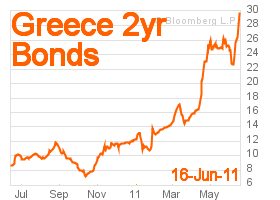 |
The yields (interest rates) on Greece's 2 year bonds briefly exceeded 30% on Thursday, before settling down at just 29.69%. Greek and European officials are desperate, and don't know how to stop this gathering disaster. There was lots of talk on Thursday about a partial bailout. French President Nicolas Sarkozy and German Chancellor Angela Merkel will meet in Berlin on Friday, and are expected to put aside their bitter differences to agree, either on Friday or on a scheduled meeting in Luxembourg on Sunday, to agree to provide Greece with the latest tranche of last year's bailout, even though Greece has not met the required conditions. This stopgap will allow Greece to pay its bills through September. Then another meeting will be held on July 11, to come up with a new bailout agreement to carry through 2012. AFP
If Greece doesn't default, then it will be because the EU will renegotiate last year's bailout with much more liberal terms -- or possibly no terms at all beyond "just take the money." Ireland's Finance Minister Michael Noonan is taking advantage of the situation with Greece to change the terms of Ireland's bailout by demanding investor participation. Portugal has not yet demanded to renegotiate its bailout, but that could happen any time. Bloomberg
"Contagion" from the Greek situation spread to Spain on Thursday, as Spain had to pay investors unsustainably high yields on bonds. Reuters
After three months of widespread slaughter, torture and mutilation of peaceful Syrian protesters by security forces of president Bashar al-Assad, Turkey is considering invading Syria to set up a "security zone" or "buffer zone" on Syrian soil along the border separating the two countries. This would be a major escalation of the crisis, and might lead to military conflict between Syrian and Turkish forces. Telegraph
A couple of days ago, I quoted some analysis from Debka that "military and intelligence sources report that Monday, June 13, the US deployed the USS Bataan amphibian air carrier strike vessel opposite Syria's Mediterranean coast with 2,000 marines, 6 war planes, 15 attack helicopters, including new V-22 Ospreys, and 27 choppers for landing forces aboard." I just received the weekly subscriber-only Debka newsletter, forwarded to me by a subscriber, and it provides some clarification. The US warships aren't there for an American invasion of Libya. They're for defensive purposes. According to reports, the Syrians have threatened to fire missiles deep into Turkey, if Turkish troops enter Syria. According to the Debka report, then the US would provide Turkey with the shield of the AEGIS missile interceptors aboard American warships in the Middle East. Debka
China is sending a large non-military patrol boat into waters where the Chinese have previously had confrontations with Vietnamese and Philippine boats. Chinese media reports emphasized that the voyage is aimed at demonstrating Beijing’s resolve to defend its territorial claims. VOA
Israel will do everything necessary to prevent a planned international flotilla from reaching Gaza, despite the fact the ships will probably not be carrying weapons, a senior military source said. "No ship will get into Gaza," he said. The flotilla is scheduled to set sail before the end of June. Reuters
Prince Harry will be granted his wish to return to Afghanistan as an Apache attack helicopter pilot after completing his training next year. He was hastily withdrawn from a tour of Helmand in 2008, after his deployment became publicly known. Telegraph
Harvard Business School's incoming class will have a substantially smaller percentage of finance professionals than in previous years. Instead, a higher number of students will have manufacturing and technology backgrounds. The article doesn't say so, but I believe that one reason for this is that finance has become a criminal profession. Finance professionals created synthetic securities that were mathematically fraudulent, and sold them as AAA-rated investments. Today, they're charging 30% interest rates, and using the money to pay themselves million dollar bonuses. After financiers did similar things in the 1930s, they were hated for decades. The same thing is happening today. Wall Street Journal (Access)
Oregon may soon outlaw the sale of self-asphyxiation kits. The suicide rate among seniors who have lost their homes, pensions and life savings is increasing, but apparently the Oregon legislature would rather see these people freeze to death in the streets, rather than make their own decisions and control their own lives. Reuters
(Comments: For reader comments, questions and discussion,
see the 17-Jun-11 News -- Rise of Gulf Cooperation Council raises concerns in Mideast
thread of the Generational Dynamics forum. Comments may be
posted anonymously.)
(17-Jun-2011)
Permanent Link
Receive daily World View columns by e-mail
Donate to Generational Dynamics via PayPal
Interest rates on Greece's 2-year bonds exceed 28%
After a day of chaos, the situation is deteriorating rapidly in the streets of Athens, in the Greek parliament, and among the finance ministers in Brussels.
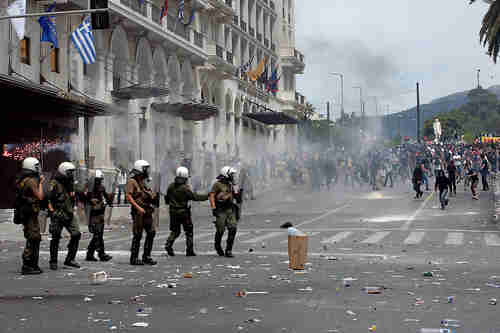 |
Early on Wednesday, angry youths hurled petrol bombs at the Finance Ministry and tens of thousands of protesters marched on parliament to oppose government efforts to pass new austerity laws, according to Reuters. At the same time, unions representing half the 5-million-strong workforce also launched a nationwide strike, shutting government offices, ports, schools and reducing hospitals to skeleton staff.
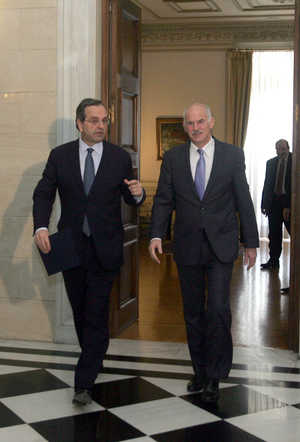 |
In the face of the widespread opposition and violence, Socialist party Greek Prime Minister George Papandreou offered to make way for a national unity government provided it supported EU/IMF bailout plans. But Antonis Samaras, the leader of the opposition conservative New Democracy party, said the conservatives would only take part in a new unity government if it renegotiated the bailout, a condition that's unacceptable to Papandreou.
The result was a "political farce of the first degree," according to an opinion column in Kathimerini.
"Papandreou backed down from his earlier commitment on the grounds that Samaras treated the prospect of cooperation between the two mainstream parties as a public relations stunt. The status of Greece’s political system has suffered irreparable damage as a result.The country’s credibility in the European Union has been tarnished. Greek citizens are simply waiting to see the consequences of this amateurish -- some people would say criminal -- management of the current crisis, and of the nation’s future.
True to character, Papandreou on Wednesday acted in a highly unconventional manner that resulted in chaos. Sure, his intentions might have been good. It seems certain that his contacts with Samaras were made without prior consultation with his close aides.
A “deal” with the New Democracy leader would involve a “renegotiation” of the first and second memorandum -- and that was perhaps not accepted by some of Greece’s international peers.
A tragic Papandreou on Wednesday transformed himself from politician into a fatal hero."
Papandreou will no longer pursue a unity government, but has promised a cabinet reshuffle on Thursday. Yeah, that oughta work.
The people in Athens are furious about the situation they're in. When Greece was granted the first bailout in May of last year, Papandreou demanded severe austerity measures, and promised that this would solve the problem. Now Papandreou is back making even MORE austerity demands -- tax hikes, public sector layoffs, and so forth. How do we know, the Greek people are asking themselves, that Papandreou won't be back a few months from now and demand even MORE austerity?
This situation is just loaded with irony. It was perfectly obvious a year ago that Papandreou was lying. In fact, European officials have done nothing BUT lie in the last year. And when EU officials were caught in a series of major lies about Greece a couple of months ago, Eurogroup chairman Jean-Claude Juncker was quoted as saying, "When it becomes serious, you have to lie," as I reported at the time.
So now Papandreou is being called on his lie. Would Greece have been better off if Papandreou had simply told the truth from the beginning? It's impossible to know, of course, but it's hard to believe the situation would be worse.
There's an old saying that "If you understand a problem, then you're 90% of the way to solving it." That isn't true, because there are many problems for which no solution exists, even when you understand the problem. This is one of those problems. There is no satisfactory solution in existence.
The following graphs of bond yields for Greece, Ireland and Portugal show why:
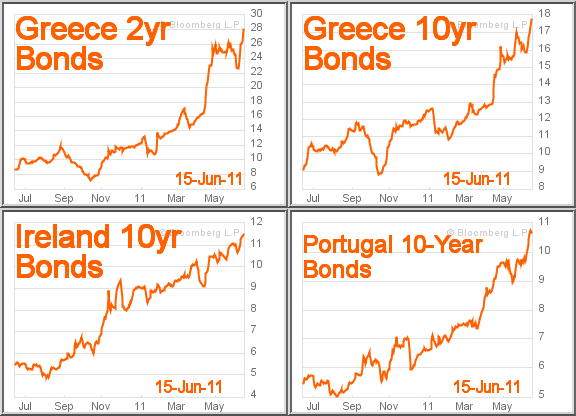 |
These graphs show the yields (interest rates) that investors are demanding to purchase government bonds from Greece, Ireland and Portugal.
When bond yields go up, it means that the market is increasingly convinced that the bonds are going to default. Last year's bailouts of Greece, Ireland and Portugal were supposed to guarantee that these three countries were out of the woods -- that's what all the politicians promised us.
And what's clear from all of these graphs is that the bailouts have made no apparent difference whatsoever. The market has steadily increased bond yields, betting that the countries are all going to default. Last year's bailouts didn't slow this trend at all, and nobody with any sense could possibly believe that the next bailout will make any difference either.
Last year's austerity measures didn't help Greece's economy, either. In particular, Greece is unable to meet the conditions it agreed to in return for last year's bailout, and unless it meets those conditions, it will not receive the next 12 billion euro tranche on the bailout at the end of the month. This will force Greece into bankruptcy.
Incredibly, the yields on Greece's 2 year bonds surged above 28% on Wednesday. Other yields surged as well. It's hard to imagine a greater and more immediate crisis for Europe.
Europeans are taking sides, with the French and the Germans leading the opposing camps, according to the Telegraph. The French want the Greeks to impose even deeper austerity measures, no matter how painful they are -- to the Greeks. The Germans don't want to bail out the Greeks at all, but if they have to, they'll do so only if Greece goes through a partial default, in effect making the investors (mostly European and American banks) bear some of the bailout burden.
A Eurogroup finance ministers meeting a couple of days ago accomplished nothing. According to EuroIntelligence:
"The pattern is repeating itself. The finance ministers cannot agree, and shift the debate up to the European Council, who will present the miracle of an agreement at next week’s European Council (a stage set that unfortunately creates much uncertainty, and actual damage in the meantime).Germany already seems to be backing down. “We will not do anything against the explicit advice of the ECB”, Steffen Kampeter, a state secretary in Wolfgang Schäuble’s finance ministry yesterday said, according to Handelsblatt. And that means that they will at most agree some fig-leaf private sector involvement.
The outcome will be a purely voluntary rescheduling, which is a euphemism for “no rescheduling”, as nobody in their right mind would voluntarily take up any exchange offer, and to the extent they do, the rating agencies, and everybody else, will conclude that they have been forced. At yesterday’s unscheduled eurogroup meeting, Schäuble launched a last-ditch attempt to save his plan, but there was no majority in support. There will be another meeting on Sunday night in Luxembourg ahead of next week’s scheduled meetings, which will be followed by the EU summit. Angela Merkel and Nicolas Sarkozy will meet in Berlin on Friday – a meeting that could pave the way for a compromise."
In other words, allowing Greece to default in any way will be so disastrous that the Germans will back down and agree to a full-scale bailout -- just give Greece whatever money it takes to pay its bills. I guess I have to agree that that seems to be the most likely outcome in the next two weeks.
But I keep coming back to this story because, even more than the situations in Libya and Syria, the situation in Greece could be a major game changer in the next few weeks, no matter what bailout decision is made. The relentlessly increasing bond yields displayed in the graphs above indicate enormous market distortions that the eurozone can't handle much longer. If Germany and France are committed to unlimited free bailout money for Greece, then Germany and France will also be in danger of economic collapse as well. It may well be that the can has been kicked as far down the road as it can go without a real financial crisis -- for Greece, for Europe, for America, and for the world.
(Comments: For reader comments, questions and discussion,
see the 16-Jun-11 News -- Greece's government nears collapse as euro crisis spreads through Europe
thread of the Generational Dynamics forum. Comments may be
posted anonymously.)
(16-Jun-2011)
Permanent Link
Receive daily World View columns by e-mail
Donate to Generational Dynamics via PayPal
Senator Graham: Relations with Pakistan near breaking point
This morning's key headlines from GenerationalDynamics.com.
 |
The fault line between the élite fair-skinned market dominant minority Thai-Chinese and the dark-skinned indigenous Thai-Thai majority laboring class may soon become violent again, after the July 3 election. ( "26-May-11 News -- Thailand election portends more ethnic clashes") The Thai-Thai hero, Thaksin Shinawatra, who was prime minister before the élites finally sent him into exile, is about to make a comeback. His sister Yingluck is leading in the polls, and a Yingluck victory would bring Thaksin back in triumph. However, the Commander-in-Chief of the Royal Thai Army, made a veiled threat of an army coup if Yingluck wins. Spiegel and VOA
Washington politicians are furious that Pakistan has arrested several informants who helped the CIA find Osama bin Laden, allowing America's Navy Seals to fly into Pakistan - without permission -- and get him. While the U.S. wants Pakistan to go after the support network which allowed bin Laden to hide in plain sight, Pakistan instead has arrested and interrogated 5 people suspected of helping the CIA pull off the raid. The Pakistanis have been pushing America away ever since they were humiliated by the raid, and Republican Senator Lindsey Graham says that relations with Pakistan are near the breaking point. CBS News
A survey by the National Federation of Independent Business says that small business hiring prospects by small businesses are some of the worst in history. Small business employ half of the country's private sector workers. NY Times (Access)
Turkey had planned to give full support to a new flotilla whose objective would be to break Israel's sea blockade of Gaza. Nine Turks were killed on a Gaza flotilla a year ago. However, Turkey may not participate in the new flotilla because of the crisis situation in Syria. Haaretz
Syrian refugees keep pouring into Turkey to escape the Syrian army massacres going on in the north of Syria. Turkey's Foreign Minister Ahmet Davutoglu visited two large refugee camps near Turkey's border with Syria. In response to a question, he said, "For us, the Syrians are people who have a common future and destiny with us. Therefore, it is out of the question to close the door to our Syrian brothers after 10,000 [people]. However, when this turns into a big wave, it also has the potential to become a regional and an international matter." Hurriyet
Preparing for the possibility of an al-Qaeda takeover of Yemen, the U.S. is building a secret CIA air base in an undisclosed location in the Persian Gulf region to target terrorists in Yemen. The base will be used to launch armed unmanned drones against terrorist targets, and will be completed by the end of the year. AP
Three members of Orlando's Food not Bombs were arrested Wednesday for the crime of feeding homeless people. Orlando (Florida) Sentinel
(Comments: For reader comments, questions and discussion,
see the 16-Jun-11 News -- Greece's government nears collapse as euro crisis spreads through Europe
thread of the Generational Dynamics forum. Comments may be
posted anonymously.)
(16-Jun-2011)
Permanent Link
Receive daily World View columns by e-mail
Donate to Generational Dynamics via PayPal
US naval movements lead to rumors of intervention
As thousands of families in northern Syria flee from their homes, many across the border into Turkey, army tanks widened the military campaign to crush protests against President Bashar al-Assad, according to Reuters. More than 8,500 Syrians have now fled to refugee camps in Turkey.
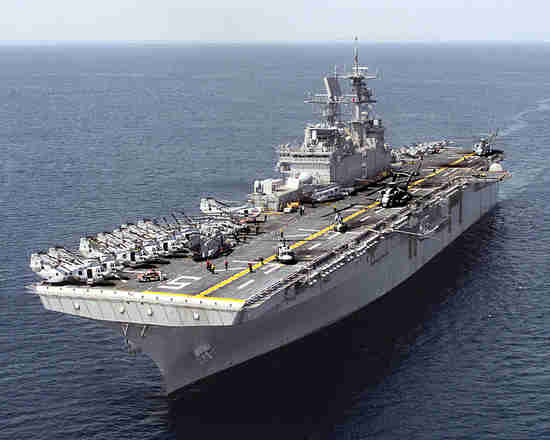 |
Fleeing refugees are reporting that the army is shooting at anything that moves, and that the troops are burning land and crops in a scorched earth policy to subdue people of the region after large protests against iron-fisted rule.
Assad is a member of Alawi religious sect followed by 10% of Syria's population. Alawism is a belief system that has merged Christianity with many Muslim beliefs, as well as traditional pre-Islamic beliefs.
70% of the army is made up of 200,000-300,000 Sunni Muslim conscripts, and there have been some reports that Sunni conscripts are defecting because they don't want to fire on peaceful, unarmed Syrian protesters.
But according to commentary that I heard on al-Jazeera on Tuesday, it would be a mistake to assume that a major mutiny is near.
Although most of the army is Sunni, the Alawi divisions have the best training and hardware, and they will remain loyal to Assad.
There is a lot of pressure for the Sunnis to abandon the regime and join the protesters, but this does not present much of a challenge to the regime unless a rebel army can be fashioned out of these defections, as happened in Libya. A successful challenge would require a critical mass of defectors, and a territory under rebel control, like Benghazi in Libya.
The Assad regime is moving quickly to shore up loyalty among its upper ranks, and to keep control of the entire country. As long as even a portion of the army remains loyal, as has happened in Libya, the Assad regime will stay in place.
 |
On Sunday, Russia's Ministry of Foreign Affairs issued a somewhat confused statement regarding the deployment of the USS Monterey in the Black Sea.
"The entry of the US Navy’s Aegis BMD-equipped Monterey cruiser into the Black Sea to participate in the Ukrainian-US Sea Breeze 2011 exercises has raised several questions for us.The Monterey was sent to European waters as part of the US administration’s Phased Adaptive Approach to building the European segment of its global missile defense system. Phase 1 provides for the deployment in the Adriatic, Aegean and Mediterranean Seas of a group of American ships meant to protect Southern Europe from hypothetical missile threats. According to the official US version, they can also be forward deployed to the Black Sea in case of need, such as aggravation of the situation in the region.
While leaving aside the unresolved question about the architecture of a possible European missile defense system as per the Russia-NATO Lisbon summit decisions, we would like to understand just what the US command meant by “aggravation” as it moved the main striking unit of the emerging territorial missile defense system of the North Atlantic Alliance from the Mediterranean to the east. If we are talking about the usual “visit” to this highly sensitive region, why did they choose a ship armed with this particular version of weapons? And what role was assigned to the Monterey anti-missiles by the scenario of the Sea Breeze 2011 exercise during which “an anti-piracy operation by NATO standards” was being tested and improved?"
There have been several commentaries on this Russian "overreaction" to the participation of the Monterez in the annual joint U.S.-Ukraine military exercises, this year named Sea Breeze 2011. And all of the commentaries indicate that this is less about a missile system, and more about Syria.
According to an analysis by senior Indian diplomat M K Bhadrakumar in the Asia Times, the purpose of deploying the Monterey in the Black Sea is to pressure Russia to back down from its defense of Assad in Syria. Russia has made it clear that it will oppose any U.N. Security Council resolution on Syria, no matter how weak. Russia has a Mediterranean naval base in Syria, and doesn't want to put that at risk, as would happen with a regime change.
But the increasing brutality of the Assad's regime has turned Turkey against Assad, and presents Russia with a big problem:
"By improving ties with Turkey in the past decade, Moscow had been hoping that Ankara would gradually move toward an independent foreign policy. The Kremlin's expectation was that the two countries could get together and form a condominium over the Black Sea. But as events unfold, it is becoming clear that Ankara is reverting to its earlier priorities as a NATO country and US's pre-eminent partner in the region. Ankara cannot be faulted: it made a shrewd assessment and drew a balance sheet concluding that its interests are best served by identifying with the Western move to effect a regime change in Syria.Additionally, Ankara finds it profitable that it identifies with the Saudi approach to the upheaval in the Middle East. The wealth Arabs in the oil-rich countries of the Persian Gulf are willing to send their "green money" to Turkey. Ankara also shares Saudi misgivings about Iran's rise as regional power."
This is resulting in enormous pressure on Russia to turn against Assad, but either way, these events are giving the U.S. the upper hand over Russia in the region.
According to an analysis by Debka, an analyst group that has contacts within Israeli and American intelligence but sometimes gets things wrong, the deployment of the Monterey in the Black Sea is just one part of a major realignment of American forces in the region. The purpose of this redeployment is to be prepared in case a decision is made at some point in the future for U.S. military intervention in Syria.
"debkafile's military and intelligence sources report that Monday, June 13, the US deployed the USS Bataan amphibian air carrier strike vessel opposite Syria's Mediterranean coast with 2,000 marines, 6 war planes, 15 attack helicopters, including new V-22 Ospreys, and 27 choppers for landing forces aboard.Also this week, US naval units went operational in the Aegean, Adriatic and Black Seas as part of the joint US-Ukrainian Sea Breeze 2011 exercise. ...This huge concentration of naval missile interceptor units looks like preparations by Washington for the contingency of Iran, Syria and Hizballah letting loose with surface missiles against US and Israeli targets in the event of US military intervention to stop the anti-opposition slaughter underway in Syria."
According to the analysis, the threat of US military intervention in Syria is being taken seriously by Iran and by Hizbollah, Assad's two major allies in the region. Furthermore, although Turkey's Prime Minister Tayyep Erdogan does not wish to be seen working closely with the U.S. military, it's believed that Washington is coordinating its military movements with Turkey, and that Erdogan quietly agreed to place Turkish bases at US disposal for an operation in Syria.
Soooooooooooooo, where is all this going? Barack Obama promised us that if he were elected President, then he would make sure that we would no longer be fighting in two foreign wars. As we appear to be approaching war number 4, it looks like that campaign promise is being kept.
(Comments: For reader comments, questions and discussion,
see the 15-Jun-11 News -- Syria pursues scorched earth policy, amid rumors of U.S. military intervention
thread of the Generational Dynamics forum. Comments may be
posted anonymously.)
(15-Jun-2011)
Permanent Link
Receive daily World View columns by e-mail
Donate to Generational Dynamics via PayPal
Anti-government protesters flood Yemen's cities
This morning's key headlines from GenerationalDynamics.com.
 |
Hundreds of thousands of Yemen protesters demonstrated in nearly every major city of the country on Tuesday, demanding trial for the family and close aides of the president Ali Abdullah Saleh. These are the largest protests since a bombing attack sent Salah to Saudi Arabia to recover. The US State Dept. is worried that the increasing unrest in Yemen could fuel connections between al-Qaida-linked militants there and al-Shabab insurgents in Somalia. AP
Saleh has reportedly developed a "throat problem," although his overall condition is stable. The exact nature of the throat problem was not disclosed. The June 3 attack left much of his body badly burned. AP
The euro crisis worsened on Tuesday, after a special meeting of euro zone finance ministers failed to make headway on the terms of the bailout of Greece: The Germans insist that Greece should have to go into some kind of default, and the ECB says that any default, by any name, would be a disaster for everyone. Now the Moody's Investors Service is placing France's three top banks on review for possible downgrade, because these banks have big exposure and would lose money if Greece defaulted. Reuters
With the dispute over sovereignty of the islands in the South China Sea growing more bitter every day, Vietnam would like to propose a simple solution: Change the name of the South China Sea to the "Southeast Asia Sea." However, the Philippines has another proposal: When people keep referring to the South China Sea, there is a subliminal message that this sea belongs to a country whose name appears in the name. We in the Philippines should call it West Philippine Sea." Global Post
This is one of these strange stories where the headline says one thing, and the story says something else. Fatah and Hamas representatives say that they'll be announcing a unity government next week, but the text of the story reveals that there's very little agreement on the makeup of the government, especially the choice of Prime Minister. There's also concern that the West will cut off aid to the Palestinians, depending on the people in the government. Jerusalem Post
The Palestinian Authority (PA) is claiming that its having difficulty paying its employees because Arab states are not giving it the financial aid that they promised it. In 2010, he said, the PA only received $280 million of the $960 million promised by the Arabs. In 2011, which is almost half over, it has received no money at all. Israel National News
(Comments: For reader comments, questions and discussion,
see the 15-Jun-11 News -- Syria pursues scorched earth policy, amid rumors of U.S. military intervention
thread of the Generational Dynamics forum. Comments may be
posted anonymously.)
(15-Jun-2011)
Permanent Link
Receive daily World View columns by e-mail
Donate to Generational Dynamics via PayPal
Economics of the Maginot Line
Hey kids, what time is it? It's time to revisit the "Principle of Maximum Ruin." The same principle applies today to America, to Europe and to China.
If you listen to TV or read the newspaper, then you know that mainstream economists, politicians and analysts have been predicting an improving economy for the next quarter each quarter for the last four years. They've been predicting that housing prices would go up next quarter, for each of the last 12-16 quarters.
 |
An item on Bloomberg TV on Monday morning about three major investment funds shows how dangerous such predictions are to the average investor.
Here's the report that accompanied the screen shot above (my transcription):
"[We're seeing] a 'soft patch' in the economy. This has taken the returns of the 3 of the most well known stock pickers in the market.We're talking about Bruce Berkowitz, Kenneth Heebner and Ben Miller, each of them posting losses of about 11-12%. so far this year, for the worst big fund performance tracked by Morningstar. The problem is that they all made sizable bets on an economic recovery. Berkowitz has about 74% of his funds in financial stocks, Bill Miller about a third in financials. Heebner has bet large on automakers, and those groups are all down at double digit percentages this year."
Several years ago, I formulated the concept of the "Principle of Maximum Ruin," after reading the following passage from John Kenneth Galbraith's 1954 book The Great Crash - 1929. It describes what happened in the years following 1929:
"A common feature of all these earlier troubles [previous panics] was that having happened they were over. The worst was reasonably recognizable as such. The singular feature of the great crash of 1929 was that the worst continued to worsen. What looked one day like the end proved on the next day to have been only the beginning. Nothing could have been more ingeniously designed to maximize the suffering, and also to insure that as few as possible escaped the common misfortune.The fortunate speculator who had funds to answer the first margin call presently got another and equally urgent one, and if he met that there would still be another. In the end all the money he had was extracted from him and lost. The man with the smart money, who was safely out of the market when the first crash came, naturally went back in to pick up bargains. ... The bargains then suffered a ruinous fall. Even the man who waited out all of October and all of November, who saw the volume of trading return to normal and saw Wall Street become as placid as a produce market, and who then bought common stocks would see their value drop to a third or fourth of the purchase price in the next twenty-four months. ... The ruthlessness of [the stock market was] remarkable." (p. 108)
Based on this passage, which I've quoted many times, I began referring to the Principle of Maximum Ruin. During a financial crash following the implosion of a generational credit bubble, the markets act in an incredibly ingenious manner, to ruin the maximum number of people to the maximum extent possible. That's what Galbraith is describing.
Today we're seeing the same thing happen again.
When President Herbert Hoover predicted that "Prosperity is just around the corner," it wasn't because he was a stupid man. He was listening to economists of the day who advised him. When President Barack Obama scheduled his "Summer of Growth" political tour a year ago, he was listening to his own economic aides. And it's not just Democrats who are lying. I heard Republican candidate Tim Pawlenty predict that U.S. economic growth will exceed 6% per year for next few years, something that's utter nonsense.
Investors in funds by Berkowitz, Heebner and Miller have lost a great deal of money, and it's not over. They depended on what they heard from the President and his advisers, and what they heard from "experts" on CNBC and Bloomberg TV who earn their seven-figure salaries by lying about price/earnings ratios and telling everyone that it's ok to buy stocks and pay brokers' commissions.
These erroneous predictions are based on mainstream macroeconomic models using data from the 1970s and 1980s. This is the "economics of the Maginot Line," as one commentator said, because you're assuming static data at a time of dynamic changes. As I've pointed out many times, the 70s-80s were dominated by generations of people who had lived through and survived the Great Depression, and so were extremely risk-averse. Those generations are long gone, and it's absurd to apply those static models to today's realities.
Generational Dynamics is to macroeconomics as macroeconomics is to microeconomics. Macroeconomics models aggregate microeconomics models over the entire population, and Generational Dynamics models aggregate macroeconomic models over time.
Macroeconomics models are completely static in time, and economists assume that the same macroeconomics model that worked in the 70s and 80s also work today, an assumption which is completely absurd on its face. As I've pointed out many times, economists have been consistently wrong about everything, at least since 1995. They didn't predict and can't explain the 1990s tech bubble, the real estate and credit bubbles, the financial crisis since 2007, where we are today, and what's coming next year. Their predictions are no better than flipping a coin.
A web site reader has called my attention to a paper by economist Steve Keen called Dude! Where’s My Recovery? (PDF).
The following graph from the paper contrasts the prediction of economic growth from the January 2009 Economic Report of the President (ERP 2009) versus reality:
 |
In the above graph, the blue rectangle is the GDP predicted by the Economic Report of the President in 2009, while the red shows the actual results.
Keen's paper is of great interest to me because it answers an important question for Generational Dynamics theory. I've been saying for years that mainstream economists have erroneously been using data from different generations (Great Depression survivors) in the models they use to analyze today's economy, and that error was causing them to get everything wrong. But I never knew the precise error that the mainstream economists were making, and Keen's paper describes it in detail.
According to Keen, mainstream macroeconomic models do not take private debt into account. Keen quotes both Ben Bernanke and Paul Krugman as justifying this omission for the following reason:
"Neoclassical economists ignore the level of private debt, on the basis of the à priori argument that “one man’s liability is another man’s asset”, so that the aggregate level of debt has no macroeconomic impact. They reason that the increase in the debtor’s spending power is offset by the fall in the lender’s spending power, and there is therefore no change to aggregate demand."
In other words, you can ignore private debt because it cancels out. If I owe you $1000, then I have $1000 less, and you have $1000 more, and so the amounts cancel out and shouldn't affect the macroeconomic models.
Now, before going on with Keen's analysis, let me say how taken aback I am by this. To say that private debt can be ignored because it gets canceled out is near the top of the greatest statements of economic idiocy that I've heard. The amounts definitely do NOT cancel out.
Suppose I have $1,000 and you have nothing. I deposit the $1,000 in the bank, and you borrow the $1,000 from the bank. Then $1,000 has turned into $2,000. That is, I still have $1,000 (it's in my bank account), and you have $1,000 (it's in your pocket).
This is not a joke, or a gimmick, or a trick scenario. This is how money is "created" these days. When you purchase a corporate bond for $1,000, then the corporation gets $1,000 and you get a piece of paper, an asset, worth $1,000. You can't use the bond to buy groceries, but you can use it as collateral for a loan to get cash with which to buy groceries.
Now multiply that little transaction by a trillion transactions, and you can see how tens or hundreds of trillions of dollars were created during the credit bubble. And when that credit bubble burst, then there was less money in the world every day.
Steve Keen turns my informal exposition into a formal analysis by adopting the phrase "Credit Accelerator":
"The Credit Accelerator at any point in time is the change in the change in debt over previous year, divided by the GDP figure for that point in time."
He points out that there are two sources of money:
"[T]here are two sources of money: incomes, and the change in debt. The second factor is ignored by neoclassical economics, but is vital to understanding a capitalist economy. Aggregate demand is therefore equal to Aggregate Supply plus the change in debt."
Keen goes on to distinguish between a "well-functioning economy" versus a "Ponzi Scheme economy":
"Therefore the rate of change of asset prices is related to the acceleration of debt. ... Our great misfortune is that accelerating debt hasn’t been primarily used for that purpose, but has instead financed asset price bubbles. There isn’t a one-to-one link between accelerating debt and asset price rises: some of the borrowed money drives up production (think SUVs during the boom), consumer prices, the fraction of existing assets sold, and the production of new assets (think McMansions during the boom).But the more the economy becomes a disguised Ponzi Scheme, the more the acceleration of debt turns up in rising asset prices. As Schumpeter’s analysis shows, accelerating debt should lead change in output in a well-functioning economy; we unfortunately live in a Ponzi economy where accelerating debt leads to asset price bubbles. In a well-functioning economy, periods of acceleration of debt would be followed by periods of deceleration, so that the ratio of debt to GDP cycled but did not rise over time. In a Ponzi economy, the acceleration of debt remains positive most of the time, leading not merely to cycles in the debt to GDP ratio, but a secular trend towards rising debt. When that trend exhausts itself, a Depression ensues— which is where we are now. Deleveraging replaces rising debt, the debt to GDP ratio falls, and debt starts to reduce aggregate demand rather than increase it as happens during a boom."
As I said above, Keen's analysis fills in a gap in Generational Dynamics theory, by describing exactly where the 1970s macroeconomic models go wrong in the 2000s. Keen doesn't relate his analysis to generational theory, but it's this transition from a "well-functioning economy" to a "Ponzi economy" that occurs as the survivors of the previous financial crisis (the Great Depression) all disappear, leaving behind younger generations that have no fear of unlimited debt acceleration.
The "Principle of Maximum Ruin" says that these young generations have no fear of accelerating debt until the trend exhausts itself, causing them to lose everything in a new Depression. As Keen points out, this lesson has not yet been learned, and the worst of the financial crisis is yet to come.
(Comments: For reader comments, questions and discussion,
see the 14-Jun-11 News -- Revisiting the 'Principle of Maximum Ruin'
thread of the Generational Dynamics forum. Comments may be
posted anonymously.)
(14-Jun-2011)
Permanent Link
Receive daily World View columns by e-mail
Donate to Generational Dynamics via PayPal
Va. Senator Jim Webb urges U.S. action in South China Sea dispute
This morning's key headlines from GenerationalDynamics.com.
 |
Vietnam’s navy has conducted live-fire artillery drills off the country’s central coast, in a challenge to China's claims of sovereignty over almost all of the South China Sea. Vietnamese government officials called the exercises "routine training," but Chinese state media, quoting academics, strongly criticized the drills as "a military show of force to defy Beijing." This is an escalation because it's the first time that military vessels have been brought into the conflict. VOA
Vietnamese consumers are turning their backs on fresh fruits and vegetables from China, giving quality issues, food safety concerns and cost as reasons. For example, Chinese fruits accounted for 30% of imported fruits sold at the market six years ago. That share has shrunk to less than 10% in May 2011. FruitNet
Virginia Democratic Sen. Jim Webb said Monday that the U.S. should take action to make clear it opposes use of force by China in asserting its territorial claims in the South China Sea. AP
Riot police poured into a southern Chinese factory town crowded with migrant workers on Monday to quell a riot by 1,000 protesters. Hong Kong television showed crowds of workers, many from the rural southwestern province of Sichuan running through the streets of Zengcheng in Guangdong province over the weekend. The rioters smashed windows, set fire to government buildings and overturned police vehicles. China has tens of thousands of "mass incidents" every year, any one of which would be world news if it occurred in the U.S. Reuters
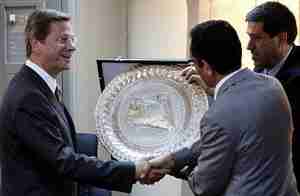 |
Germany on Monday officially recognized Libya's rebel council as the legitimate representative of the Libyan people. Germany joins several other nations in recognizing the rebel Transitional National Council including France, Italy, Qatar and the United Arab Emirates. The Obama administration is supporting the rebel cause but has stopped short of recognition. VOA
An FBI forensics team arrived in Sanaa, Yemen's capital, last week to investigate the attempted assassination of Yemeni President Ali Abdullah Saleh, who is now convalescing in Saudi Arabia. Evidence indicates that the explosion was from a bomb planted inside the mosque where Saleh was praying, not by a mortar shell or rocket, as was initially reported. This indicates that someone in Saleh's inner circle was the perpetrator. Suspicion is falling on Gen. Ali Mohsen al-Ahmar, who publicly defected from the Saleh regime three days after snipers gunned down peaceful protesters in Sanaa, killing more than 50 people. Ali Mohsen is the country's most powerful military leader and a distant cousin of Saleh. Foreign Policy
S&P has further lowered Greece's debt rating three notches, making it the lowest rated country in the world, putting it below Ecuador, Jamaica, Pakistan and Grenada. S&P said that European policymakers looked increasingly likely to impose some kind of restructuring of Greek debt, and that, "In our view, any such transactions would likely be on terms less favorable than the debt being refinanced, which we, in turn, would view as a de facto default according to Standard & Poor's published criteria." However, enormous pressure is increasing on European officials to bail out Greece and avoid default by the end of June. However, German politicians are opposing any bailout of Greece that doesn't impose some sort of default. The ECB has predicted that any kind of default would be disastrous for everyone. Reuters and Bloomberg
Lebanon announced a new government with a 30-member cabinet dominated by Hizbollah and its allies. Hizbollah is considered to be a terrorist group by many in the West. State Department spokesman Mark Toner said, "We'll judge it by its actions. What's important in our mind is that the new Lebanese government abides by the Lebanese constitution, that it renounces violence, including efforts to exact retribution against former government officials, and lives up to all its international obligations." AFP
(Comments: For reader comments, questions and discussion,
see the 14-Jun-11 News -- Revisiting the 'Principle of Maximum Ruin'
thread of the Generational Dynamics forum. Comments may be
posted anonymously.)
(14-Jun-2011)
Permanent Link
Receive daily World View columns by e-mail
Donate to Generational Dynamics via PayPal
Morals versus commercial interests
On Saturday, some 10,000 protesters crowded Pearl Square in Manama, the capital of Bahrain, for the first mass protest since March, according to AP. There was little regime violence when compared to past massacres, but even so, the Fédération Internationale de l'Automobile (FIA) announced that the Formula One Grand Prix race that was scheduled for Bahrain in October would be postponed until next year.
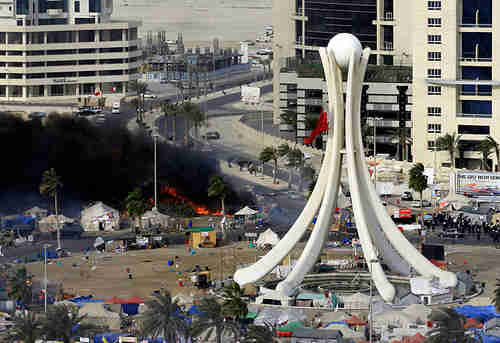 |
The protests began in February, after similar protests in Tunisia and Egypt had caused long-time leaders in both those countries to step down. At that time, word came out of both Bahrain and Saudi Arabia that under no circumstances would protesters be permitted bring down the Al Khalifa family, Bahrain's monarchy. The Saudi-led Gulf Cooperation Council (GCC) sent 1,500 troops into Bahrain to take over non-combat roles, so that Bahrain's security forces would be freed to carry out bloody massacres, arrests and tortures against peaceful protesters.
Bahrain has a Sunni Muslim government, although the country's population is 2/3 Shia Muslim, so almost all of the massacres, arrests and tortures were directed at Shia Muslims.
Although Shia and Sunni Muslims have had good relations for many years, the protests have created a wide sectarian divide, according to Reuters. Thus, it's feared that there could be new violence in Bahrain at any time.
Indeed, a top Bahraini Shia cleric said that trials of dozens of people and the breaking up of Shia religious marches were dragging the country towards destruction, not reconciliation, according to Reuters.
 |
The opening race of Bahrain's Grand Prix had originally been scheduled for March 13, but the FIA canceled it on February 21 because of the protests and the massacres.
Then, much to everyone's surprise, on June 4 the FIA reinstated the Bahrain Grand Prix, scheduling it for October 30, according to the Guardian. The Formula One commercial rights holder, Bernie Ecclestone, said the following:
"It's obvious that everybody feels they need to be safe when we get there. In the end we'll have to wait and see what happens in Bahrain. If there is peace and no problems then I suppose the teams will be all right."
Officials in Bahrain were thrilled:
"By the time the grand prix arrives we will be able to remind the world about Bahrain at its best. The Bahrain Grand Prix has always been a source of national pride and it is an event than transcends politics. Its positive effect will be felt throughout the country."
However, activist groups weren't pleased, especially because it appeared that the decision had been made for commercial reasons:
"Formula One's decision is a kick in the teeth for the Bahraini people. Now F1, plus Red Bull, McLaren, Ferrari, and every other team will be directly linked with a bloody crackdown that's ruined the lives of hundreds of innocent people."
However, on Sunday, the FIA once again canceled the October Grand Prix in Bahrain, but according to The Guardian, the new cancellation had nothing to do with morals:
"What we can say with confidence is that the ultimate decision to cancel the reinstatement had nothing to do with Formula One's distress over the deaths of more than 30 Bahrainis, the alleged arrests of many circuit employees because they happened to be of the wrong Islamic denomination, or the detaining of doctors and nurses who treated those injured in the protests and were thus deemed to have acted against the government's interests. ... Instead the decision was forced upon the FIA by image-conscious sponsors and by the teams' reluctance to make an extra long-haul trip which would shorten their hard-worked staffs' holidays."
In many ways, the tension between morals and commercial interests reflects the tension between morals and political interests that many countries, including the U.S., have felt in dealing with the situation in Bahrain. Manama is the headquarters of the U.S. Navy's Fifth Fleet, with responsibility for the area stretching from the Red Sea to the Indian Ocean, including the Arabian Sea and the entire Persian Gulf.
There was little or no violence in Saturday's protests. A lot of people will be relieved if there isn't any more sectarian violence.
(Comments: For reader comments, questions and discussion,
see the 13-Jun-11 News -- Bahrain's Grand Prix race postponed, despite thousands rallying
thread of the Generational Dynamics forum. Comments may be
posted anonymously.)
(13-Jun-2011)
Permanent Link
Receive daily World View columns by e-mail
Donate to Generational Dynamics via PayPal
Recep Erdogan wins by a landslide in Turkey
This morning's key headlines from GenerationalDynamics.com.
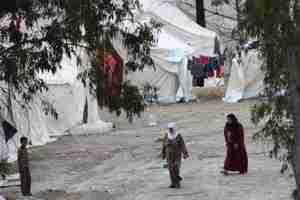 |
Some 2,000 supporters of the Assad regime in Syria rallied on Sunday near Turkey's embassy in Damascus, trying to bring down the Turkish flag. The attempt was repelled by embassy security and Syrian security forces. The protesters are angered because Turkey is providing protection to over 5,000 refugees in the refugee camp in Yayladagi. Zaman
Syria's president Bashar al-Assad is operating on the assumptions that time is on his side and that even if Turkey or other states sever ties with Syria it will still be able to count on cooperation from Iraq, Iran and Russia. Another assumption, presumably correct, is that Syria will not be subject to a Libya-style international military onslaught. This analysis concludes that Assad is likely to survive the current protests. Haaretz
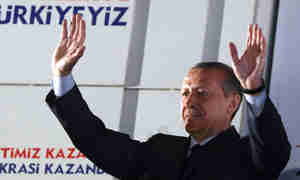 |
Recep Tayyip Erdogan has become the most successful prime minister in the history of Turkey's multiparty system after a landslide victory at the country's general election, though the result falls short of the two-thirds majority needed to rewrite Turkey's 1982 military constitution without having to consult parliament. His centre-right Justice and Development party (AKP -- pronounced "aak party" or "ay-kay party"), in power since 2002, won 49.9% of all votes, giving it 325 seats in parliament. Journalist Oral Çalislar said: "Prime minister Erdogan has already indicated that after the elections, the honeymoon with Syria will be over. Turkey will take a much harder stance, and side with the EU to solve the Syrian problem." The handling of Turkey's large Kurdish minority will also be a key issue. Guardian
It's the two-year anniversary of the alleged rigged reelection of Mahmoud Ahmadinejad as president of Iran, and tens of thousands of people came out on the streets of Tehran for a silent protest. According to one protester, "People were pretending that they were in the streets for a walk but it was obvious that they were out in protest to mark the rigged election in 2009." Security forces attacked the crowd with batons and teargas, and arrested dozens. Guardian
Tehrik-e-Taliban Pakistan (TTP), Pakistan's Taliban terrorist group, is complaining of being "maligned" by "foreign secret agencies" who are blaming TTP for the twin suicide bomb blasts in Peshawar that killed 39 people and injured dozens on Saturday. The attack was one of the deadliest since the killing of Osama bin Laden, for which TTP has promised revenge. A TTP spokesman said, "We did not carry out this attack in Peshawar. It is an attempt by foreign secret agencies who are doing it to malign us." AFP
After yesterday's news that Palestinians are reconsidering their decision to apply to the U.N. General Assembly for a vote on unilateral statehood, it now appears that the Palestinian reconciliation agreement is jeopardized by a dispute over the nomination of Prime Minister Salam Fayyad to head the unity government. Fatah has nominated Fayyad, a former World Bank economist, because he's respected in the West, while Hamas opposes him because of his alleged cooperation with the Israelis against some Hamas members. Reuters
(Comments: For reader comments, questions and discussion,
see the 13-Jun-11 News -- Bahrain's Grand Prix race postponed, despite thousands rallying
thread of the Generational Dynamics forum. Comments may be
posted anonymously.)
(13-Jun-2011)
Permanent Link
Receive daily World View columns by e-mail
Donate to Generational Dynamics via PayPal
Everyone's greatest fear is an uprising on the West Bank
The move to ask the United Nations to recognize a Palestinian state based on 1967 borders is being questioned within the Palestinian Authority itself.
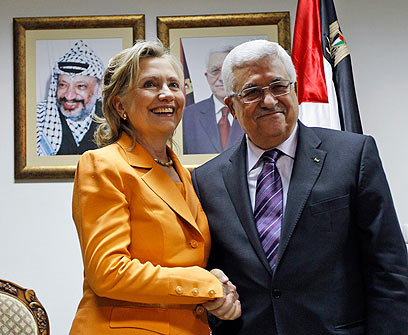 |
Some Palestinian officials are coming to the conclusion that a vote by the United Nations General Assembly would be only a symbolic victory, and would leave them with no way to follow up, according to Ynet. A General Assembly resolution would not be binding. A Security Council resolution would be binding, but it would be vetoed by the United States.
"We are trapped with September," said one Palestinian official. "We don’t know what to do after that." As a result, Palestinian President Mahmoud Abbas would like to find a way to drop the U.N. plans, but feels compelled to continue with the request in order to maintain his credibility, after being so insistent about it in the past.
Instead, Abbas has indicated that he would like to revive the "peace process," along the lines suggested by President Obama's recent Mideast policy speech. Abbas has already indicated an interest in a proposal by France to convene Palestinian and Israeli negotiators in July, according to VOA. It's thought that there's no hope of a revived peace process if the Palestinians go ahead with request for unilateral state recognition.
Not surprisingly, the Israelis would be very pleased by a decision not to pursue a General Assembly vote. The Israelis fear that the Palestinian initiative will harm Israel’s legitimacy and wreck any hope of reviving peace negotiations, according to the Independent. Thus, Israel has been conducting an international diplomatic effort to convince as many nations as possible to oppose the initiative.
These decisions are all occurring in the context of widespread chaos throughout the entire Mideast region, brought about by numerous Arab uprisings. Recently, this has been particularly true in Syria.
An international furor recently arose when Palestinian refugees and their descendants crossed into Israel from Syria, and other places, and were met with live fire from the totally surprised Israel Defense Force (IDF). A similar confrontation occurred last weekend, but international reaction was subdued after it became apparent that it was incited by Syrian president Bashar al-Assad to deflect attention from his own bloody massacres of peacefully demonstrating Syrians.
However, there's at least one Arab uprising development that the Palestinians AND the Israelis are afraid of -- an Arab uprising in the West Bank. There's already been an uprising in Gaza, and Hamas put it down because it was targeted at Hamas. But an uprising in the West Bank would potentially target both the Palestinian Authority and Israel, and then anything could happen.
(Comments: For reader comments, questions and discussion,
see the 12-Jun-11 News -- U.N. move to recognize Palestinian state may be in doubt
thread of the Generational Dynamics forum. Comments may be
posted anonymously.)
(12-Jun-2011)
Permanent Link
Receive daily World View columns by e-mail
Donate to Generational Dynamics via PayPal
China threatens Vietnam with 'firmer actions'
This morning's key headlines from GenerationalDynamics.com.
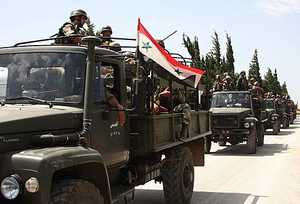 |
The anticipated Syrian military assault on the northern town of Jisr al-Shughour, near Turkey's border, began on Saturday. Although much of Jish al-Shughour is now deserted, with over 4,000 refugees having fled across the border into Turkey, there are still tens of thousands of people left. Witnesses report that government attack helicopters were being used to strafe targets, using large-caliber ammunition. Other reports say that the army is shooting at anything that moves, including animals. VOA
United Nations Security Council deliberations on a resolution condemning Syria's massacre of pro-democracy protesters was snubbed by Russia and China on Saturday. "The Syrians are firing into the crowds and they (Russia and China) don't care," an unnamed Western diplomat said. Reuters
The confrontation between China and Vietnam over the Spratly Islands in the South China Sea is threatening to boil over. ( "10-Jun-11 News -- Vietnam protests Chinese attack on Vietnamese survey ships") On Saturday, a Beijing newspaper called Vietnam's attempt at oil exploration to be the "lowest form of nationalism to create new enmity between the people of the two countries." It said that Vietnam's stance was destroying goodwill among the Chinese public, and will cause China's leadership to respond with firmer actions. The article concluded with the threat, "If Vietnam insists on making trouble, thinking that the more trouble it makes, the more benefits it gains, then we truly wish to remind those in Vietnam who determine policy to please read your history." AP
Yemen's president Ali Abdullah Saleh is still convalescing in a hospital in Saudi Arabia, and still claims that he'll be returning to Yemen soon to take power again. But even if he doesn't return right away, Yemen's key military and security positions are filled by Saleh's relatives and loyal tribesmen. Yemen's Vice President Abed Rabbu Mansur al-Hadi has become acting president and supreme commander of the armed forces, but he's without a power base, and will be little more than a figurehead. Jamestown
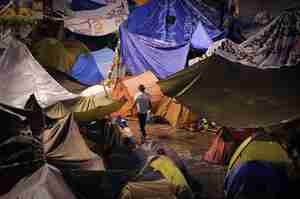 |
In Madrid, Lisbon, Paris, Athens, and other cities, hundreds of thousands of young people have been gathering and protesting joblessness and austerity programs. These are angry young people who are now demonstrating mostly peacefully. As the crisis worsens, expect the crowds to get much larger and much more violent, as happened in 1932. Spiegel
The Alawi religous sect is followed by only 10% of Syria's population, and yet it has successfully maintained total control over Syria's large Sunni and Shia Muslim populations for over four decades. Alawism is a belief system that has merged Christianity with many Muslim beliefs, as well as traditional pre-Islamic beliefs. However, the violence of Syria's crackdown on protesters is allowing Sunni Salafists to turn against the Alawis in Syria, and Syria's branch of the Muslim Brotherhood is leading the armed resistance against the Alawi-dominated military. Jamestown
Lashkar-e-Toiba (LeT) started in the 1980s as a Pakistani sponsored militia to fight the Indians in the disputed regions of Kashmir and Jammu. But it has long outgrown it's narrow initial focus, and now aspires to become a global terrorist threat, matching al-Qaeda in spiration, resources and reach. LeT is believed responsible for the horrific three day terrorist attack on multiple targets in Mumbai, killing 166 and injuring hundreds. South Asia Terrorism Portal (SATP)
Another Sunni terrorist group with international aspirations is the Islamic Movement of Uzbekistan (IMU). The group has linked with the ethnic Pashtun Taliban in Pakistan, and they've infiltrated the government forces in northern Afghanistan, which helps them in pulling off sophisticated attacks, such as the May 28 attack on the officies of the governor of a northern province. RFE/RL
Pope Benedict XVI welcomed over 2,000 gypsies to the Vatican on Saturday. The Pope listened to stories of Nazi persecution and other persecution throughout the 20th century, and said, "The European consciousness cannot forget all the pain! Never again will your people be subjected to harassment, rejection and contempt! For your part, always seek justice, the rule of law, reconciliation and try to never be the cause of another’s suffering!" Catholic News Agency
(Comments: For reader comments, questions and discussion,
see the 12-Jun-11 News -- U.N. move to recognize Palestinian state may be in doubt
thread of the Generational Dynamics forum. Comments may be
posted anonymously.)
(12-Jun-2011)
Permanent Link
Receive daily World View columns by e-mail
Donate to Generational Dynamics via PayPal
The Obama Doctrine
At a Nato meeting in Brussels on Friday, U.S. Secretary of Defense Robert Gates said, in effect, that the Truman Doctrine that's guided American foreign policy since it was formulated by President Harry Truman in 1947 has ended.
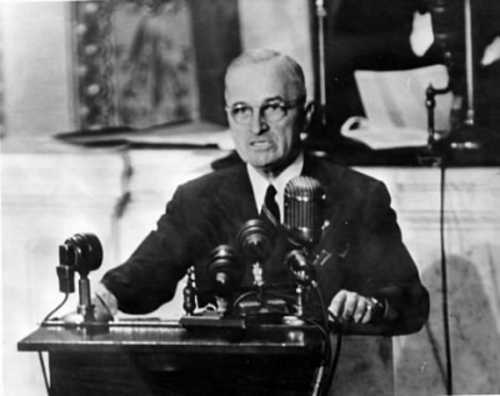 |
Gates' statement was prompted by the disastrous performance of Nato in the Libyan campaign, which was originally promised to take "weeks, not months."
Robert Gates' speech was a withering criticism of European conduct in the Libyan war, and European preparedness in general:
"Though we can take pride in what has been accomplished and sustained in Afghanistan, the ISAF mission has exposed significant shortcomings in NATO – in military capabilities, and in political will. Despite more than 2 million troops in uniform – NOT counting the U.S. military – NATO has struggled, at times desperately, to sustain a deployment of 25- to 40,000 troops, not just in boots on the ground, but in crucial support assets such as helicopters, transport aircraft, maintenance, intelligence, surveillance and reconnaissance, and much more.Turning to the NATO operation over Libya, it has become painfully clear that similar shortcomings – in capability and will –have the potential to jeopardize the alliance’s ability to conduct an integrated, effective and sustained air-sea campaign. ...
[W]hile every alliance member voted for Libya mission, less than half have participated at all, and fewer than a third have been willing to participate in the strike mission. Frankly, many of those allies sitting on the sidelines do so not because they do not want to participate, but simply because they can’t. The military capabilities simply aren’t there. ...
We have the spectacle of an air operations center designed to handle more than 300 sorties a day struggling to launch about 150. Furthermore, the mightiest military alliance in history is only 11 weeks into an operation against a poorly armed regime in a sparsely populated country – yet many allies are beginning to run short of munitions, requiring the U.S., once more, to make up the difference."
One television commentator said that Britain now has fewer planes in its inventory than it had before World War I.
This kind of description reminds me of how unprepared the U.S. was for the attack on Pearl Harbor. The people at that time were almost 100% oblivious to the possibility of attack, even completely ignoring radar sightings of approaching Japanese planes, because they believed that an attack was completely inconceivable. In the Philippines, American General Douglas MacArthur was informed of the Pearl Harbor attack, but still was frozen into inaction for many hours, allowing the Japanese to conduct a devastating attack there as well.
After WW II ended, the public mood was completely different, and wanted to prevent any recurrence. The United States effectively became "policeman of the world" when President Harry Truman announced the Truman Doctrine in a historic speech to Congress in 1947:
"We have considered how the United Nations might assist in [the Turkey / Greece] crisis. But the situation is an urgent one, requiring immediate action, and the United Nations and its related organizations are not in a position to extend help of the kind that is required. ... As in the case of Greece, if Turkey is to have the assistance it needs, the United States must supply it. We are the only country able to provide that help. ...The peoples of a number of countries of the world have recently had totalitarian regimes forced upon them against their will. The Government of the United States has made frequent protests against coercion and intimidation in violation of the Yalta agreement in Poland, Rumania, and Bulgaria. I must also state that in a number of other countries there have been similar developments. ...
I believe that it must be the policy of the United States to support free peoples who are resisting attempted subjugation by armed minorities or by outside pressures.
I believe that we must assist free peoples to work out their own destinies in their own way.
I believe that our help should be primarily through economic and financial aid which is essential to economic stability and orderly political processes. ...
This is a serious course upon which we embark. I would not recommend it except that the alternative is much more serious. The United States contributed $341,000,000,000 toward winning World War II. This is an investment in world freedom and world peace. The assistance that I am recommending for Greece and Turkey amounts to little more than 1 tenth of 1 percent of this investment. It is only common sense that we should safeguard this investment and make sure that it was not in vain. The seeds of totalitarian regimes are nurtured by misery and want. They spread and grow in the evil soil of poverty and strife. They reach their full growth when the hope of a people for a better life has died.
We must keep that hope alive.
The free peoples of the world look to us for support in maintaining their freedoms. If we falter in our leadership, we may endanger the peace of the world. And we shall surely endanger the welfare of this nation."
President John F. Kennedy, in his inaugural address in 1961, echoed the Truman Doctrine:
"Let every nation know, whether it wishes us well or ill, that we shall pay any price, bear any burden, meet any hardship, support any friend, oppose any foe, to assure the survival and the success of liberty.This much we pledge -- and more."
Kennedy's words were, in turn, echoed by Secretary Gates in his Friday speech:
 |
"In the past, I’ve worried openly about NATO turning into a two-tiered alliance: Between members who specialize in 'soft' humanitarian, development, peacekeeping, and talking tasks, and those conducting the 'hard' combat missions. Between those willing and able to pay the price and bear the burdens of alliance commitments, and those who enjoy the benefits of NATO membership – be they security guarantees or headquarters billets – but don’t want to share the risks and the costs. This is no longer a hypothetical worry. We are there today. And it is unacceptable."
Gates is specifically repudiating Truman's and Kennedy's words. It's no longer acceptable for America to be the only country willing to "pay the price and bear the burdens" that the former presidents talked about. Europe will have to do the same.
Gates said that the situation has worsened every year:
"Part of this predicament stems from a lack of will, much of it from a lack of resources in an era of austerity. For all but a handful of allies, defense budgets – in absolute terms, as a share of economic output – have been chronically starved for adequate funding for a long time, with the shortfalls compounding on themselves each year."
At its core, Gates is making a generational argument. The generations of World War II survivors were willing to "pay any price, bear any burden" to make sure that nothing so horrible could happen again, but the generations growing up after the war do not feel the same way:
"With respect to Europe, for the better part of six decades there has been relatively little doubt or debate in the United States about the value and necessity of the transatlantic alliance. The benefits of a Europe whole, prosperous and free after being twice devastated by wars requiring American intervention was self evident. Thus, for most of the Cold War U.S. governments could justify defense investments and costly forward bases that made up roughly 50 percent of all NATO military spending. But some two decades after the collapse of the Berlin Wall, the U.S. share of NATO defense spending has now risen to more than 75 percent – at a time when politically painful budget and benefit cuts are being considered at home.The blunt reality is that there will be dwindling appetite and patience in the U.S. Congress – and in the American body politic writ large – to expend increasingly precious funds on behalf of nations that are apparently unwilling to devote the necessary resources or make the necessary changes to be serious and capable partners in their own defense. Nations apparently willing and eager for American taxpayers to assume the growing security burden left by reductions in European defense budgets."
This raises the following question: What is President Barack Obama's policy? On March 28 of this year, Obama gave a speech about Libya, in which he described what's being called "The Obama Doctrine," and some in the administration have referred to it as "leading from behind":
"It’s true that America cannot use our military wherever repression occurs. And given the costs and risks of intervention, we must always measure our interests against the need for action. But that cannot be an argument for never acting on behalf of what’s right. In this particular country -– Libya -- at this particular moment, we were faced with the prospect of violence on a horrific scale. We had a unique ability to stop that violence: an international mandate for action, a broad coalition prepared to join us, the support of Arab countries, and a plea for help from the Libyan people themselves. We also had the ability to stop Qaddafi’s forces in their tracks without putting American troops on the ground.To brush aside America’s responsibility as a leader and -– more profoundly -– our responsibilities to our fellow human beings under such circumstances would have been a betrayal of who we are. Some nations may be able to turn a blind eye to atrocities in other countries. The United States of America is different. And as President, I refused to wait for the images of slaughter and mass graves before taking action. ...
Of course, there is no question that Libya -– and the world –- would be better off with Qaddafi out of power. I, along with many other world leaders, have embraced that goal, and will actively pursue it through non-military means. But broadening our military mission to include regime change would be a mistake.
The task that I assigned our forces -– to protect the Libyan people from immediate danger, and to establish a no-fly zone -– carries with it a U.N. mandate and international support. It’s also what the Libyan opposition asked us to do. If we tried to overthrow Qaddafi by force, our coalition would splinter. We would likely have to put U.S. troops on the ground to accomplish that mission, or risk killing many civilians from the air. The dangers faced by our men and women in uniform would be far greater. So would the costs and our share of the responsibility for what comes next.
To be blunt, we went down that road in Iraq. Thanks to the extraordinary sacrifices of our troops and the determination of our diplomats, we are hopeful about Iraq’s future. But regime change there took eight years, thousands of American and Iraqi lives, and nearly a trillion dollars. That is not something we can afford to repeat in Libya."
It's almost embarrassing to read these words today, almost three months later, and we can see the reason for Robert Gates' gloomy assessment on Friday. He was ridiculing Nato's catastrophic weakness. But in my opinion, he was also warning the world that that the generations growing up after World War II, as represented by the young, naïve, Gen-X President Barack Obama, don't know what's going on, and cannot be counted on to do what the WW II survivors COULD and DID do: follow the policy doctrine that they passionately announced only a few weeks earlier.
(Comments: For reader comments, questions and discussion,
see the 11-Jun-11 News -- Defense Sec'y Robert Gates repudiates the Truman Doctrine
thread of the Generational Dynamics forum. Comments may be
posted anonymously.)
(11-Jun-2011)
Permanent Link
Receive daily World View columns by e-mail
Donate to Generational Dynamics via PayPal
Bitter EU disputes escalate over Greece bailout
This morning's key headlines from GenerationalDynamics.com.
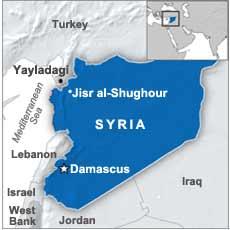 |
Turkey's Prime Minister Recep Tayyip Erdogan has now condemned, in the harshest terms, the man he used to call "a good friend of mine." Referring to Syrian president Bashar al-Assad, as well as his younger brother Maher, he said, "Sadly, their actions are inhumane. The savagery right now... think about it, the images they are playing in the heads of the women they kill is so ugly, these images are hard to eat, hard to swallow." He indicated that he now supports a UN Security Council resolution condemning Syria -- a reversal of his previous position. Zaman and Al-Jazeera
Nearly 3,000 Syrians have fled into southern Turkey, into the refugee camp at Yayladagi, fearing a military assault by regime armed forces, but Turkey now fears that thousands may turn into hundreds of thousands of refugees. Turkish officials have neither confirmed nor denied a report that they have drawn up plans for an operation that would send several battalions of Turkish troops into Syria itself to carve out a "safe area" or "buffer area" for Syrian refugees inside Assad’s "caliphate." From the point of view of Generational Dynamics, Syria is in a generational Awakening era, and can't have a crisis civil war at this time. However, there's nothing stopping Syria from becoming the theatre of a proxy war between other countries which, like Turkey, are in generational Crisis eras. Zaman
Syrian security forces dealt brutally with demonstrations in cities across Syria on Friday. Thousands of residents of Jisr al-Shughour have been fleeing, many into Turkey. A military siege is unfolding in the town. Military forces moved into the town after the government said "armed gangs" in the region had killed 120 security personnel. VOA
Greece's Finance Minister Giorgos Papaconstantinou presented on Friday a fiscal plan to save 4 billion euros by 2015, in part by cutting some 150,000 jobs in the public sector. Papaconstantinou's plan would abolish public bodies that no longer serve a purpose. Kathimerini
A bitter political fight has broken into the open between Jean-Claude Trichet, president of the European Central Bank (ECB), and Wolfgang Schäuble, Germany's Finance Minister. The ECB position is that Greece should be bailed out by European taxpayers, and that investors should not lose any money on their investments. Since most of the investors are banks (in Europe and the US), the ECB position is that all the banks should be protected. The German position is that they're not going to spend hard-earned German taxpayer euros on Greece unless investors also contribute -- which would mean that Greece would have to go into some form of debt default (though it would be given a different name, such as "reprofiling" or "soft restructuring"). Trichet has raised the stakes by refusing ECB participation in any bailout that involves default, while Schäuble told Germany's parliament that he will not back down to Trichet's demands. Somehow or other, an agreement has to be reached by the end of the month, or Greece will be forced into bankruptcy. Bloomberg and Financial Times (Access)
 |
Reporters for the mainstream media (MSM) must be very exhausted after staying up day and night covering the important geopolitical consequences of the hot tweets that Rep. Anthony Weiner sent to various good looking chicks. But their exhaustion didn't stop them from focusing on an even more cataclysmically important story, the release of e-mail messages from Sarah Palin's time as governor. These fine journalists certainly know what's important. Alaska Dispatch
German authorities have confirmed that domestically grown bean sprouts were the most likely source of the E.coli epidemic that has killed 30 people. "It’s the sprouts," said Reinhard Burger, head of the Robert Koch Institute for disease control and prevention. Irish Times
(Comments: For reader comments, questions and discussion,
see the 11-Jun-11 News -- Defense Sec'y Robert Gates repudiates the Truman Doctrine
thread of the Generational Dynamics forum. Comments may be
posted anonymously.)
(11-Jun-2011)
Permanent Link
Receive daily World View columns by e-mail
Donate to Generational Dynamics via PayPal
China accuses Vietnam of escalating sea tensions
Vietnam has reported that China on Thursday of intentionally rammed and damaged a Vietnamese research ship operating within Vietnamese waters, in a "premeditated" incident, according to Bloomberg. The attacked ship was a survey ship operated by Vietnam Oil & Gas Group, and the attackers were three ships: a fishing boat equipped with specialized cable cutting equipment, and two enforcement vessels. Vietnam has lodged a protest.
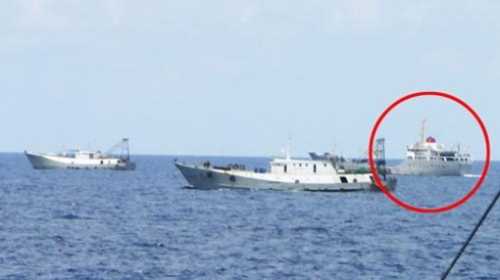 |
The attack took place one day after China announced the deployment of an aircraft carrier, and four days after China's Defense Minister assured Vietnam and other Chinese neighbors that China's military buildup presents no threat to them.
This attack took place just two weeks after a similar Chinese attack on a Vietnamese ship.
On May 26, Chinese vessels attacked the Binh Minh 02, a PetroVietnam survey ship, and cut its cables, according to Vietnam News.
In the new attack, on Thursday, something went wrong, and the cable cutting device on the Chinese fishing vessel became entangled in the underwater cables of the Vietnamese ship, according to Reuters. Two Chinese ships then came to help the fishing vessel, and were able to free it.
The Vietnam Foreign Ministry has handed over a diplomatic note to representatives from the Chinese embassy in Hanoi in protest against China's action, according to Vietnam News. The note demanded that China immediately cease and prevent the re-occurrence of activities that violate Viet Nam's sovereign right to its exclusive economic zone and continental shelf. The note also demanded compensation for damage caused.
The confrontation comes at a time of increasing Chinese belligerence in claiming vast portions of the East China Sea and the South China Sea. China is claiming that its territorial borders extend more than 1,000 miles from the Chinese mainland. They support this claim by a kind of recursive "island chaining" strategy -- they claim one island, then claim all islands within 200 miles of it, then repeat the process with each of those. (See "28-Jun-10 News -- Military tensions increase in South China Sea.")
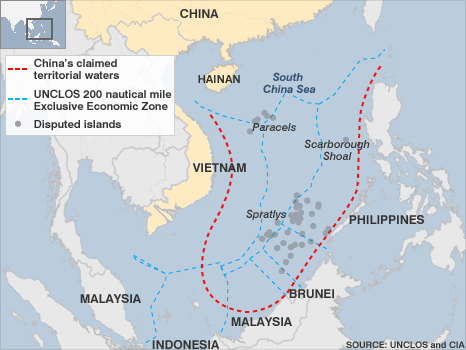 |
The U.S. has also objected to China's aggressive claims in the South China Sea, because China is consequentially claiming control of what are now open sea lanes, and is demanding that any foreign ships, particularly American ships, be forbidden from entering the claimed region without China's permission.
CIA director Leon Panetta, who has been nominated to succeed Defense Secretary Robert Gates, said this week that China appears to be building the capability "to fight and win short-duration, high-intensity conflicts" along its borders, according to Bloomberg.
Panetta's remarks came a day after a NY Times op-ed saying, "China is trying hard to make up for its diplomatic setbacks in 2010, when, in quick succession, it picked territorial fights with Vietnam, the Philippines, Japan and India, and angered South Korea by not condemning Pyongyang's aggressions."
China responded to both statements in an editorial in its state-sponsored organ Global Times. According to the editorial, Panetta has exaggerated Beijing's military threat, and his motive was to exacerbate frictions between China and its neighbors.
The article quotes a Chinese analyst who says that Panetta's comments could be seen as a provocation by the US to exaggerate tensions between China and its neighbors. He adds that although there were some frictions between China and its neighbors, the Chinese government has put a strong emphasis on improving regional relations this year.
The analyst concludes that the possibility of large-scale abiding tensions are small since China will never provoke conflicts and neighboring countries would not intensify frictions.
This is the way it always is with China. They continually preach harmony and getting along, but what they always mean by that is that everyone can get along fine, as long as China always gets its way, and nobody criticizes China.
When China says it will "never provoke conflicts," it's following the advice of Deng Xiaoping, Chinese leader in the 1980s, who said, "Observe calmly; secure our position; cope with affairs calmly; hide our capacities and bide our time; be good at maintaining a low profile; and never claim leadership."
But the bottom line is that China will become increasingly belligerent and militaristic in supporting its claims to vast regions in the South China Sea and India, and other regions including Taiwan, and is preparing for war with the West to secure all of those claims.
China's attacks on Vietnam vessels have provoked large anti-Chinese protests in front of the Chinese embassy in Hanoi. The protests have now taken another step, as computer hackers from Vietnam and China have been attacking web sites run by each other's governments. BBC
Late on Thursday, China accused Vietnam of "gravely violating" its sovereignty and endangering the lives of Chinese sailors. A statement from China's Foreign Ministry says, "It must be pointed out that by conducting unlawful oil and gas surveys in seas around the Wan-an Bank of the Spratly archipelago and by driving out a Chinese fishing vessel, Vietnam has gravely violated China's sovereignty and maritime rights. China demands that Vietnam cease all violations." Reuters
(Comments: For reader comments, questions and discussion,
see the 10-Jun-11 News -- Vietnam protests Chinese attack on Vietnamese survey ships
thread of the Generational Dynamics forum. Comments may be
posted anonymously.)
(10-Jun-2011)
Permanent Link
Receive daily World View columns by e-mail
Donate to Generational Dynamics via PayPal
America's 'covert war' in Yemen expands
This morning's key headlines from GenerationalDynamics.com.
The U.N. Security Council resolution authorizing the humanitarian mission in Libya says that "all necessary measures" could be used to protect civilians. On Thursday evening, a senior Nato military official told CNN that this is now being interpreted as permitting direct targeting of Libyan leader Muammar Gaddafi. CNN
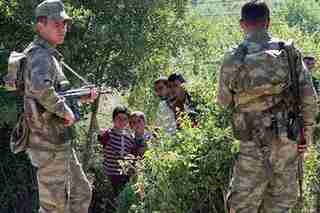 |
Following up on yesterday's report, the hundreds of refugees fleeing into Turkey have now turned into thousands, fearing a brutal revenge attack by Syria's army on the town of Jisr al-Shughur. Eyewitnesses have said that a military column of 60 transporters with tanks and armored vehicles, and 10 trucks loaded with soldiers were headed toward Jisr al-Shughur, and were encircling the town, presumably in preparation for a massacre. CS Monitor
The 'covert war' that we mentioned briefly yesterday seems to be getting less and less covert. With the government apparently disintegrating, Al-Qaeda on the Arabian Penninsula (AQAP) has the opportunity to take control of large areas of Yemen, especially in the south. In order to prevent that, the US has stepped up its covert air war against AQAP, and is reported to have killed militant suspects with US aircraft and pilotless drones. Independent
Well, it's Friday again, and that means that it's time again for massive street protests as people stream out of mosques after midday prayers. This time Yemen should be the big show, after state media said that President Ali Abdullah Saleh would soon be well enough to return from Saudi Arabia, where he's being treated for burn and shrapnel wounds from a bomb blast. There will be anti-Saleh protests as usual, but this time there'll also be mass pro-regime protests, under the slogan, "Loyalty to Saleh" in Sanaa, the capital. Al-Jazeera
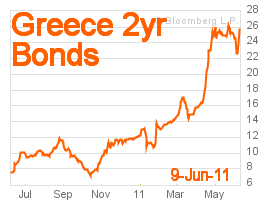 |
Greece’s unemployment jumped to a fresh record high of 16.2% in March, from 15.9% in the previous month, according to data published by the Hellenic Statistics Authority. It was at 42.5% for the 15-24 age group, and so there'll be plenty of fodder for coming anti-austerity riots. Separately, industrial production in April fell 11% from a year earlier. Meanwhile, in Brussels, EU officials continue to bicker on the terms of a bailout, and whether private investors will have to contribute, or whether the taxpayer will pay for the entire bailout. Kathimerini
Yale University professor Robert Shiller, co-author of the S&P/Case-Shiller home price index, says that an additional decline in property values of 10-25% in the next five years "wouldn't surprise me at all." Home prices have already fallen 33% since the 2006 peak, according to the index, after prices more than doubled from 2000 to July 2006 during the bubble. From the point of view of Generational Dynamics, a further substantial decline in housing prices is to be expected, by applying the Law of Mean Reversion to long-term housing price data. Bloomberg.
 |
We've been reporting that China's humongous property bubble has been crashing this year, but now that WSJ is saying it, it's kind of official. In the surveyed cities, real estate prices fell 4.9% in 2011, after rising 21.5% in 2010. The collapse of America's housing bubble has had a disastrous effect on the US and world economy, and the collapse of China's housing bubble, which is now in progress, will have a much greater effect on the world. Wall Street Journal (Access)
(Comments: For reader comments, questions and discussion,
see the 10-Jun-11 News -- Vietnam protests Chinese attack on Vietnamese survey ships
thread of the Generational Dynamics forum. Comments may be
posted anonymously.)
(10-Jun-2011)
Permanent Link
Receive daily World View columns by e-mail
Donate to Generational Dynamics via PayPal
Pressure builds for international response
Turkey's Prime Minister Recep Tayyip Erdogan said Wednesday that his country will will accept the hundreds of refugees fleeing violence in Syria, according to AFP:
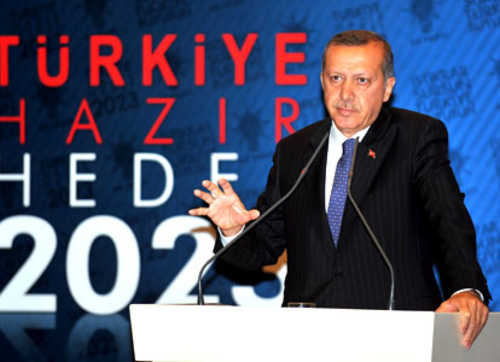 |
"At this point, it is out of question for us to close the doors. The developments in Syria are really sad, we are following them with concern.We wish Syria to be more tolerant to civilians and (further) the reform steps he has already taken, as soon as possible in a more convincing way."
However, Foreign Minister Ahmet Davutoglu said that Turkey is preparing to make security checks for Syrian refugees crossing the border.
"We have taken all necessary precautions in case of a massive flow of crossings. We have to determine their intention [in] seeking refuge.
 |
The refugees are particularly fleeing from the town of Jisr al-Shughur. As we reported recently, 120 Syrian security forces were killed in an ambush on Friday, and in gunfights over the weekend. The Telegraph reports that a convoy of hundreds of tanks and thousands of Syrian soldiers are headed to the city to exact revenge. They are led by Maher al-Assad, the brother of the president Bashar al-Assad, and the most feared man in Syria. Jisr al-Shughur is now a ghost town.
Because of the brutal slaughter that has gone on in Syria since the anti-government protests began on March 15, Britain and France are preparing a resolution to the U.N. Security Council condemning Syria's crackdown, according to VOA.
British Prime Minister David Cameron said,
"There are credible reports of a thousand dead and as many as 10,000 detained and the violence being meted out to peaceful protesters and demonstrators is completely unacceptable. Of course, we must not stand silent in the face of these outrages - and we will not."
In case these words sound familiar, they're not dissimilar to the words that Cameron was using several months ago when Britain and France were proposing a Security Council resolution for a humanitarian mission to prevent the people of Benghazi in Libya from being massacred.
However, as a similar proposal is now being made for Syria, the international climate is quite different -- mainly because of the result of the Libyan resolution. Russian and China abstained on the Libyan resolution, but they've been saying that they're appalled at Nato's "overreaction" in Libya.
The draft resolution being presented to the Security Council is fairly weak, with no talk of sanctions, military action, or referrals to the International Criminal Court (ICC), according to Bloomberg.
Instead, the text simply "condemns the systematic violation of human rights, including the killings, arbitrary detentions, disappearances and torture of peaceful demonstrators, human rights defenders and journalists by the Syrian authorities," and leaves it at that. In an effort to build support, the text adds language condemning violence against Syrian security forces and asking "all sides to act with the utmost restraint."
The French government has gone further than the United States and Britain in condemning President Bashar al-Assad by saying that he has lost his legitimacy to rule and should step down, according to the Irish Times.
France's foreign minister Alain Juppé believes that the resolution has the support of 11 of the 15 members on the Security Council. Russia, which regards Syria as a strategic ally, could veto the text, but Juppé said this was "a risk we are willing to take." He added,
"Russia will probably veto any resolution on Syria . . . so what should we do? We think we must go ahead and circulate the draft resolution at the security council. We think it will be possible to get 11 votes in favour of the resolution and we’ll see what the Russians do.If they veto, they will take that responsibility. Maybe if they see that there are 11 votes in favour of the resolution, they will change their mind."
Turkey was badly burned in handling the situation in Libya. At the beginning, it opposed the Nato humanitarian mission, and supported the Gaddafi regime. Only after Gaddafi's brutality became unbearable did Erdogan have to reverse position and support the Nato action.
Now Erdogan has an even more difficult problem with Syria. Ergodan considers Bashar al-Assad a close personal friend, and has repeatedly urged his friend to institute reforms, but has never called for regime change.
But now, Erdogan is moving in the direction of supporting regime change, according to an analysis by Foreign Policy.
There are many reasons why Erdogan has continued to support Assad. Turkey would like to regain some of the glory that it used to hold as leader of the Ottoman Empire, and Erdogan has been using Assad as a conduit to establish close relations with Arabs. Erdogan's confrontations with Israel have been especially helpful to Erdogan in this regard, especially after the flotilla incident a year ago, and many Arabs consider Erdogan to be a hero.
But Erdogan has the same conflict that Europe, the U.S., Iran, Saudi Arabia, and other countries have, since the beginning of the Arab uprisings: Do you side with "the people," who want freedom and democracy, but may end up triggering violence and instability, or do you side with your old friends, the Mubaraks, Gaddafis, and Assads of the world, who keep everything under control, but do so through torture and mutilation? At what point do you switch allegiance from the torturer to the people? That's not an easy question to answer in real time.
According to the article, Erdogan has attempted to play a delicate balancing act that maintains a good relationship with Assad, while helping the opposition. On June 1, Turkey sponsored a gathering of about 300 Syrian dissidents in the southern Turkish city of Antalya, as an attempt to construct a viable alternative to the Assad family's rule.
However, this is a risky strategy. Erdogan hopes to remain friendly to both sides, but could end up alienating both sides. In other words, the article concludes, Turkey could lose both the Arab people and their rulers if it bets on the wrong horse.
(Comments: For reader comments, questions and discussion,
see the 9-Jun-11 News -- Syrians flee to Turkey as thousands of Assad's troops approach
thread of the Generational Dynamics forum. Comments may be
posted anonymously.)
(9-Jun-2011)
Permanent Link
Receive daily World View columns by e-mail
Donate to Generational Dynamics via PayPal
Senator Kerry turns against Obama's Afghanistan policy
This morning's key headlines from GenerationalDynamics.com.
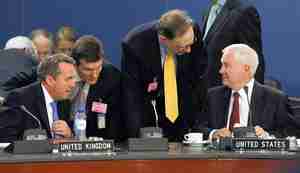 |
Complaining that the humanitarian air campaign in Libya was putting a strain on just seven members, out of the 28-nation alliance, who were carrying the burden. Those seven members are France, Britain, the U.S., Canada, Italy, Denmark and Belgium. Gates called on Germany and Poland to contribute. He also asked Spain, Turkey and the Netherlands, which are participating but not in airstrikes, to step up their role. Gates called the conflict a "war of attrition" and a "psychological war." He said that "crews are getting tired" and that "the stress on aircraft is significant." With only a few alliance members participating, he said, "it doesn't mean they can't continue the operation; they will, but it's stressful." LA Times
First it was Spanish cucumbers. Next it was German bean sprouts. And now German scientists are re-focusing on cucumbers as the source of the Germany's E.coli epidemic that has killed 25 people and sickened thousands. Farmers in Spain are furious about how they were initially implicated, costing them a huge part of their annual income. In Madrid on Wednesday, they gave away for free 30 tonnes of fruit and vegetables in danger of spoiling, in order to prove that Spanish produce is not to blame. Irish Times
With the cause of Germany's E.coli epidemic still undetermined, some health officials say it's just a matter of time before a similar outbreak happens in the U.S. There have been reported cases in the United States, and most of the victims had visited Germany. VOA
The Senate Foreign Relations Committee has issued a report questioning the value of the war in Afghanistan, and claiming that almost $19 billion in U.S. aid to Afghanistan may have undermined the government and promoted corruption. This is significant because Mass. Senator John Kerry has been the principal defender of President Obama's Afghanistan policy among the Democrats. Kerry is well-known as an antiwar liberal, since he compared American servicemen indirectly to Nazis in 1971, after serving in Vietnam. Bloomberg and Senate Foreign Relations Committee
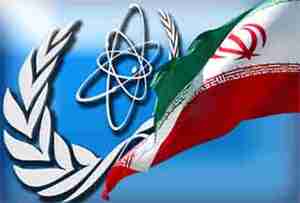 |
On Wednesday, Iran announced that it will speed up uranium enrichment efforts by a factor of three, to provide fuel for Tehran's nuclear medical research reactor. The announcement quotes the head of Iran's atomic energy agency as saying, "This year, under the supervision of the International Atomic Energy Agency, we will transfer 20 percent enrichment from the Natanz site to the Fordow site and we will increase the production capacity by three times." Press TV
Seeking to end the increasingly bitter and widening conflict with president Mahmoud Ahmadinejad, Iran's Supreme Leader Ayatollah Ali Khamenei said, "In the country there are different political views... Do not deprive someone of security if he does not seek regime change or betrayal, or does not want to carry out enemy orders, but does not share your view. Piety is not trampling on one's opponents." Khamenei has been somewhat desperately seeking a return to the national unity of the generational Recovery Era that followed the end of the Great Islamic Revolution and the Iran/Iraq war (1979-1988). However, the young post-war generation is increasingly pro-Western, and doesn't particularly want to see Israel pushed into the ocean. This "generation gap" is widening in Iran's generational Awakeng Era. AFP
A US official has acknowledged that President Ali Abdullah Saleh’s shrapnel wounds are far more serious than previously reported, and that he has burns over 40% of his body, making it unlikely that he can return to power for weeks, if ever. Furthermore, the attack was accomplished by means of a bomb placed by someone in the palace, not by mortar fire from an opposition tribe, as previously reported. Because of the power vacuum, tribal militias have been clashing with government forces in the southern cities of Taiz and Zinjibar, causing a large refugee problem. Financial Times (Access) and Reuters
The U.S. is taking advantage of the power vacuum by intensifying a secret campaign of Yemen airstrikes against militants linked to Al-Qaeda in the Arabian Peninsula (AQAP). Gerald M. Feierstein, the U.S. Ambassador in Yemen met recently with leaders of the opposition, partly to make the case for continuing American operations. Officials in Washington said that opposition leaders have told Feierstein that operations against AQAP should continue regardless of who wins the power struggle in Yemen. NY TImes
 |
The U.N. is saying that time has run out to put in place binding commitments on curbing greenhouse gases, following up to the Kyoto Protocol. Most people are blaming the U.S., the U.S. is refusing to make commitments unless China makes similar commitments, and China is refusing to make any commitments. Climate officials are particularly frustrated because the commitment failure is causing the international carbon exchange market is collapsing. Many bankers had hoped to create a new financial bubble by creating synthetic securities backed by carbon credits, but now their dreams of great wealth won't be realized. Reuters
China has, for the first time, officially acknowledged the construction of an aircraft carrier. The 300-meter-long carrier is being built from a defunct Soviet-era carrier formerly named the Varyag, which was purchased from Ukraine in 1998. "All of the great nations in the world own aircraft carriers -- they are symbols of a great nation," says Qi Jianguo, assistant to the chief of the People's Liberation Army's general staff. Chosun (Seoul)
Mexico's rival drug gangs are in an arms race, and the latest sign is that they're building their own homemade "Mad Max" type heavily armored vehicles that they deploy in clashes with each other. McClatchy
(Comments: For reader comments, questions and discussion,
see the 9-Jun-11 News -- Syrians flee to Turkey as thousands of Assad's troops approach
thread of the Generational Dynamics forum. Comments may be
posted anonymously.)
(9-Jun-2011)
Permanent Link
Receive daily World View columns by e-mail
Donate to Generational Dynamics via PayPal
Tension between Kuwait and Iran
Three weeks ago, a fistfight broke out among seven members of Kuwait's parliament. It started when a Shia pro-government lawmaker referred to Kuwaitis being held by American armed forces at Guantanamo Bay prison as "terrorists." A pro-Sunni Salafist opposition lawmaker took offense at that characterization, according to Reuters, and a sectarian fistfight quickly broke out.
 |
That incident was just a part of the larger story of hostility between Kuwait and Iran.
During the Iran/Iraq of the 1980s, Kuwait sided with Saddam Hussein of Iraq against Iran. After the war ended, Saddam returned the favor by invading Kuwait in 1990, in order to make the country Iraq's 18th province, resulting in the American-led Desert Storm war with Iraq. After Desert Storm liberated Kuwait, Kuwait began reaching out to Iran, though their relationship has never been friendly.
Things began going downhill last year, when Kuwait arrested seven people, charging them with being an "Iranian spy ring" that was stealing secrets about the Kuwaiti army and US troops, and passing the information on to Iran, according to the BBC.
Iran denied involvement, but when a Kuwait court in March convicted them of spying and condemned them to death, Kuwait and Iran broke diplomatic relations, according to AFP. Relations were restored in May, but last month Kuwait seized an Iranian ship smuggling guns into Kuwait, and two Iranians were arrested, according to the Gulf News.
Relations are also strained because Kuwait is a member of the Gulf Cooperation Council (GCC), and has contributed troops to quelling the Shia anti-government demonstrations in Bahrain.
Within Kuwait itself, the government is headed for a deep political crisis, according to Reuters, because of a split within the al-Sabah family that has ruled Kuwait for 250 years.
What Kuwaiti leaders fear most is that the Arab uprisings that have spread across Mideast will reach Kuwait, and perhaps they already have. Two weeks ago, 2,000 young people took to the streets of Kuwait City demanding that the Prime Minister Sheikh Nasser Mohammad Ahmad Sabah be sacked because of corruption allegations, according to the LA Times. Some demonstrators are going further and demanding that a new prime minister be chosen from outside the al-Sabah family, for the first time in 250 years.
Kuwaiti protesters are reportedly staging new rallies next Friday that they have dubbed "Day of Departure."
(Comments: For reader comments, questions and discussion,
see the 8-Jun-11 News -- Sunni versus Shia divide splitting Kuwait
thread of the Generational Dynamics forum. Comments may be
posted anonymously.)
(8-Jun-2011)
Permanent Link
Receive daily World View columns by e-mail
Donate to Generational Dynamics via PayPal
Bitter privatization battles coming in Greece
This morning's key headlines from GenerationalDynamics.com.
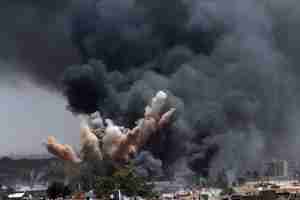 |
Nato raids on Tripoli were significantly escalated on Tuesday, with the heaviest bombing since the beginning of the humanitarian mission in March. Warplanes hit the city several times an hour, sending thundering sound waves across the capital. Libyan leader Muammar Gaddafi said he was ready to unleash 250,000 to 500,000 armed Libyans to swarm across the country to cleanse it from "armed gangs," as he calls the rebels. "We only have one choice: we will stay in our land dead or alive. We will not kneel! We will not surrender. ... Whether we are martyred, killed or commit suicide, we care about our duty towards history." Al-Jazeera
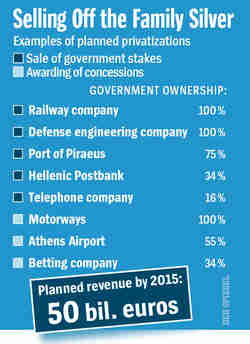 |
With Greece's economy continuing to collapse, and northern EU neighbors balking at further bailouts, Greece has one major card to play in attempting to pay off its debts without defaulting: selling off state-owned assets, for planned receipts of some 50 billion euros. However, this will lead to extremely bitter, and probably violent, political battles, as too many employees making too much money on public payrolls in "workers' paradise" jobs are faced with salary reductions and job losses. Spiegel
An interesting perspective from David Eisenhower, the grandson of President Dwight D. Eisenhower. Foreign Policy Research Institute and Video
(Comments: For reader comments, questions and discussion,
see the 8-Jun-11 News -- Sunni versus Shia divide splitting Kuwait
thread of the Generational Dynamics forum. Comments may be
posted anonymously.)
(8-Jun-2011)
Permanent Link
Receive daily World View columns by e-mail
Donate to Generational Dynamics via PayPal
U.S. Bank Guarantees to European Banks
Many people in Germany, France, Britain and the United States believe that European countries like Greece, Ireland and Portugal should simply be allowed to default, so that we can all get on with our lives.
 |
However, the new Bank of International Settlements Quarterly Review for June 2011, released on Monday, shows that default would not be such a simple matter.
The new BIS report contains new data on cross-border bank exposure that wasn't in previous reports. That is, it answers this question: If one country defaults on its debt, how much money will the banks of other countries lose?
In the following table, I've extracted the exposures of France, Germany, Britain and the U.S. to defaults in Greece, Ireland and Portugal.
Defaulting
country France Germany UK US
----------- -------- -------- -------- --------
Greece $ 65.047 $ 39.923 $ 19.018 $ 41.451
Ireland 45.030 158.548 194.483 105.955
Portugal 31.759 50.183 29.063 46.500
----------- -------- -------- -------- --------
TOTAL $141.836 $227.534 $242.564 $193.906
All amounts are in billions of dollars
(If you want to examine these figures for yourself, look at Table 9E in the "Detailed Tables" portion of the report.)
The above totals are enormous. In the scenario where all three countries defaulted, and investors were forced to take a 50% "haircut," the U.S. would lose $97 billion (half of $194 billion). This would cause a convulsion that would be worse than the Lehman Brothers bankruptcy, especially since the three European countries shown (France, Germany, UK) would lose $306 billion -- and that doesn't include the losses from many other countries around the world.
If you've never read the article on "The bubble that broke the world," now would be a good time to do it. This was written in 1932, and tells a great deal about what's going on today. Note how the collapse of Austria's Credit-Anstalt bank and Germany's Danatbank in 1931 brought about massive unemployment, and social tension that gave rise to Communism and Naziism.
If you look at the figures in detail, you make an interesting and intriguing discovery that the exposure of U.S. banks is different in kind from the exposure of the European banks.
The report distinguishes between two kinds of exposures: "Foreign Claims" are direct losses, such as in the value of bond holdings. "Other potential exposures" include "Guarantees Extended," and a Bank Guarantee is defined online as follows:
"A promise made by a bank to provide payment to another bank or lender on a bond, loan, or other liability in the event of default. Banks often make guarantees on behalf of certain clients to promise payment on loans. Bank guarantees reduce the risk to loans and liabilities and usually improve the credit agency ratings of bonds."
Now, as it turns out, most of the European banks' exposure is in Foreign Claims, while most of the U.S. banks' exposure is in "Guarantees Extended." Now isn't that intriguing?
We know that the Federal Reserve has been helping out European banks for the last three years in all sorts of ways. So a logical guess is that the Federal Reserve has provided over $100 billion in guarantees for these three countries, meaning that the U.S. will have to pay up if these European countries default. That's a surmise, but it seems to be what the BIS report is saying.
And so, Dear Reader, if you've been cheering on defaults by Greece, Ireland and Portugal, then, as my mother used to say, you're threatening to "cut off your nose to spite your face." In other words, when these countries default, it will cause a major worldwide banking crisis, throughout Europe, across the United States, and around the world.
But of course, as we've been saying for many, many months now, default can't be avoided. Default is 100% certain. All the Europeans (and the Fed) can do is continue to "kick the can down the road," by providing more bailouts. In the meantime, more and more debt is being piled on to these countries, so they can make payments on their old debt. Probably the Fed is continuing to provide new Bank Guarantees as well.
What about China? Table 9E doesn't indicate China's exposure to these defaulting countries, possibly because China doesn't want to provide that kind of data. However, I have seen news stories about China investing in Greece and other European countries, so China probably has a large exposure as well.
We're all in a movie theatre watching an incredibly fascinating disaster movie. But the doors are locked, and we can't leave the theatre, even when we begin to realize that we're not just WATCHING the disaster movie -- we're IN the disaster movie, and the disaster movie is happening to us.
(Comments: For reader comments, questions and discussion,
see the 7-Jun-11 News -- BIS report shows high US exposure to European defaults
thread of the Generational Dynamics forum. Comments may be
posted anonymously.)
(7-Jun-2011)
Permanent Link
Receive daily World View columns by e-mail
Donate to Generational Dynamics via PayPal
Syria says that 120 security officers were killed in ambush
This morning's key headlines from GenerationalDynamics.com.
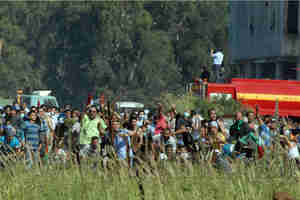 |
The anti-Assad Reform Party of Syria (RPS) is saying that the regime of Syrian president Bashir al-Assad paid hundreds of poverty-stricken Syrian farmers $1,000 each to join anti-Israel "Naksa Day" protests on Sunday, and promised $10,000 to the families of any protester who was killed by Israeli fire. Reform Party of Syria
American and Israeli officials did not repeat the claim that Assad paid each protester $1,000, but both criticized Syria for provoking the fatal protests. U.S. State Department spokesman Mark Toner said, "As we did previously, we condemn what appears to be an effort by the Syrian government to incite events and draw attention away from its own internal issues. And it's clear that such behavior will not distract international attention on Syria's, Syrian government's condemnable behavior on its own citizens." CNN
Syria's government is vowing to retaliate decisively against "armed groups" who killed 120 security forces in an ambush on Friday, and in gunfights over the weekend. The deaths took place in the northern town of Jisr al-Shughour. According to Syria's state TV, "The armed groups are using weapons and grenades ... the people in Jisr al-Shughour are urging the army to intervene speedily." However, some protesters are saying that the gunfight was actually a mutiny by security forces that didn't want to continue firing on unarmed protesters. BBC and Al-Jazeera
Saudi Arabia's royal family had thought that they had finally gotten Yemen's president Ali Abdullah Saleh out of office for good, so that everyone could sign off on the peace plan that the Saudi's had put forth, and the tribal violence could be ended. But apparently Saleh plans to rise from his bed in a few days and return to Yemen to resume his role as president. This is all but certain to renew and worsen the tribal violence. Telegraph
German officials are beginning to appear increasingly incompetent, as they fail to identify the source of the E.coli outbreak that has sickened thousands and killed 22 people. At first they blamed Spain's cucumbers, causing an entire crop to be destroyed, but later retracted that claim. Then, over the weekend, they announced that the problem had been isolated to bean sprouts grown at a farm in northern Germany, but now on Monday they were forced to retract that claim as well. Each such mistake costs farmers a great deal of money, at a time when food prices are skyrocketing. German scientists are back at square one and, in the mean time, there is a growing food scare across Europe. Telegraph
(Comments: For reader comments, questions and discussion,
see the 7-Jun-11 News -- BIS report shows high US exposure to European defaults
thread of the Generational Dynamics forum. Comments may be
posted anonymously.)
(7-Jun-2011)
Permanent Link
Receive daily World View columns by e-mail
Donate to Generational Dynamics via PayPal
Greece's new bailout will be much more expensive than predicted
I was watching a TV interview in Lisbon, Portugal, with an economist, who said the following:
"In Portugal, if you don't want to work, you'll receive money, you'll pay no taxes, you'll receive benefits, you'll get many things for free, and you'll probably receive a house. But if you do want to work, then you're heavily taxed, and you have to pay for everything. So there is no incentive to work."
 |
Well, Portugal's voters agree -- or at least, they SAY they agree. On Sunday, they threw out the left-wing Socialist Party, headed by current Prime Minister José Sócrates, and threw in the center-right Social Democrat Party (PSD), according to AFP.
The PSD is expected to select Pedro Passos Coelho as the new Prime Minister. In his victory speech, Coelho said:
"I want to guarantee to those who are watching us from abroad that Portugal does not intend to be a burden for the future to other countries that lent us the means that we needed today to face up to our responsibilities.We will do everything possible to honour the agreement established between the Portuguese state, the European Union and the International Monetary Fund, to regain the confidence of markets."
 |
The problem is that Passos Coelho cannot possibly do that. Yields (interest rates) on Portugal's 10-year bonds have been rising steadily for a year, and are now close to 10%, indicating that investors increasingly believe that Portugal will default. Portuguese bond yields are not yet as high as the astronomical Greek bond yields, but they're getting there, and there is nothing on the horizon that's going to bring them down.
It's worth remembering at this point that fraud is the norm these days, and politicians lie openly and easily. José Sócrates said for months that Portugal's finances were sound, and that Portugal would never have to ask the EU for a bailout. And he kept saying that over and over again, until just before the moment when he announced that he was asking the EU for a bailout.
And so when Passos Coelho says that he wants "to guarantee to those who are watching us from abroad" that Portugal will not be a burden, he might as well have said, "Portugal's annual government debt is 102% of GDP and we're going to screw as many of you out there as we can, so that we can continue to live well. After all, why should we suffer austerity programs, when we're just going to default eventually anyway?"
That brings us to Greece, the country that lied its way into the eurozone by selling fraudulent synthetic securities manufactured by Goldman Sachs, but didn't tell the EU auditors about them.
Last year, Greece was granted a 110 billion euro bailout, and all the politicians promised that would be enough. However, a couple of weeks ago, it was disclosed that Greece would need another 60-70 billion euros of aid, according to MarketWatch.
Well now an analysis by Der Spiegel shows that the new estimate of 60-70 billion euros is not nearly enough. Greece is going to need at least 100 billion euros more aid, according to the new estimate.
Furthermore, it is still bitterly disputed whether private investors will be required to take a loss in this new aid package, or whether taxpayers will have to bear the entire burden. Some countries, especially Germany, are saying loudly that their taxpayers will bail out Greece unless private investors participate in the aid by losing some of the principal on the bonds they own. The European Central Bank (ECB) has been saying even more loudly that any private investor participation would be equivalent to a debt default, and would be devastating to banks across the eurozone, since many of them have Greek bonds in their vaults.
According to the Spiegel article (rough translation):
"At a meeting of senior officials from the Euro-zone last Wednesday Germany's Financial Secretary Jörg Asmussen rejected any new program put forth by the participants, if private investors didn't make sacrifices as well, despite ECB demands.He stood alone against the rest of the euro zone. Asmussen indirectly threatened at the meeting to force Greece into bankruptcy. He made clear to his colleagues that without involvement of the private sector, there would be no approval by the Bundestag (German parliament) -- and without that, there would be no new program. And without new help, Greece would soon face bankruptcy.
Asmussen had strict instructions from German Finance Minister Wolfgang Schäuble not to agree to any solution where the private investors were unscathed. Money for the new program must not come from public funds alone, Schäuble announced before the meeting. The finance ministers met until 3 am Thursday morning, without result. Now the Finance Ministers will have to reach a final conclusion on their June 20th meeting."
Greece will have to agree to implement harsh austerity measures to get any bailout at all, but now Bloomberg is reporting that a backlash is developing against prime minister George Papandreou of Greece's Socialist Party. Greek's parliament is rebelling, and he may forced to step down, just as Portugal's Sócrates was.
There's an old saying that "Once you understand the problem, you're 90% of the way towards solving it." Actually, that isn't true. This problem is pretty well understood by now, but no solution exists. Just because you understand a problem doesn't mean that a solution even exists, and that's true in this case.
I keep saying that history has been speeding up lately, and we've seen it again this weekend -- in Yemen, in the Golan Heights, and in the deteriorating eurozone. It won't be much longer now.
(Comments: For reader comments, questions and discussion,
see the 6-Jun-11 News -- Portugal throws out Socrates, hoping to avoid Greece's fate
thread of the Generational Dynamics forum. Comments may be
posted anonymously.)
(6-Jun-2011)
Permanent Link
Receive daily World View columns by e-mail
Donate to Generational Dynamics via PayPal
IRS is delaying income tax refunds for adoption tax credit
This morning's key headlines from GenerationalDynamics.com.
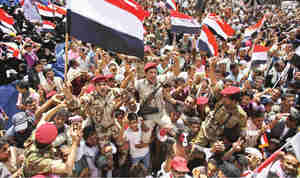 |
The evacuation of Yemen's wounded president Ali Abdullah Saleh to a military hospital in Riyadh in Saudi Arabia has caused wild celebrations on the streets of Sanaa, the capital of Yemen. "5-Jun-11 News -- Yemen's VP takes power, as President Saleh is evacuated to Saudi Arabia") Many supporters are expecting Saleh to return to Yemen, once the medical treatment is over. But Saleh's absense raises the specter of an even more violent power struggle between Saleh's forces and opposition tribes. Saudi Gazette
When protesters crossed Syria's border into the Golan Heights on May 15, the Israel Defense Forces (IDF) were completely unprepared. This time, the IDF was well prepared, but it seems to have made little difference. Sunday was "Naksa Day," commemorating the start of the 1967 Six-Day War, and hundreds of Syrian anti-Israeli protesters attempted to cross the border into the Golan Heights. Syria's government, whose figures are undoubtedly an exaggeration, claims that dozens of protesters were killed. Haaretz
Hundreds of Vietnamese demonstrated in front of China's embassy on Sunday, protesting China's aggressions in the South China Sea. Vietnam says a Chinese vessel intentionally cut a submerged cable of a Vietnamese oil survey ship last month while it was conducting seismic tests. This is just one of a growing number of territorial disputes, as China continues to claim sovereignty over vast regions in the South and East China seas, including public seaways, as well as islands that have been historically claimed by other countries. VOA
At a meeting of 27 nations in Singapore, China sought to allay fears over its military buildup: "We do not intend to threaten any country with the modernisation of our military force. I would like to say that it is not our option. We did not seek to, we are not seeking to and we will not seek hegemony and we will not threaten any country." Peace in our time. Today (Singapore)
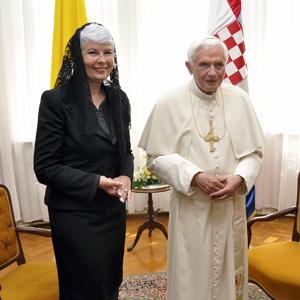 |
At the start of a two-day trip to Croatia, Pope Benedict says he supports Croatia's membership in the European Union (EU) if the mainly Catholic Balkan nation helps to defend Christian values. VOA
About 50 people were wounded in two terrorist bombing explosions in cities in northwestern Pakistan. Both attacks are apparently in revenge for the death of terrorist Ilyas Kashmiri from an American drone strike. BBC
German officials are blaming the E. coli outbreak on a farm that grows bean sprouts in Lower Saxony state. There have been over 2,000 illnesses, and 21 deaths. More women than men have gotten sick, because women eat more bean sprouts than men do. Bloomberg
The IRS is stalling on refunding taxes to people claiming the adoption tax credit. The tax credit is supposed to partially offset the $30,000 cost of adopting a special needs child. CNN
 |
I must admit that I've been ignoring the major scandal going on in the World Soccer Association (Fédération Internationale de Football Association - FIFA), since it had no discernible geopolitical significance. The scandal involves alleged kickbacks over choice of cities to hold the World Cup tournaments. But this is definitely worth a mention. Geopolitical expert and Nobel Peace Prize winner Henry Kissinger is considering an offer from FIFA to join their anti-corruption watchdog committee. Kissinger was also a member of the reform panel set up by the International Olympic Committee (IOC) after the scandal over Salt Lake City's winning bid to host the 2002 winter Olympics. I suppose that if Kissinger can't save FIFA, then no one can. Reuters
(Comments: For reader comments, questions and discussion,
see the 6-Jun-11 News -- Portugal throws out Socrates, hoping to avoid Greece's fate
thread of the Generational Dynamics forum. Comments may be
posted anonymously.)
(6-Jun-2011)
Permanent Link
Receive daily World View columns by e-mail
Donate to Generational Dynamics via PayPal
Collapse of GCC Mediation Efforts
It turns out that the injuries inflicted on Yemen's president Ali Abdullah Saleh were far more serious than anyone was admitting on Friday. There were injuries to his head and face, and shrapnel has punctured his lungs, near his heart. We reported that he gave a radio address on Friday, but there are suspicions that someone else gave it for him. He has been moved to Saudi Arabia for medical treatment, according to Al-Jazeera.
 |
In the meantime, Vice President Abed Rabbo Mansour Hadi has taken power, according to CNN. According to the constitution, if Saleh doesn't recover, then Hadi will be in charge for 60 days, at which it will be necessary to hold an election.
Saleh was wounded on Friday, after several weeks of continually escalating violence in Yemen, appearing to approach a civil war between Saleh's forces and forces loyal to the Hashid tribal federation led by Sadiq al-Ahmar, a former Saleh ally, and now a bitter enemy. On Friday, mortar shells hit a mosque in the presidential palace where Saleh and his guards were at midday prayers. Several guards were killed or wounded. Al-Ahmar has denied being responsible for the attack, but the attack itself is considered to a violation of Islamic principles since the target was a mosque.
The Saudi-led Gulf Cooperation Council (GCC) has been trying to mediate the conflict for a number of weeks. On three occasions, Saleh agreed verbally to step down, and promised he would sign the written agreement with those terms. On all three occasions, he made some feeble excuse at the last minute, and refused to sign.
The GCC gave up the mediation effort, but the terms of the agreement that Saleh refused to sign called for Saleh to step down after 30 days, and then turn the government over to Vice President Abed Rabbo Mansour Hadi, who would then call for an election. So, it's now beginning to look like Karma has taken charge, and is forcibly bringing about the the very agreement that Saleh refused to sign.
Yemen is a highly unstable country, and is the headquarters of Al-Qaeda on the Arabian Peninsula (AQAP), currently the most dangerous al-Qaeda-branded jihadist group in the world. Thus, there's a feeling that anything could happen now. Here are some things to watch for in the days to come:
With regard to the last point, there have been calls on all sides for a cease-fire, and one has been brokered by the Saudis. However, that ceasefire is only for a week, and it was already broken on Saturday, according to Xinhua.
(Comments: For reader comments, questions and discussion,
see the 5-Jun-11 News -- Yemen's VP takes power, as President Saleh is evacuated to Saudi Arabia
thread of the Generational Dynamics forum. Comments may be
posted anonymously.)
(5-Jun-2011)
Permanent Link
Receive daily World View columns by e-mail
Donate to Generational Dynamics via PayPal
Generational Dynamics briefing at Fort Devens
This morning's key headlines from GenerationalDynamics.com.
On Saturday, I gave a 90-minute briefing at Fort Devens to a unit of about 40 people, US Army and Navy analysts and planners for the US Army European Command (EUCOM) J-3 Operations center, normally headquartered in Stuttgart. I was invited to give the briefing because "We're all very focused on our jobs, whether it's Russia, the Balkans, the Baltics, etc., and we don't always know a great deal about what's going on in the rest of the world." I sometimes like to say that most people view the world at ground level, while Generational Dynamics views the world from the International Space Station, viewing attitudes and behaviors of large populations and generations around the world. This makes it possible to "connect the dots" between events in different parts of the world. The briefing was exciting for me personally it gave me an opportunity to speak to a group of people who could use these concepts in real time. For anyone interested, I've posted the presentation slides here: http://www.generationaldynamics.com/cgi-bin/D.PL?d=ww2010.p.p604
 |
A U.S. drone strike in South Waziristan in Pakistan's tribal areas has targeted and killed top al-Qaeda commander and chief of the Harkatul Jihad al-Islami (HJI), Ilyas Kashmiri. Moreover, an HJI spokesman confirmed that Kashmiri had been killed. Since 1994, when he organized kidnapping of foreigners in Delhi, Kashmiri has been one of the deadliest and most violent anti-India terrorists to come out of the insurgency in Kashmir/Jammu, the disputed region claimed by both Pakistan and India. Kashmiri has been directly or indirectly associated with many terrorist attacks, including the murder of American journalist Daniel Pearl and the horrific 2008 attacks on Mumbai. Dawn (Pakistan) and Times of India
Two Apache helicopters, launched from the HMS Ocean off the coast of Libya, fired laser-guided Hellfire missiles to destroy a radar installation to the west of the oil port of Braga, then blew up an anti-aircraft gun before their two-man crews returned safely, despite coming under enemy fire from AK47s. The Apaches were sent to the theatre because Libyan humanitarian mission was taking too long to reach its objective (though it's not too clear what the objective is). Telegraph
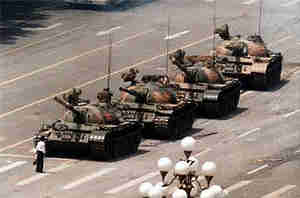 |
On June 4, 1989, the Chinese government sent tanks and soldiers into the square in central Beijing to crush weeks of pro-democracy demonstrations by massacring hundreds of young unarmed protesters. The massacre launched the Falun Gong anti-government movement in China, and the Wild Lily pro-independence movement in Taiwan. On Saturday, thousands of people in Hong Kong and Taiwan commemorated the event with a candlelight vigil. VOA
At a 27-country Security Summit in Singapore on Saturday, U.S. Defense Secretary Robert Gates promised that the U.S. will honor its commitments to Asia, by increasing its port calls, naval engagements and multilateral training with countries throughout the region. The remarks were apparently targeted at an increasingly militaristic China. Gates also said that it was urgently necessary for countries in the region to agree on a "multi-lateral mechanism" to settle territorial disputes with China. "I fear without rules of the road... that there will be clashes in the South China Sea," VOA and AFP
The peace process is dead! Long live the peace process! Palestinian President Mahmoud Abbas has accepted a French proposal to convene Israeli and Palestinian negotiators in Paris in July to discuss reviving peace talks. Israel is considering the proposal. (What's that old saying about people who do the same things over and over, expecting different results?) VOA
As we've previously reported, Palestinian activists planned "Naksa Day" cross-border marches of Palestinian refugees and their descendants from Syria and Lebanon into Israel. Lebanon's march was canceled yesterday, in the face of Lebanese government steps to prevent it. Now, in response to the "setback," Syrian activists announced that their march will be postponed, and that rallies will be held instead. "Naksa Day" commemorates the 1967 six-day war. Jerusalem Post
On Saturday, thousands of left-wing Israelis protested in Tel Aviv, chanting, "Netanyahu says no - we say yes to a Palestinian state." The demonstration included members of The Labor Party, Meretz, Hadash and Peace Now. Jerusalem Post
While the speech by Israel's prime minister Benjamin Netanyahu infuriated Arabs and Palestinians, President Barack Obama's two speeches on Mideast peace left them cold. They applauded Obama's "direct and frontal assault on Netanyahu's hard-line positions." But the failure of Obama to say anything to advance the peace process made the entire message fall flat. Arabs and Palestinians were already disappointed in Obama's lack of action following his Cairo speech, and now they have given up. HuffPost/James Zogby
Egypt has permanently opened the Rafah crossing to allow travel back and forth between Gaza and Egypt, but the gate has been subject to frequent closures. On Saturday, Palestinians traveling to Egypt stormed a gate after waiting for hours in buses. They pushed through the gate, but Egyptians escorted them back into Gaza. CNN
Up until now, Hizbollah's leader Hassan Nasrallah was worshipped in the Arab world, because he was seen as a hero of anti-Israeli resistance, especially after he freed South Lebanon from Israeli occupation in 2000. However, Nasrallah's full-throated support for Syria's Bashar al-Assad has turned Syria's protesters against Nasrallah for the first time. France 24
Syria's protesters are also turning against Iran, a month after a delegation of the Iranian police and Revolutionary Guards went to Damascus and advised Assad how to crush the protesters. Iran's "method" for crushing protesters is very simple, according to the article: Do not fire into the crowd, but make targeted arrests of protesters who are then tortured. In short, it is to terrorize the demonstrators to avoid a bloodbath too conspicuous. (However, a number of recent news reports indicate that Syrian security forces have openly fired into the protesters' crowds.) Nouvel Observateur / Translation
(Comments: For reader comments, questions and discussion,
see the 5-Jun-11 News -- Yemen's VP takes power, as President Saleh is evacuated to Saudi Arabia
thread of the Generational Dynamics forum. Comments may be
posted anonymously.)
(5-Jun-2011)
Permanent Link
Receive daily World View columns by e-mail
Donate to Generational Dynamics via PayPal
It's beginning to look like 2008 all over again
I've often written that as bad as America's economy is, China's economy is in much more trouble. And now, after a week of extremely bad economic news in U.S. housing, manufacturing, and unemployment, it appears that China's economy is also showing signs of heading downward, with major consequences for the rest of the world.
 |
International commodities markets are "starting to look a lot like 2008," according to Standard & Poor's analyst Scott Sprinzen, quoted by Bloomberg.
Recall that China's overheated economy was sucking up commodities early in 2008. But as the Beijing Olympics games approached in August, China's economy sank and China's commodities purchases fell. By the end of the year, trade and transportation had collapsed around the world, and the Baltic Dry Index (a measure of commodities shipping) had fallen an incredibly 95%. As I described it at the time, it was like the science fiction movie, "The Day the Earth Stood Still," except that it wasn't science fiction. (See "World wide transportation and trade sink farther into deep freeze.")
A slowdown in China's economy would have a similar effect today. Commodities prices could esily fall 25-40%, and might fall as much as 75%, according to Sprinzen.
And a slowdown IS occurring. Two surveys released Wednesday reveal that Chinese manufacturers expanded in May at their slowest pace in nine months, according to the Globe&Mail.
CBS Business News blogger Constantine von Hoffman has provided a list of some of the signs that China's economy is melting down:
America and China, two great civilizations that are almost completely foreign to one another, are now locked together, arm in arm, in a death spiral downward that will leave both countries, and all of their neighbors, completely devastated.
(Comments: For reader comments, questions and discussion,
see the 4-Jun-11 News -- China's economy slowing, with possible worldwide consequences
thread of the Generational Dynamics forum. Comments may be
posted anonymously.)
(4-Jun-2011)
Permanent Link
Receive daily World View columns by e-mail
Donate to Generational Dynamics via PayPal
European officials announce hopes for new bailout for Greece
This morning's key headlines from GenerationalDynamics.com.
 |
As the civil war in Yemen spreads, forces of president Ali Abdullah Saleh are having armed clashes with tribal forces loyal to Sheikh Sadiq al-Ahmar. Around noon, mortar shells hit a mosque in the presidential palace compound where Saleh was praying. At least three guards and several other officials were wounded. Saleh was supposed to give a televised address after the incident, but it kept getting postponed, giving rise to speculation that he'd been killed. Finally, in the evening, he gave a radio address to prove that he was still alive. It's assumed that al-Ahmar is responsible for the mortar attack, but his office is denying it. The attack came shortly after Saleh's forces bombed al-Ahmar's home. Al-Jazeera
In probably the worst day of violence in Syria since the anti-government protests began 11 weeks ago, the security forces of president Bashir al-Assad fired live ammunition at tens of thousands of demonstrators who had gathered in Hama, killing 34 people and wounding dozens. Hama is the city where Bashar's father, Hafez al-Assad, crushed an armed Islamist revolt by killing up to 30,000 people and razing parts of the city to the ground. Reuters
The headline on the story reads, "Greece likely to get aid tranche," but when you read the actual story, you realize that this is far from true. After a meeting between Eurogroup president Jean-Claude Juncker and Greek Prime Minister George Papandreou, Juncker said that he expects the next tranche to be provided "under strict conditionality," meaning that private sector investors will have to be included on a "voluntary" basis. It's thought that this means that private holders of Greek debt would "volunteer" to some kind of debt rollover, in which the investors would purchase new Greek bonds when the existing ones mature. It's hoped that this "voluntary" plan will not be a technical default, since that would trigger all sorts of problems. However, this solution is being hotly debated, and agreement among the member states is far from certain. Reuters
Republican House Speaker John Boehner has been scrambling to prevent passage of a resolution, sponsored by Democrat Rep. Dennis Kucinich, to force President Obama to withdraw all US forces from the "humanitarian" mission in Libya. Kucinich's resolution had supporters in both parties. Boehner got it defeated by replacing it with his own non-binding resolution that merely requires the Obama administration to come back to Congress within 14 days with a strategy for the Libya mission. CS Monitor
Palestinian activists had planned a march Lebanon's refugees to the border with Israel on Sunday, to mark the anniversary of the 1967 six-day war. The march was canceled because Lebanese authorities declared the shared border a "closed military zone." Instead, activisits plan strikes across all 12 of Lebanon's Palestinian refugee camps. AP
(Comments: For reader comments, questions and discussion,
see the 4-Jun-11 News -- China's economy slowing, with possible worldwide consequences
thread of the Generational Dynamics forum. Comments may be
posted anonymously.)
(4-Jun-2011)
Permanent Link
Receive daily World View columns by e-mail
Donate to Generational Dynamics via PayPal
Greece to unveil new austerity measures
During the last decade, the norm for bankers in Europe and America has been fraud. The main vehicle was the creating and selling of mortgage-backed synthetic securities based on computer models that were provably fraudulent, paying off ratings agencies to give them AAA ratings, and selling them to investors, collecting fat fees.
 |
In the giddy middle of the last decade, when there was plenty of money sloshing around thanks to the massive credit bubble, anything was OK. Everybody was screwing investors, but who cares? They could just borrow more money. Regulators and prosecutors didn't care, since they were paying themselves fat salaries anyway.
But now that the credit bubble has burst, and there is less money in the world every day, it's time to pay the piper, as the saying goes. People are still screwing one another, but now it's a lot more vicious, as people scramble with one another to get hold of the remaining pools of money. Once again, it's the bankers who are in the lead, charging 30% interest rates and using the money to pay themselves million dollar bonuses.
The desire for real vengeance is growing. This is a generational change. The Boomers and Gen-Xers who formerly trusted everyone now trust no one. The ones who were screwed now want to screw others. This is the first time that generational change of this type has occurred since the 1930s.
So, on Thursday, Manhattan (New York) District Attorney Cyrus Vance subpoenaed Goldman Sachs, demanding documents relating to the investment bank's activities leading up to the financial crisis, according to the AP.
It's not known whether the demands are for a civil or criminal action, but it's assumed that the demand is related to civil charges of fraud brought by the SEC a year ago for doing the following:
This deal was consummated in early 2007, just before the time that the global financial crisis began.
It's now four years later. The U.S. Justice Department has refused to prosecute Goldman Sachs for this deal. You can guess why.
What's interesting about this situation is that the Manhattan District Attorney is pursuing the case. He won't be bound by the political considerations of the U.S. Justice Department.
There are three possible criminal charges that can be brought against Goldman Sachs, according to Fox Business News:
We're now in a generational period similar to the 1930s. At that time, the Senate investigate bank fraud. But since the Republicans and Democrats could never have prosecuted anyone, they brought in a politically independent lawyer, Ferdinand Pecora, to question the bankers.
It was less than a month ago, that billionaire Raj Rajaratnam was convicted by a jury of insider trading. (See "12-May-11 News -- Raj Rajaratnam conviction raises hopes of Pecora Commission revival.")
Let us hope that we're going to see an increasing number of these criminal charges and convictions. If history is going to repeat the 1930s financial crisis, then let's hope history repeats the 1930s in a different way as well, by sending these bankers who committed fraud to jail.
 |
One of the reasons that the Germans and other Europeans are furious with the Greeks is that the Greek government repeatedly lied and committed fraud in order to get into the eurozone, by selling fraudulent securities created by Goldman Sachs, and then hiding the transactions from the EU. Now Greece has to beg for bailout money. On Friday, Prime Minister George Papandreou is to present Greece’s midterm fiscal plan and its privatization program to the head of the Eurogroup, Jean-Claude Juncker. It's expected that the EU and IMF will bail Greece out again because Greece, like Goldman Sachs, is too big to fail. Kathimerini
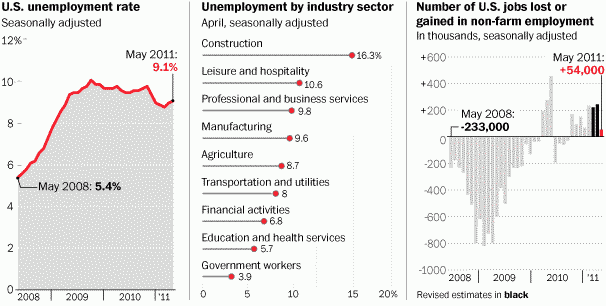 |
Economists were literally stammering in confusion on TV on Friday morning in reaction to the Labor Dept.'s devastatingly bad jobs report for May. This is MUCH, much worse than even pessimistic mainstream economists predicted, and it comes after a week of equally bad housing and manufacturing data. One anchor asked the economist why the economy was "hitting a brick wall," and she had no idea.
As I've said many times, mainstream economists did not predict and can't explain the tech bubble of the 1990s, the global real estate and credit bubbles of the 2000s, the financial crisis that began in 2007, or where we are today, and they don't have the VAGUEST idea where we'll be next year.
This is a generational issue. Economists are using macroeconomic models from the 1970s and 1980s, when the Great Depression generations were still in charge. You'd have to be a complete moron to use those models today, but that's what mainstream economists do, and that's why they're wrong every time, and why they're completely baffled every time. It's really remarkable to watch this going on.
The only macroeconomic models that have any hope of being correct would have to be based on 1930s data, because that's the generational era we've returned to. We are still headed for a full-scale worldwide stock market panic and crash, below Dow 3000. This could happen next week, next month, or next year, but it's coming with certainty. And if the economy continues to "hit a brick wall," then it may happen soon. Washington Post
(Comments: For reader comments, questions and discussion,
see the 3-Jun-11 News -- Manhattan prosecutor subpoenas Goldman Sachs' records
thread of the Generational Dynamics forum. Comments may be
posted anonymously.)
(3-Jun-2011)
Permanent Link
Receive daily World View columns by e-mail
Donate to Generational Dynamics via PayPal
Moody's threatens to put U.S. government's rating under review
This morning's key headlines from GenerationalDynamics.com.
 |
Palestinians activists are planning a repeat of the May 15 action where thousands of unarmed Palestinian refugees and their descendants came into Israel across three borders, from Lebanon, Syria and Gaza. Three of the demonstrators were killed. (See "16-May-11 News -- Israeli army fires on unarmed protesters crossing three borders.") The new action is planned for Sunday, June 6, commemorating "Naksa," the Arab loss in the 1967 six-day war. The Israel Defense Forces (IDF) were completely unprepared for the May 15 action, but they will be prepared for Sunday's action. Jerusalem Post
Israel has warned Syria and Lebanon against permitting any Naksa-related protests near the Israeli border. The Lebanese Army has declared the area around Lebanon's border with Israel a closed military zone, "to stop any escalation at the Lebanese border with Israel that could take place on Naksa Day." Haaretz
Tensions continue to build between the Palestinian refugees and Israel. An article published by the Palestinian Authority refers to the Palestinian refugees as the new "Palestinian nuclear weapon." This weapon, according to the article, was the brave young people loyal to their ancestral homeland who do not fear risking their lives to actualize their rights to a state, freedom, and independence – a weapon he described as more powerful than Israel's entire arsenal. Memri
Jordan's prime minister Ma'rouf Al-Bakhit declared that Jordan would not consent to the establishment of a Palestinian state that did not include a guarantee for the right of return. Memri
Hamas cheered Egypt's decision last week to permanently open the Rafah border crossing between Gaza and Egypt. But now relations between Hamas and Egypt are strained again, as the Egyptians have decided to limit the number of Palestinian travelers to between 350 and 400 each day. Hamas also accused the Palestinian Authority of asking the Egyptians to impose the limits. Jerusalem Post
Depending on the results of the negotiations in Congress to raise the statutory debt limit, Moody's Investors Service threatened to place the US government's rating under review for possible downgrade. Reuters
An E. coli outbreak is ravaging Europe and other parts of Europe. There have been thousands of infections, and a few deaths. The aggressive intestinal bacteria is a mutant form that scientists have never seen before. Spiegel
Huge explosions are shaking Yemen's capital Sanaa. Cannons and tanks are shelling positions of tribal fighters, especially those of Sadeq Al-Ahmer, the sheikh of Hashid. Yemen Post
Japan's Prime Minister Naoto Kan made a deal with lawmakers in his own party, including a promise to resign as soon as the March 11 Fukushima nuclear disaster has been stabilized, and survived a vote of no confidence. Yomiuri
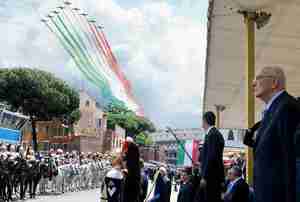 |
U.S. Vice President Joe Biden is among politicians from 80 countries in Rome, celebrating 150 years of Italy as a united nation. AP
According to North Korea's "global happiness index," North Korea is the second happiest country in the world. The happiest country in the world, according to the index, is China. Chosun
(Comments: For reader comments, questions and discussion,
see the 3-Jun-11 News -- Manhattan prosecutor subpoenas Goldman Sachs' records
thread of the Generational Dynamics forum. Comments may be
posted anonymously.)
(3-Jun-2011)
Permanent Link
Receive daily World View columns by e-mail
Donate to Generational Dynamics via PayPal
Defense Secretary Robert Gates disagreed with Obama on Libya
The "siege of Misrata" that lasted for weeks appears to have ended, at least for now, after Gaddafi's forces were forced to withdraw, according to AP.
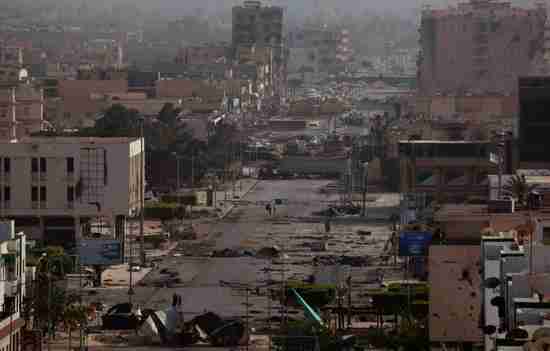 |
The epicenter of the siege had been Tripoli Street in downtown Misrata, Libya. It's now safe to down the street, as shown in the above picture, but during the siege Gaddafi's snipers killed civilians and bombed out buildings.
In the meantime, there's still no discernible objective for the "humanitarian" mission. The fighting in Libya, that President Obama promised would over within "days, not weeks," is far from over, after several months. The Nato "humanitarian" air war in Libya had been scheduled to expire on June 27.
But on Wednesday, Nato announced that it would extend the campaign for another three months, according to the Telegraph. According to a Nato official in Brussels:
"This decision sends a clear message to the Gaddafi regime. We are determined to continue our operation to protect the people of Libya. We will sustain our efforts to fulfil the United Nations mandate [to defend civilians from Gaddafi's forces]. We will keep up the pressure to see it through."
Is this for real? The only "clear message" that's being sent is that there is no clear message. It's just more of the same.
And the politicals game-playing in Washington is only going to increase. on Wednesday, GOP leaders in the House of Representatives postponed a floor vote on a resolution by left-wing Rep. Dennis Kucinich that "directs the president to remove the United States armed forces from Libya" within 15 days.
The vote was postponed because House Speaker John Boehner "is concerned that if this were to come to the floor now, it would pass," according to an aide quoted by Politico, since there are enough Republicans and Democrats opposed to the Libya war.
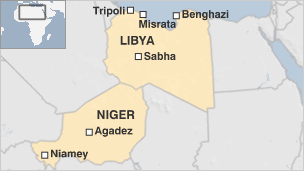 |
The war effort in Libya has been a mess since it started. First the US was leading the way. Then the US was going to turn the whole thing over to Nato. I understand that some 25% of the no-fly zone air flights are still American forces.
And the political situation at the international level is just as chaotic. Jacob Zuma, the jocular president of South Africa, went to spend a couple of days with this friend, Muammar Gaddafi, with the objective of negotiating a truce. To the surprise of no one (except perhaps Zuma), Zuma's proposes were thoroughly rejected by BOTH Gaddafi and the rebels, according to AP.
Russia has been doing all it can to add to the political chaos. As we've reported several times, Russia's objective has actually been promote a stalemate in Libya, so that Nato's forces are tied down, giving Russia's forces free hand to take on other projects in Central Asia. The Russians are demanding that all actions taken by Nato be approved by the U.N. Security Council, where Russia has a veto, giving Russian an effective veto over all Nato operations. The Russians feel free to pursue military operations without bothering to get a Security Council resolution.
An editorial in Lebanon's Daily Star begins as follows:
Show No Mercy "Despite numerous setbacks to his disgraced regime, Moammar Gadhafi continued Tuesday to display his trademark obliviousness toward reality, and with his people’s suffering unabated, it is time for the international community to take decisive action to get this criminal out of office – and Libya – as soon as possible."
It's pretty clear now that this is not going to happen.
There's no clear objective on the part of Nato, but Gaddafi's forces are following their own clear objective that they stated right at the beginning: They're going to fight until the last bullet.
A car bomb exploded outside an international hotel in Benghazi, Libya, destroying four cars, but causing only one injury. Tripoli Post
 |
Niger's city of Agadez has been transformed from a bustling trade hub in the middle of the Sahara desert into a refugee centre for the thousands of African migrants fleeing the violence in Libya. Some 65,000 migrants have made the dangerous trip to Agadez since the beginning of May. BBC
U.S. Defense Secretary Robert Gates said his biggest disagreement with President Barack Obama was over the decision to intervene in Libya, which he strongly opposed. "[One disagreement] in two-and-a-half years isn’t bad," he said.
He added: "I think one of the reasons it’s probably time for me to leave is that sometimes too much experience can get in the way, and you can get too cautious. It may … be making me more cautious that I ought to be." From the point of view of Generational Dynamics, that would indeed be a major difference between Gen-Xers and the Silent Generation. Politico
(Comments: For reader comments, questions and discussion,
see the 2-Jun-11 News -- Fighting continues in Libya, amid chaotic international politics
thread of the Generational Dynamics forum. Comments may be
posted anonymously.)
(2-Jun-2011)
Permanent Link
Receive daily World View columns by e-mail
Donate to Generational Dynamics via PayPal
Bad economic data hits stock market
This morning's key headlines from GenerationalDynamics.com.
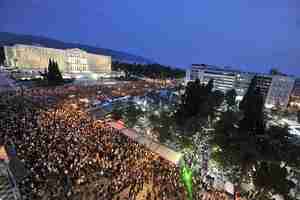 |
On Thursday, European officials will present a deal to release 12 billion euros to Greece on June 29. That's the date of the next scheduled tranche or installment of the 110 billion euro bailout worked out a year ago. The International Monetary Fund (IMF) had been indicating a refusal to pay its share of the tranche, because Greece had failed to meet any of its committed austerity objectives in the past year. Of particular importance was the commitment to lower Greece's debt sufficiently so that Greece could reenter the international bond markets next year, something that now seems impossible. The deal is not completely closed, however. It has to be approved unanimously by the eurozone's finance ministers, who have a meeting scheduled on June 20. Irish Times
Moody's Investor Service reduced Greece's credit rating again, by three notches, deep into junk territory, making it clear that that Greece would not stabilize its financial situation without defaulting. Reuters
A vigilante computer hacker group called "Anonymous" declared Wednesday that it's targeting the IMF website with a distributed denial of service (DDoS) attack, as punishment for forcing Greece to perform austerity measures in return for its 110 billion euro bailout. In a DDoS attack, thousands of computers simultaneously access the web site, so that it becomes unresponsive. "Anonymous" is the same group that called for DDoS attacks against Visa and Mastercard, after they withdrew services from Wikileaks. Anonymous has also targetd the Italian government, Iran and Egypt. AFP
A slew of disappointing economic reports is leading to worries that we're not going to have that "V-shaped recovery" after all. GM auto sales for May were down 1.2%, when experts had predicted they would be up 1.5%. Unemployment and manufacturing indicators were poor as well. If you put together news like this with the rapidly deteriorating financial situation in Europe and political situation in the Mideast, as well as the possibility that China's huge real estate bubble might finally burst, then there's definitely a feeling that history is speeding up toward something. Wall Street stocks fell over 2% on Wednesday. LATimes
Bahrain supposedly lifted the state of martial law on Wednesday, but it's had no effect on the actions of the security forces. Tanks and soldiers withdrew form the center of Manama, the capital city, but numerous police checkpoints remained around the city. Security forces used batons and tear gas to disperse any protests. Al-Jazeera
In an effort to manage the international criticism of the killing of Hamza Hamza al-Khateeb (see "1-Jun-11 News -- Mutilated teenage boy becomes symbol for Syria's revolution"), the government of Bashar al-Assad has vowed to investigate the incident. The government also promised amnesty for protesters. However, neither of these promises is considered credible by the protesters. The alleged mutilation of Hazma by Assad's security forces has galvanized the protesters, and triggered international condemnation of Assad. Globe and Mail
Facing defectors from his own party, the Democratic Party of Japan (DPJ), prime minister Naoto Kan will face a no-confidence vote on Thursday afternoon. Japan has had a parade of prime ministers in the last five years, as each one has been felled by a vote of no confidence. The principal themes have previously been a generational conflict between the aging war survivor generation and the nationalistic post-war generations, with issues arising out of the use of Korean and Chinese "comfort women" by Japan's armed forces during World War II. However, this time the problems appear to be different, and the main issue is competency in handling the Fukushima nuclear disaster. Japan Times
The deeply bitter clash between Iran's president Mahmoud Ahmadinejad and the supreme leader Ayatollah Ali Khamenei became even more bitter on Wednesday when the Iran's parliament voted 165-1 to sue Ahmadinejad for firing Iran's oil minister and naming himself as the replacement. From the point of view of Generational Dynamics, Iran is in a generational Awakening era, and is following a path similar to the political chaos in America in the 1960s, following the Summer of Love in 1967, and the decision of Lyndon Johnson not to run for reelection in 1968. Telegraph
(Comments: For reader comments, questions and discussion,
see the 2-Jun-11 News -- Fighting continues in Libya, amid chaotic international politics
thread of the Generational Dynamics forum. Comments may be
posted anonymously.)
(2-Jun-2011)
Permanent Link
Receive daily World View columns by e-mail
Donate to Generational Dynamics via PayPal
Hillary Clinton says this signals 'total collapse' of Syrian regime
A video showing Syrian security services torturing and killing a 13-year-boy named Hamza al-Khatib has galvanized the opposition and has become a symbol for Syria's revolution, according to the Guardian.
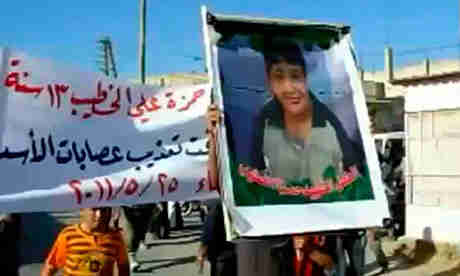 |
Hamza was picked up by security forces on 29 April. On May 27, his badly mutilated corpse was returned to his family, who were warned to keep silent. But instead of staying secret, the tortured and swollen body is appearing on a Youtube video. (Warning: This video is grossly sickening.)
U.S. Secretary of State Hillary Clinton's statement, quoted by Reuters, reflects an increasingly harsh position towards Syrian president Bashar al-Assad:
"I think what [Hamza's death] symbolizes for many Syrians is the total collapse of any effort by the Syrian government to work with and listen to their own people.Every day that goes by the position of the government becomes less tenable and the demands of the Syrian people for change only grow stronger.
President Assad has a choice, and every day that goes by the choice is made by default. He has not called an end to the violence against his own people, and he has not engaged seriously in any kind of reform efforts."
 |
During the Iran uprisings in 2009, a pretty, young girl named Neda Agha-Soltan was shot dead in the streets by security forces, and the entire incident was captured in a graphic youtube video. Neda became an international symbol of Iran's opposition, and opposition forces in Syria hope that Hamza's mutiliation and death will accomplish the same thing for them.
(Comments: For reader comments, questions and discussion,
see the 1-Jun-11 News -- Mutilated teenage boy becomes symbol for Syria's revolution
thread of the Generational Dynamics forum. Comments may be
posted anonymously.)
(1-Jun-2011)
Permanent Link
Receive daily World View columns by e-mail
Donate to Generational Dynamics via PayPal
Israel faces new aid flotilla from Turkey to Gaza
This morning's key headlines from GenerationalDynamics.com.
 |
Ratko Mladic was extradited to the UN war crimes tribunal in The Hague on Tuesday, to face charges of genocide and war crimes, after a court rejected his legal challenge. However, he was permitted to make a brief side trip to visit his daughter's grave. His daughter committed suicide in 1994 with her father's prized regimental honors pistol when she learned of the atrocities that her father was committing at that time in the Bosnian war. Telegraph
A major new confrontation is developing at the end of June, when a new aid flotilla will be leaving Turkey for Gaza. Israel says that it will continue to use the military to enforce its economic embargo of Gaza. This is near the first anniversary of last year's flotilla, when clashes between the flotilla and Israel's army resulted in nine deaths. VOA
A routine plane trip by German Chancellor Angela Merkel to Afghanistan was forced to circle over Turkey for two hours on Tuesday morning, when Iran refused to give the plane permission to enter Iranian air space. German Foreign Minister Guido Westerwelle summoned the Iranian ambassador in Berlin and made clear to him that "such a breach of international protocol against Germany would absolutely not be accepted." Spiegel
The Pentagon has concluded that computer sabotage coming from another country can constitute an act of war, a finding that for the first time opens the door for the U.S. to respond using traditional military force. Wall Street Journal (Access)
(Comments: For reader comments, questions and discussion,
see the 1-Jun-11 News -- Mutilated teenage boy becomes symbol for Syria's revolution
thread of the Generational Dynamics forum. Comments may be
posted anonymously.)
(1-Jun-2011)
Permanent Link
Receive daily World View columns by e-mail
Donate to Generational Dynamics via PayPal
Web Log Summary - 2016
Web Log Summary - 2015
Web Log Summary - 2014
Web Log Summary - 2013
Web Log Summary - 2012
Web Log Summary - 2011
Web Log Summary - 2010
Web Log Summary - 2009
Web Log Summary - 2008
Web Log Summary - 2007
Web Log Summary - 2006
Web Log Summary - 2005
Web Log Summary - 2004
Web Log - December, 2016
Web Log - November, 2016
Web Log - October, 2016
Web Log - September, 2016
Web Log - August, 2016
Web Log - July, 2016
Web Log - June, 2016
Web Log - May, 2016
Web Log - April, 2016
Web Log - March, 2016
Web Log - February, 2016
Web Log - January, 2016
Web Log - December, 2015
Web Log - November, 2015
Web Log - October, 2015
Web Log - September, 2015
Web Log - August, 2015
Web Log - July, 2015
Web Log - June, 2015
Web Log - May, 2015
Web Log - April, 2015
Web Log - March, 2015
Web Log - February, 2015
Web Log - January, 2015
Web Log - December, 2014
Web Log - November, 2014
Web Log - October, 2014
Web Log - September, 2014
Web Log - August, 2014
Web Log - July, 2014
Web Log - June, 2014
Web Log - May, 2014
Web Log - April, 2014
Web Log - March, 2014
Web Log - February, 2014
Web Log - January, 2014
Web Log - December, 2013
Web Log - November, 2013
Web Log - October, 2013
Web Log - September, 2013
Web Log - August, 2013
Web Log - July, 2013
Web Log - June, 2013
Web Log - May, 2013
Web Log - April, 2013
Web Log - March, 2013
Web Log - February, 2013
Web Log - January, 2013
Web Log - December, 2012
Web Log - November, 2012
Web Log - October, 2012
Web Log - September, 2012
Web Log - August, 2012
Web Log - July, 2012
Web Log - June, 2012
Web Log - May, 2012
Web Log - April, 2012
Web Log - March, 2012
Web Log - February, 2012
Web Log - January, 2012
Web Log - December, 2011
Web Log - November, 2011
Web Log - October, 2011
Web Log - September, 2011
Web Log - August, 2011
Web Log - July, 2011
Web Log - June, 2011
Web Log - May, 2011
Web Log - April, 2011
Web Log - March, 2011
Web Log - February, 2011
Web Log - January, 2011
Web Log - December, 2010
Web Log - November, 2010
Web Log - October, 2010
Web Log - September, 2010
Web Log - August, 2010
Web Log - July, 2010
Web Log - June, 2010
Web Log - May, 2010
Web Log - April, 2010
Web Log - March, 2010
Web Log - February, 2010
Web Log - January, 2010
Web Log - December, 2009
Web Log - November, 2009
Web Log - October, 2009
Web Log - September, 2009
Web Log - August, 2009
Web Log - July, 2009
Web Log - June, 2009
Web Log - May, 2009
Web Log - April, 2009
Web Log - March, 2009
Web Log - February, 2009
Web Log - January, 2009
Web Log - December, 2008
Web Log - November, 2008
Web Log - October, 2008
Web Log - September, 2008
Web Log - August, 2008
Web Log - July, 2008
Web Log - June, 2008
Web Log - May, 2008
Web Log - April, 2008
Web Log - March, 2008
Web Log - February, 2008
Web Log - January, 2008
Web Log - December, 2007
Web Log - November, 2007
Web Log - October, 2007
Web Log - September, 2007
Web Log - August, 2007
Web Log - July, 2007
Web Log - June, 2007
Web Log - May, 2007
Web Log - April, 2007
Web Log - March, 2007
Web Log - February, 2007
Web Log - January, 2007
Web Log - December, 2006
Web Log - November, 2006
Web Log - October, 2006
Web Log - September, 2006
Web Log - August, 2006
Web Log - July, 2006
Web Log - June, 2006
Web Log - May, 2006
Web Log - April, 2006
Web Log - March, 2006
Web Log - February, 2006
Web Log - January, 2006
Web Log - December, 2005
Web Log - November, 2005
Web Log - October, 2005
Web Log - September, 2005
Web Log - August, 2005
Web Log - July, 2005
Web Log - June, 2005
Web Log - May, 2005
Web Log - April, 2005
Web Log - March, 2005
Web Log - February, 2005
Web Log - January, 2005
Web Log - December, 2004
Web Log - November, 2004
Web Log - October, 2004
Web Log - September, 2004
Web Log - August, 2004
Web Log - July, 2004
Web Log - June, 2004